#.but that's just the inciting incident for the first part of the story
Explore tagged Tumblr posts
Text
How About Breakfast in Bed?
Masterpost
This is my fist fanfic EVER sorry if its bad lol
I basically stole the entire idea for the inciting incident from a fanfic by Renee4567. Give it a read! here's the link:
Phantom's Hope
─ ✧ ─ ✧- ☽ -✧ ─ ✧ ─
Part 1: Tired
Danny was so incredibly tired. The alarm blaring in his ears was giving him a piercing headache. Why did he even have to wake up? He reached to turn the damned thing off before his head exploded. His limbs ached and felt so incredibly heavy, he didn’t want to get out of bed. What was the point when it was just going to be the same as yesterday? He turned his head to look at the same grey walls he looked at every morning. He needed to clean his room but couldn’t find the energy. There were dirty cups everywhere that he hadn’t bothered to take back down to the kitchen. His clothes were in a scattered mess on the floor along with other junk. His homework was littered across his desk and room. None of it was complete. Why even bother doing it?
“DANNY!” his mom was calling him from downstairs.
“COME DOWN FOR BREAKFAST!”
He didn’t want to go. He wanted to skip breakfast, skip school, skip being shoved into his locker, and skip fighting ghosts. He just wanted to stay in bed and sleep the rest of his life away. He knew he had to leave the safety and comfort of his bed eventually. No matter how badly he didn’t want to. He dragged himself out from his warm, soft blankets and rifled through one of the shirt igloos on his floor for his binder. Getting dressed was the first step to the day ahead, so he dreaded it.
He gazed into the mirror, taking his reflection in. His hair was messy and slightly overgrown. His clothes were two sizes too big with the pants fraying at the bottoms. His under eyes were dark, accurately reflecting his tiredness. He wore long sleeves under his shirt to hide the constant injuries he got from ghost fighting. He looked like a mess, but he didn’t care enough to do anything about it.
He made himself go down the stairs and sit at the table. The food in front of him looked ok. He didn’t really have much of an appetite right now, but he knew he would suffer later if he didn’t eat right now. He wanted so badly to just go back upstairs and get back in bed. Instead, he looked around the kitchen and spotted the simplest thing to grab. A bagel.
“How did you sleep sweetheart?” his mom startled him with her question.
“I slept fine.” he mumbled the words through his bites. The bread was dry and cold, but he didn’t feel like warming it up or anything. It was a miserable meal.
“I’m still really tired though” as he said it, he looked up to see his mom already in a full on conversation with his dad about an ‘amazing idea’ to catch Phantom that she’d had. Great. Now he’d have to deal with that too. He didn’t even know why he bothered saying anything. Since Jazz left for college, this is basically how every morning went.
It was a typical day, getting shoved in a locker by dash, getting yelled at by his teachers, saving the school from another ghost, and trying not to notice how Sam and Tucker pointedly ignored him. They liked him before, hell, the teachers liked him before, but since Phantom, his grades have been dropping, his schedule’s been full. He’s learned pretty quickly that teachers only liked him if he had good grades, and his friends only liked him when he had time to actually be their friend without putting them in harm's way. So at school, he tried his best to stay out of his own head. Most of the time, that meant being on his phone. Even outside of school he was on his phone, it helped him not think so much. There were funny things that actually made him laugh. There was news that he wasn’t directly involved in. He liked to look at what the Justice League got up to, it made him feel a bit better about his decision to help.
He was laying in his bed like usual, this time he was looking through people’s instagram stories. They were all pretty boring until one caught his eye. It was about the Justice League. It said that they were coming to Amity? He wondered why they would come to a random county in Pennsylvania, so he looked up what it was referencing.
What. He sat straight up reading the JL’s official statement.
“We will be visiting Amity Park to investigate ‘Phantom’ as there have been multiple reports that the creature may be a potential harm to the residents.”
They were coming to investigate Phantom. Why did they need to investigate him? They should be able to tell that he’s trying to help. Those reports saying he’s a threat aren't true. He’s a hero just like them. He’s just… trying his best to help.
Well. There’s not really much he can do. He’ll just have to hope that they see past the reports. There’s no way he can handle dealing with THE Justice League on top of everything else.
─ ✧ ─
When the Justice League came, Phantom was busy. Way more busy than normal. He’d hoped to be able to catch them. If not to convince them he’s not actually evil, then to just get to see his heroes in person, but Vlad must’ve let out a ton of ghosts in hopes he wouldn’t catch a glance. So he was stuck fighting ghosts while people were telling the Justice League how much of a menace he is. They were recounting tales of how him causing property damage, injuries, and striking fear into the hearts of the innocent. All while he was fighting ghosts and trying his best to keep their town safe.
It wasn’t helping that he had the Ghost Investigation Ward and his parents hot on his tail trying to capture him. They shot their ecto-rays right at him, even managing to hit him every once in a while. It’s like they weren’t even trying to get the other ghosts anymore, it was just him. Luckily, he was able to get most of the ghosts fairly quickly and without major injury. He was almost done capturing them all then he’d be done. Luckily the box ghost was the only one left, and he had an easy time putting him into the thermos. As he secured the thermos’s latch, he was relieved to be done. Now he just had to return them all back to the ghost zone-
There was a sudden shooting pain in his shoulder. He fell to the ground and his vision was going spotty. He pressed his hand to where it hurt and braced himself on the ground, breathing heavily. His arm was stinging with pain and could hear his heartbeat in his head. What had happened? He pulled his hand from his arm to look at it as his vision came back. It was covered in ectoplasm. Where’d that come from? He heard people yelling behind him, but couldn’t make out their words. There was another pain, this time it was more of a knick in his calf. He looked behind him to see where this all was coming from and there was his parents. He looked back at his hand as he realized, this was his ectoplasm. He was bleeding. He was bleeding really badly. His parents were getting closer, they looked like they were ready to shoot again. His head was pounding, he had to leave quickly. He pulled himself to his feet, and started to haul ass. He was tired, so he wasn’t moving fast enough to outrun them, but he was moving. He just needed to go invisible and intangible and he could escape them.
He’d finally lost his parents, so he floated his way back into his room and collapsed. As he fell to the ground, his ghost form fell with him. He took a few breaths, clutching the fenton thermos to his chest, thankful that he hadn’t lost it when he was shot. He took another second to himself before examining his injury. His wound was deep and if he didn’t patch it up soon, he’d bleed out. When did ghost tech get so painful? He took out the med kid Jazz had made for him. She always thought ahead. When she first suggested it, he’d said no, thinking he wouldn’t need it. But in times like this, he was glad she cared enough to threaten him into listening to her advice. He couldn’t do stitches or anything, but with his ghost healing, it would be ok if he managed to hold his wound together. After disinfecting the gash on his shoulder, he pinched it together and secured it closed with band-aids. He’d been pretty sure he’d seen something like that in a doctor’s video or something? Whatever. He’d finished bandaging his worst wounds when he heard a commotion outside. He slowly peeked out his window to try and see what was happening. To his surprise, there was the Justice League. They’d been trying to interview people but it looks like it turned into a meet-and-greet of sorts. He’d thought they would’ve left by now, but they were answering questions and signing autographs. Maybe he could still talk to them. He pulled on a shirt that hid his worst injuries and headed outside, not realizing he was still holding the thermos.
─ ✧- ☽ -✧ ─
This was going on far longer than it should’ve. Bruce knew it was a bad idea to all come here, let alone announce it. Now they were being swarmed by people who wanted autographs or to ask them pointless questions. It was all getting out of hand. He knew that they should’ve gone undercover. If this Phantom is a threat, why let it know they’re coming? Batman wasn’t engaging with the crowd like the others were. He was here to help people, not be a celebrity. The crowd was a mix of people, but they were all here for different reasons. Some were just gathered to meet them. Some were complaining about the ‘ghosts’ that apparently haunt this town. As he scanned the crowd, his attention caught on a teenager approaching the group. He didn’t quite hold the same energy as the rest of them. Where other teens were enthusiastic and happy, he was hesitant, almost scared. But there was a glimmer of hope there. It was a strange mix. He was a skinny kid with black hair and blue eyes. Probably around 15 years old. He was wearing a short sleeved shirt that exposed the scrapes and bandages running along his arms. He looked tired, and he had a slight limp to his walk. In his hand he was clutching what looked like a thermos. The grip was tight, but the strangely high tech object looked comfortable in his hands. The boy opened his mouth, about to say something before he was interrupted.
“ARE YOU GOING TO CATCH PHANTOM?!” The question came from the other side of the crowd.
They hadn’t been able to gather any real information on Phantom. Most of the people here simply didn’t like the ghoul. They had no evidence that the creature had any malintent at all.
Before Batman could answer, Superman replied to the question with a reassuring smile,
“We’ll do our best.”
Why would he answer without discussing it first? They were going to have to have another meeting about this.
With Superman’s reply, the crowd around them began to cheer. There was only one among them who didn’t. The beat-up teenager he’d been observing. He looked stunned, broken even. He looked like they had just killed all of his hopes and dreams.
─ ✧- ☽ -✧ ─
Danny felt like he was going to barf. Superman had really just said that they would capture him? They believed he was a threat? No. No no no no he couldn’t accept this was happening. There must be some mistake. He looks at the heroes, trying to find anything. They’re joking, they have to be. They can’t seriously believe he’s bad, right? He searches their faces trying to find any hint that he had heard them wrong, that they’re faking it, anything. He’s been trying his best, they can’t think he’s evil. They can’t. He searches each of their smiling faces and he doesn’t see any sign that what they said was anything but the truth.
They want to capture him too.
Danny feels his world crumble as he loses all of the little hope he’d had. He began to give up. What was the point? Why even bother doing this? It was volunteer work that only ever left him injured and friendless. He looked down at the thermos in his hand. The smooth metal in his hand felt so familiar. He’d worked so hard to keep these ghosts from hurting people. He’d given his blood to keep this town safe. They still hated him. He was just a highschooler who was hurt and tired and just wanted to go to bed. Yet they still hunted him. How had he ended up like this? He used to do well in school and have friends and not feel like shit all the fucking time. He used to want to live. Now he was just wishing he could go back to before he half-died. He wanted his friends back, but they all hated him now. They didn’t hate him at first, but Sam got tired of making excuses for him and constantly helping him fight ghosts. Tucker was more or less the same. They’d left him. They didn’t want to fight ghosts. They’d realized what he hadn’t. The pointlessness of his mission. All that came of him ‘being a hero’ was him getting hurt. He was in so much pain he could barely move right now. So far he’d been able to avoid the GIW and his parents and Val, but… could he avoid the Justice League?
‘We’ll do our best.’ Superman’s words were echoing in his head. If they caught him, what would they do with him? Torture him? Kill him? He could feel his emotions bubbling up in his core. He was scared, but he felt a little more free. He wasn’t going to protect a town that didn’t want him anymore. Why had he been doing it for so long? To think that he’d fought for them, bled for them.
He laughs. It’s a hollow laugh. The crowd looked at him like he was crazy. Some people started backing away in disgust. On second thought, he didn’t think it was that funny. He was in so much pain and none of them cared. He found he was still staring at the thermos he held firmly in his hand. It was the thing he’d used over and over and over again to save the people who were now praying for his downfall.
“I guess I’m really not wanted here.” he said it quietly, almost a whisper, but it was still heard. He could feel his fangs peeking out from under his lips and his hair start to float as he started to lose control over his form. The sky, that was just moments before sunny and clear, was now dark and stormy. He tightened his hand on the thermos and before he’d even realized it, he pressed the button to release the ghosts. They were yelling and announcing themselves until they noticed Danny, stewing in his emotions. He stared up at the ghosts puzzling them out in his brain. He was so angry, and sad, and so many things he couldn’t sort it all.
“Oh shit” he recognized it as Ember’s voice.
“This seems like a bad time” This one was skulker.
Soon, all the ghosts fled, citing Danny as the reason.
He stared blankly at the now empty thermos.
“I just… tried to help” his voice breaks as he says it. Tears formed at the edges of his eyes, but they don’t fall quite yet. Something shifted in Batman as he looked at Danny, picking his every movement apart. The rain started falling and soon you could see his red blood seeping through his bandages and his shirt, exposed by the sudden water that was now soaking him. It gave his hair and clothing back the weight that it had so recently lost. Batman took a gentle step towards Danny. He looked up at Batman, searching for something that told him that the man didn’t hate him. He found nothing. His mouth was a careful, neutral expression. The rest of his face was covered by an expressionless cowl, so he found comfort in looking at the rough pavement instead. He wished so badly to not be here. He ached for the comfort of his bed.
“I’m just so tired.” as the words fell from his lips, he began crying. He couldn’t help it, just as he couldn’t stop himself from falling to his knees and transforming into Phantom. He heard a few gasps from the crowd that had backed far enough away to stay out of danger but still watch. His wound had reopened and it was bleeding again. He hated being so exposed and vulnerable. He was a spectacle for them all to gawk at. But he didn’t have the energy to hide anymore, so he simply sat there. Slowly, Batman swooped down towards him. Danny flinched, prepared for the worst. Instead of pain, or an attack, he felt warm, strong arms around him. He looked up and Batman, the vengeance of Gotham, had taken him into his warm cape.
“You did a good job” the deep voice that came from Batman wasn’t as cold as Danny had been expecting. His voice was compassionate and gentle. Before he had even realized it himself, Danny was sobbing uncontrollably into the rough fabric of the costume.
It was a while before he lost all energy and stopped crying.
“I can’t do this anymore.” his voice was quiet and he still clung to the cape as he said it.
“That’s alright.” Batman’s voice was reassuring.
“Did I…” he paused. Ancients, he was tired. “Did I really do alright?” He was looking at the cloudy sky when he said it. Wishing he could see the stars.
BEEP BEEP BEEP! He gasped for air and sat up straight as his alarm clock pulled him from his sleep. Oh. It was a dream.
─ ✧ ─ ✧- ☽ -✧ ─ ✧ ─
This is just the first chapter! I promise it will get less angsty. Trust
Edit: I forgot to mention, danny's like 17 in this, he just looks younger (being trans'll do that to ya)
#dp x dc#dc x dp#dpxdc#dcxdp#dp x dc crossover#batman#danny phantom#danny in gotham#danny fenton#angst#danny needs a hug (he gets one)#danny has depression :(#also danny's trans cuz i said so#but that won't be a big part of this story#i want this to eventually be a danny gets adopted type-thing?#superman just trying to comfort ppl btw#hes not actually a huge asshole#just a lil dumb#i dont have an ao3 account yet#but when i get one I'll post this on there
500 notes
·
View notes
Text
Creating Compelling Character Arcs: A Guide for Fiction Writers
As writers, one of our most important jobs is to craft characters that feel fully realized and three-dimensional. Great characters aren't just names on a page — they're complex beings with arcs that take them on profound journeys of change and growth. A compelling character arc can make the difference between a forgettable story and one that sticks with readers long after they've turned the final page.
Today, I'm going to walk you through the art of crafting character arcs that are as rich and multi-layered as the people you encounter in real life. Whether you're a first-time novelist or a seasoned storyteller, this guide will give you the tools to create character journeys that are equal parts meaningful and unforgettable.
What Is a Character Arc?
Before we go any further, let's make sure we're all on the same page about what a character arc actually is. In the most basic sense, a character arc refers to the internal journey a character undergoes over the course of a story. It's the path they travel, the obstacles they face, and the ways in which their beliefs, mindsets, and core selves evolve through the events of the narrative.
A character arc isn't just about what happens to a character on the outside. Sure, external conflict and plot developments play a major role — but the real meat of a character arc lies in how those external forces shape the character's internal landscape. Do their ideals get shattered? Is their worldview permanently altered? Do they have to confront harsh truths about themselves in order to grow?
The most resonant character arcs dig deep into these universal human experiences of struggle, self-discovery, and change. They mirror the journeys we all go through in our own lives, making characters feel powerfully relatable even in the most imaginative settings.
The Anatomy of an Effective Character Arc
Now that we understand what character arcs are, how do we actually construct one that feels authentic and impactful? Let's break down the key components:
The Inciting Incident
Every great character arc begins with a spark — something that disrupts the status quo of the character's life and sets them on an unexpected path. This inciting incident can take countless forms, be it the death of a loved one, a sudden loss of power or status, an epic betrayal, or a long-held dream finally becoming attainable.
Whatever shape it takes, the inciting incident needs to really shake the character's foundations and push them in a direction they wouldn't have gone otherwise. It opens up new struggles, questions, and internal conflicts that they'll have to grapple with over the course of the story.
Lies They Believe
Tied closely to the inciting incident are the core lies or limiting beliefs that have been holding your character back. Perhaps they've internalized society's body image expectations and believe they're unlovable. Maybe they grew up in poverty and are convinced that they'll never be able to escape that cyclical struggle.
Whatever these lies are, they'll inform how your character reacts and responds to the inciting incident. Their ingrained perceptions about themselves and the world will directly color their choices and emotional journeys — and the more visceral and specific these lies feel, the more compelling opportunities for growth your character will have.
The Struggle
With the stage set by the inciting incident and their deeply-held lies exposed, your character will then have to navigate a profound inner struggle that stems from this setup. This is where the real meat of the character arc takes place as they encounter obstacles, crises of faith, moral dilemmas, and other pivotal moments that start to reshape their core sense of self.
Importantly, this struggle shouldn't be a straight line from Point A to Point B. Just like in real life, people tend to take a messy, non-linear path when it comes to overcoming their limiting mindsets. They'll make progress, backslide into old habits, gain new awareness, then repeat the cycle. Mirroring this meandering but ever-deepening evolution is what makes a character arc feel authentic and relatable.
Moments of Truth
As your character wrestles with their internal demons and existential questions, you'll want to include potent Moments of Truth that shake them to their core. These are the climactic instances where they're forced to finally confront the lies they believe head-on. It could be a painful conversation that shatters their perception of someone they trusted. Or perhaps they realize the fatal flaw in their own logic after hitting a point of no return.
These Moments of Truth pack a visceral punch that catalyzes profound realizations within your character. They're the litmus tests where your protagonist either rises to the occasion and starts radically changing their mindset — or they fail, downing further into delusion or avoiding the insights they need to undergo a full transformation.
The Resolution
After enduring the long, tangled journey of their character arc, your protagonist will ideally arrive at a resolution that feels deeply cathartic and well-earned. This is where all of their struggle pays off and we see them evolve into a fundamentally different version of themselves, leaving their old limiting beliefs behind.
A successfully crafted resolution in a character arc shouldn't just arrive out of nowhere — it should feel completely organic based on everything they've experienced over the course of their thematic journey. We should be able to look back and see how all of the challenges they surmounted ultimately reshaped their perspective and led them to this new awakening. And while not every character needs to find total fulfillment, for an arc to feel truly complete, there needs to be a definitive sense that their internal struggle has reached a meaningful culmination.
Tips for Crafting Resonant Character Arcs
I know that was a lot of ground to cover, so let's recap a few key pointers to keep in mind as you start mapping out your own character's trajectories:
Get Specific With Backstory
To build a robust character arc, a deep understanding of your protagonist's backstory and psychology is indispensable. What childhood wounds do they carry? What belief systems were instilled in them from a young age? The more thoroughly you flesh out their history and inner workings, the more natural their arc will feel.
Strive For Nuance
One of the biggest pitfalls to avoid with character arcs is resorting to oversimplified clichés or unrealistic "redemption" stories. People are endlessly complex — your character's evolution should reflect that intricate messiness and nuance to feel grounded. Embrace moral grays, contradictions, and partial awakenings that upend expectations.
Make the External Match the Internal
While a character arc hinges on interior experiences, it's also crucial that the external plot events actively play a role in driving this inner journey. The inciting incident, the obstacles they face, the climactic Moments of Truth — all of these exterior occurrences should serve as narrative engines that force your character to continually reckon with themselves.
Dig Into Your Own Experiences
Finally, the best way to instill true authenticity into your character arcs is to draw deeply from the personal transformations you've gone through yourself. We all carry with us the scars, growth, and shattered illusions of our real-life arcs — use that raw honesty as fertile soil to birth characters whose journeys will resonate on a soulful level.
Happy Writing!
#writing#writeblr#thewriteadviceforwriters#creative writing#on writing#writers block#writing tips#how to write#writers and poets#writers on tumblr#authors on tumblr#author#historical fiction#fiction#novel#publishing#short stories#short story#character arcs
768 notes
·
View notes
Text
Soooo I read all of Dungeon Meshi in this past week and I have many thoughts bouncing around in my brain and I think the only thing to do with them is some AGGRESSIVELY CLOSE READING of a scene I wanted to come back to and try to understand better.
So: I want to talk about chapter 28
This entire section of the story is something I feel like I am going to want to come back to a lot, because its such a transitional time and I feel like there are a lot of themes/ideas that I wasn't fully aware of during my first reading, and stuff I missed because of that.
One of the biggest things I have been turning over in my head is... hey, what was UP with the Marcille/Falin bath scene? Maybe it was because I was already primed to pay attention to stuff with them going into the story, or because I had already seen a couple of panels out of context. In any case, it really kind of stuck out to me as being very short but also VERY intense, while also being... hard for me to define? Some part of the nature of the intensity felt like it was going over my head.
I wasn't sure that revisiting it would help with this right away, but to my surprise, it actually WAS a lot easier for me to follow and understand when I went back to it. So I want to just do a close reading of That Scene and some other parts of the chapter & context around it all, because I think it offers insight into Falin & her relationships, and what purpose this chapter serves within the story as a whole.
So first of all, I think it's interesting that the scene starts with Marcille bathing Falin.
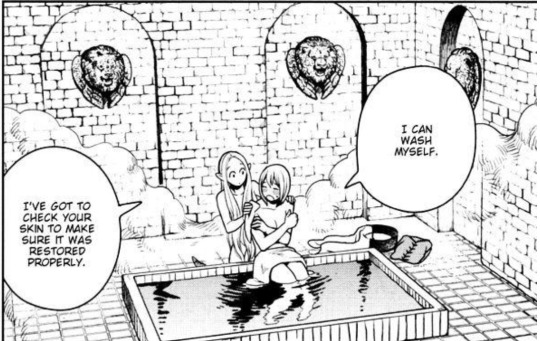
It feels very caring in a more platonic, less charged way then what will follow.
Marcille goes from this caretaker mode to joining Falin in the bath, and then of course we get the first of The Panels
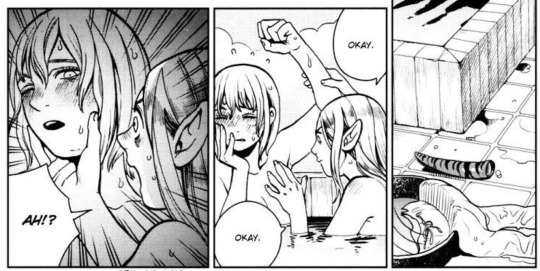
(as a small note, I only noticed when revisiting that Marcille is using the rest of her Kelpie soap in the bath. Isn't that just the most heartwrenching little detail. Augh)
Anyway, one of the first things I thought was interesting going back to this is how much it reminded me of the very different sort of intimacy that came just before it - when Laios and Marcille assembled Falin's bones.
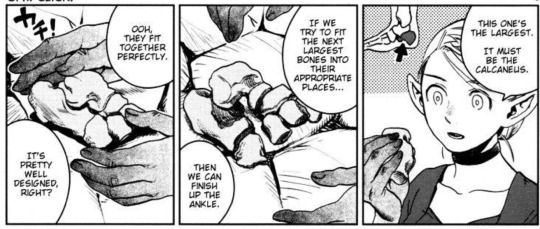
This is such a beautiful and intimate sequence, and something about Marcille examining Falin, whole, after the fact... I can't imagine there are not some echoes of those bones in Marcille's mind. The action seems more startling/intense for Falin at first, and maybe part of that is because Marcille has already experienced this level of intimacy with Falin's body in a way Falin herself wasn't a part of.
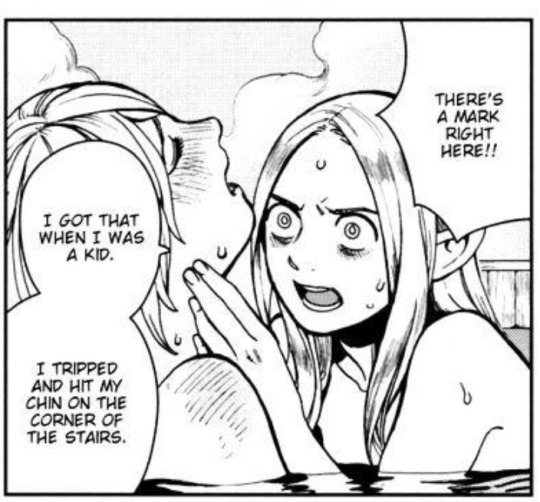
This panel in particular I think is a summation of the difference in the experience for them. This looks like... near orgasmic for Falin tbh, and Marcille is very focused on the actual like practical part of what she's doing, seemingly completely unaware of the Effect she is having on Falin.
The whole short sequence is focused on this intimacy that Marcille initiated seemingly without fully being aware of what she was actually doing. And once Marcille is satisfied, she is also the one that ends it, sitting back in the bath and moving out of Falin's proximity. All on her own terms, and for her own ends.
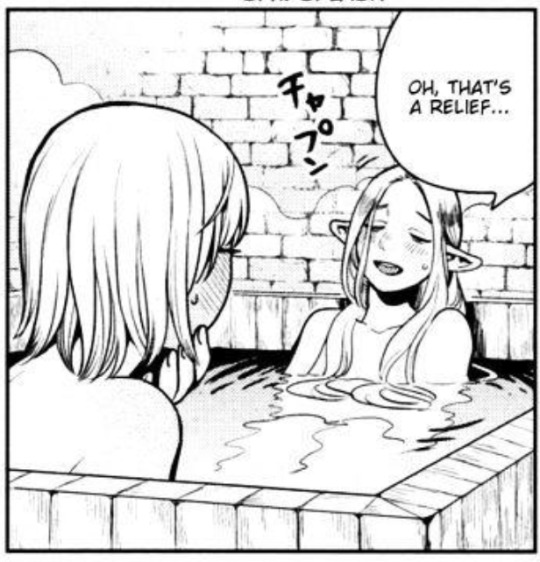
HOWEVER... Falin doesn't just let things go.
Instead, she returns Marcille's attention. First, by asking after her wellbeing:
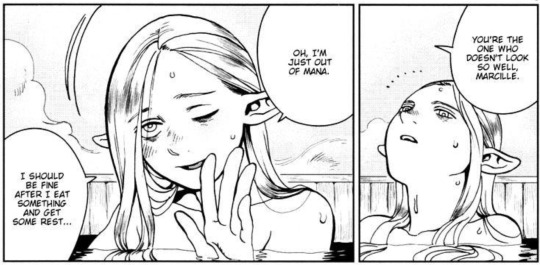
Marcille, of course, deflects (there will be a lot of that in this scene).
But Falin doesn't let it go.
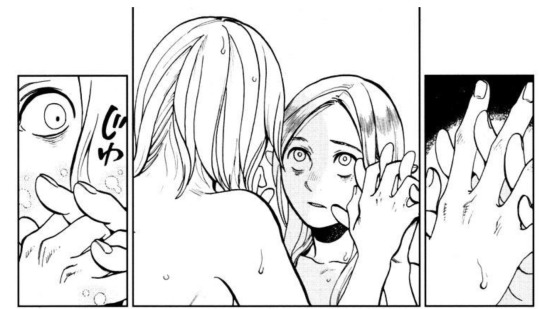
Falin is not a confrontational person. She likes to keep the peace. In this context, and in context of the way that Marcille was the one to come into Falin's space initially, the way that Marcille controlled the initial intimacy... this is striking. I genuinely think that these three panels might convey one of the most assertive actions Falin (as herself) takes in the entire story. One of the only things that outdoes it is the fucking INCITING INCIDENT OF THE WHOLE STORY.
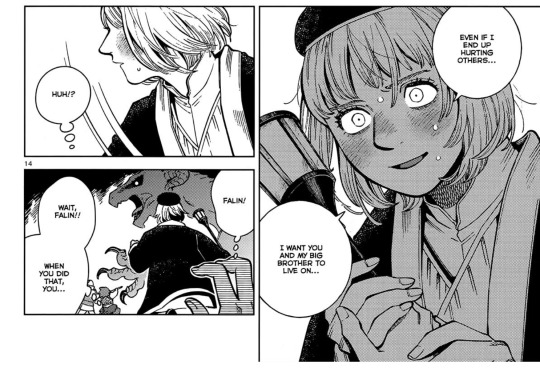
I'd also like to point out here that this action of Falin's also parallels her resurrection by Marcille & Laios. It's is also a forbidden magical action done to save someone(s) she loves, and its something she does TO them, that they are not fully aware/able to react to until its done.
Anyway, back to the bath scene. Falin is taking action here and asserting herself. And how does Marcille react?
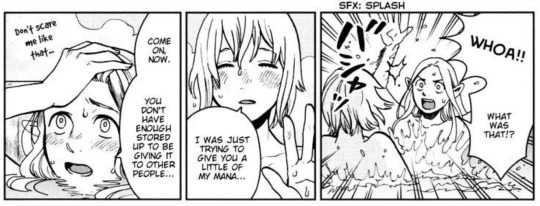
She flips out!! She rejects it! She tells Falin that she isn't supposed to be acting like that.
It's a very distancing response from Marcille, and also one that puts her back in that caretaker mode from the start of the scene. She also puts even more distance between herself and Falin by sinking into the water.
Falin doesn't give up though! She continues to assert herself. She's okay, she is allowed to chose to do this.
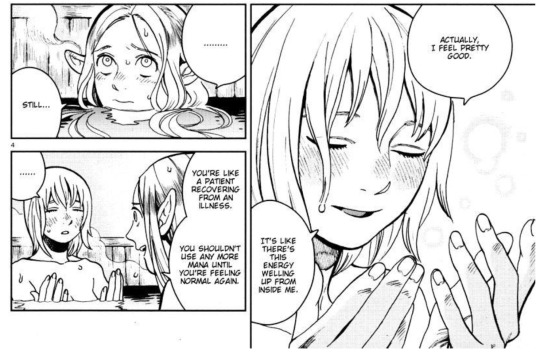
And Marcille continues to push her away. It looks to me like she only starts to relax a little once she fits Falin into a role she can better define and control. You're a patient, you're recovering, I understand this fact and you don't. Let me take care of you.
But, for a third time, Falin pushes back.

I don't think it’s coincidence that this is where she opens her eyes. She asks directly about the thing that they have both been dancing around:

The resurrection spell. The fact that Falin KNOWS about this, at least in part, recontextualizes the quiet battle for control between the two them. They both know at least some part of the truth. Marcille wants nothing else then to ignore it. Falin wants to be able to talk about it. Marcille's blatant refusal to give her those answers, I think, is what keeps them out of sync - intimate only ever in one direction at a time, never fully together.
And of course, even when directly confronted, Marcille refuses to engage with the truth.
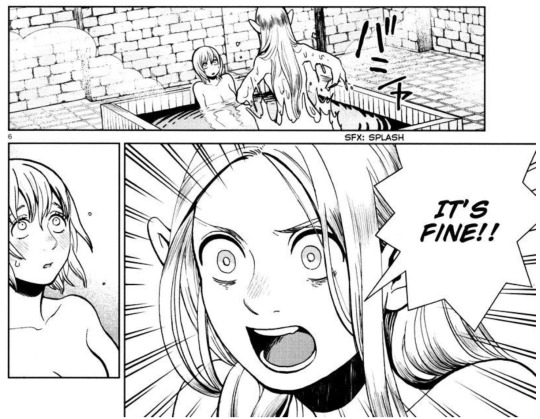
This moment being on the bottom of the page is notable too. There's a beat here. The last panel holds on Falin's face. The reader reaches the bottom of the page, and they are held here for a beat as well, with Falin. It's not quite a rejection yet. What Marcille says isn't directly an answer to Falin's question, but it is a response. A valid one, even! Falin wasn't just asking the question after all, but struggling with guilt that Marcille has every reason to want to reject.
But then you move on the next page, and...
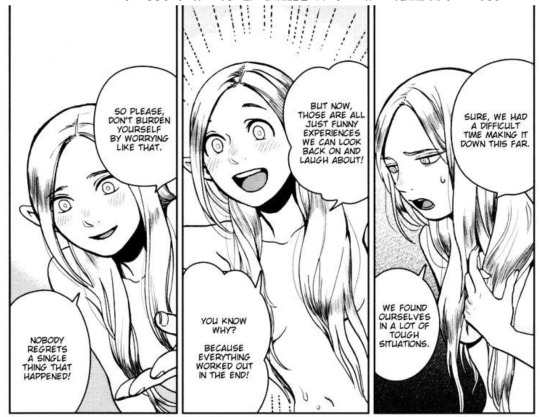
Marcille isn't actually addressing the question at all, not directly. She's deflecting, again. Oh we had a ~difficult time~, there were a lot of "tough situations." Even though she and Falin both know about the resurrection, and Falin has made it clear that she wants to talk about it, Marcille pushes away from the actual topic. She keeps things broad and indirect.
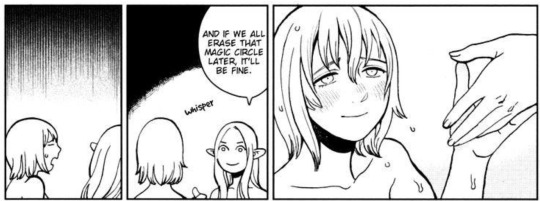
She offers the smallest gesture to Falin - nothing more than a whisper of 'don't worry about it I won't get in trouble' (even though Falin's concern was never just about Marcille getting in trouble).
Marcille then continues to deflect even further, completely changing the subject onto clothes and frog adventures, which seems to distract Falin as well, as she finally gives up on pushing.

And that's where the scene ends! Marcille pushes into Falin's space (without fully realizing), and Falin pushes back. She tries three times to get Marcille to acknowledge her wants, and three times Marcille rejects her, though she does eventually convey some truth. She is honest in her belief that Falin doesn't need to feel guilty, and that things will all work out, even as she continues to deflect the rest of the question. Falin finally accepts that, the topic of conversation changes, and we move on.
But there is a little bit more that happens between them. Towards the end of the chapter, they have this little 'oh no we have to share a bed' situation. Classic stuff.
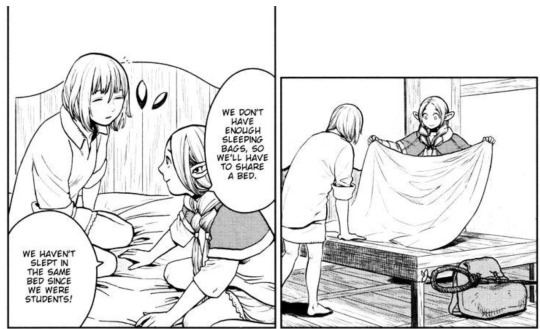
And Falin seems to realize that the context of this is kinda different now then it was when they were in the magic academy. She's not a kid any more, and they just had those intimate moments in the bath. There's a new tension between them, or one that new at least to the bed sharing of it all.

And in this respect, too Marcille pulls away from what Falin is trying to say. She tries to frame Falin as a kid, tries to insist that nothing is different.
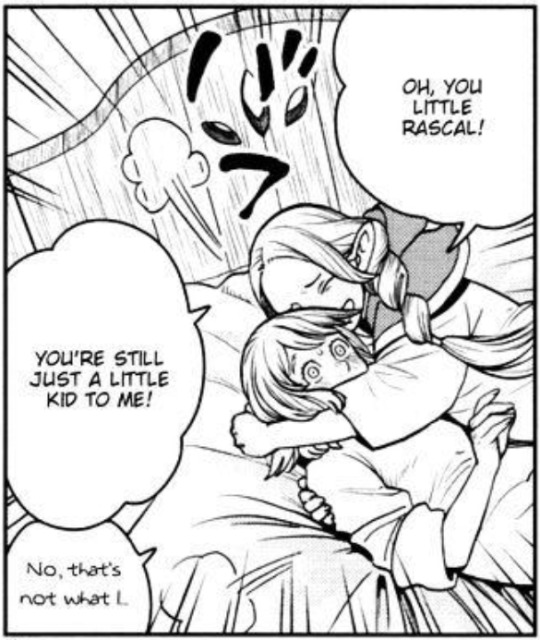
When I first got to this part, it honestly felt... a little uncomfortable? After the bath scene, it is really weird to move into a new intimate situation with Marcille explicitly treating Falin as a kid.
What I have realized in coming back to this scene, though, is how much I think its meant to feel uncomfortable. Throughout the chapter, Marcille's responses to Falin become increasingly patronizing. By letting some of that conflict between them resolve at the end of the first scene, the chapter seems to let things rest, and lets you set it out of your mind.
Then, when the same type of conflict comes back at the end of the chapter, Marcille is even more blatantly treating Falin like a kid, and the unfairness of it hits even stronger. They are both adults, and Falin deserves the truth. After 27 chapters from the perspective of Laios, Marcille, and the others in the group, this progression lets you feel things from Falin's perspective. It's supposed to feel uncomfortable because it IS uncomfortable for Falin, the way no one will quite tell her the truth.
After all, Marcille isn't the only one to do this kind of deflecting when Falin tries to ask about what happened. Laios has a similar response, right down to the 'treating her a bit like a kid' part.
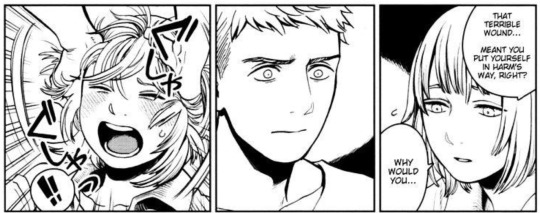
Even more importantly, this final conversation of the chapter reveals one last layer in the knowledge/power imbalance between Falin and the rest of the party: she doesn't actually remember sacrificing herself and teleporting them out.

As I mentioned before, that action was one of the most assertive things we see Falin do in the story, and she doesn't even get to keep that for herself. Instead of being her action, her choice, it becomes yet another thing that the others know more about than her.
I think that's part of why there is such an air of melancholy to this hug they share on the next page
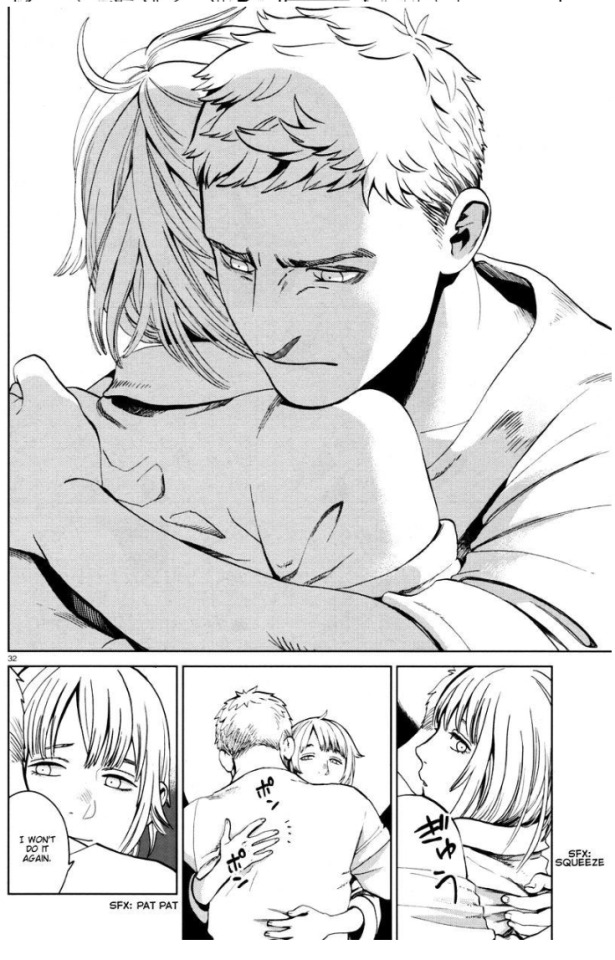
Obviously, obviously, there are so many emotions here for Laios and I don't think its all meant to be viewed as a negative thing, or that he or Marcille are being completely unreasonable. They've been through a lot, and what's more, they think they have time now. So much more time then they actually will have. Time to explain, to open up, to let Falin return to the group in full - as a teammate and not just as someone to be cared for and protected.
But they don't get time. And this relenting by Falin, this "I won't do it again," it's not something that feels triumphant. It's an attempt to comfort them, more a prayer than a promise. As if she is trying to exorcise a spirit. As if she is capable of promising that death won't come, eventually. It's what Laios needs, not what she wants.
That's the real tragedy of the chapter, I think. It's the one time, in the midst of everything, that they have the chance to give Falin what she wants - and they don't do it.
But I do think they realize that, and I think that this failure is a core part of their journey. It's another bittersweet taste to add to the mix - all the missed chances in this chapter to connect, amidst the moments of genuine peace they do get throughout it.
As Laios puts it later...
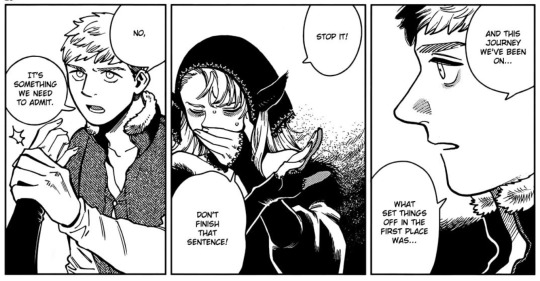
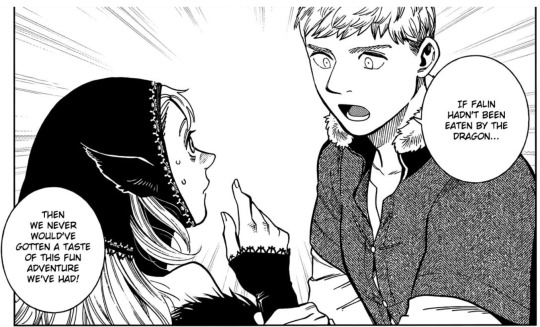
If Falin hadn't been eaten by the dragon, and perhaps if they hadn't failed her here, they never would have had the adventure that they got to share.
(or, perhaps more tactfully: in life & chapter 28, there are both good times and bad. Thanks, Chilchuk)
#dungeon meshi#delicious in dungeon#falin touden#marcille donato#laios touden#dunmeshi analysis#dungeon meshi spoilers
2K notes
·
View notes
Text
Submission by @Zorilleerrant How to Write a Novel
When I make bullet point lists, each bullet point tends to be a couple hundred words, so that’s what I optimize for. But! I find writers usually have a consistent average for that, so everyone should tailor their bullet points to their own experiences. Modify all the numbers as necessary. (And be prepared to revamp them as you go. The outline never survives contact with the writing.) Now how do we turn bullet point ideas into a full novel outline?
Alright. Let’s get down to it.
Step 1: A novel is 50k words.
Let’s break this into smaller sections. 50k is a nice even number, so I like to make 5 parts. A 10k section sounds much more manageable; that’s a normal (long) short story! If you have 5 (or ten) short stories that naturally link up into a novel, this is the final part of the outline. Usually I think that doesn’t happen, though. Anyway, write the 5 high level Events, Inciting Incidents, or Arc Developments. (It could be themes or structural points, if that’s what drives your writing forward, it just has to be The Important Things.)
Step 2: What’s the shape of this section?
So we’ve got our major plot point or what have you. Now it’s important to figure out how to set it up and how to knock it down. I generally block this into a timeline of 10 points (because that’s 1k) to begin with, and then add or collapse bullet points as necessary. The first bullet point should be the opening scene or setup, and the last should be the end of the section or the transition to the next part, but in between is just how to get from A to B. The what is important, but I tend to find why is more helpful to answer so I can figure out how to get characters to do things. If you tend to bang out 1k at a time this is the end of the outline!
Step 3: The Devil in the Details
This is where the bullet point granularity really varies. You can break it up into 10 again (100 words each: a drabble!) or even more if you need to. This can be really helpful because at a certain point you just end up translating the Ideas List into Writer Voice, and once you get the narrative tone down it becomes more consistent. But in general you only need a couple bullet points here: the ones absolutely integral to the scene. Maybe there’s part of the setting you need to describe, or an internal monologue, or a reveal. Put them in order.
Step 4: To write it you have to write it, unfortunately.
Each bullet point should be a fairly short writing section, now. Which means getting all the way through one should be doable in a single writing session. If you know how you want to say it, great! If you don’t, imagine describing it to friends, whether that’s in the silliest way possible, or to try to make it intriguing, or anything else. The beauty of the bullet point lists is you can switch between styles, and you’ll remember during editing why there’s inconsistency every few paragraphs. You can sand that off later; just get the words down.
Step 5: Editing
Throw out the outline. I mean, don’t actually throw it out, in case you need to figure out what you were talking about here or there. But try not to the various sections/segments/bullets as hard and fast rules; some of them will need to be broken up, and others smushed together more. Here’s where you look for the natural chapter breaks. You should also look for any missing scenes, or maybe places where a scene needs to be moved earlier or later. You’ll also, unfortunately, find things that just don’t need to be in the final draft. Save them in a different document, in case people want to see the outtakes later.
Congrats! If you get your novel all the way to this point, it’s ready to be sent to other people to look it over and help you polish it up!
Anyway, for people who like outlining, put all your planning in this part. For people who like figuring it out as they go along, only do the top level breakdown for any section you’re not currently writing; leave most of it blank until you get there.
I hope this helps you or someone write a novel!
-- submission by @zorilleerrant
Thank you so much for writing this!
226 notes
·
View notes
Text
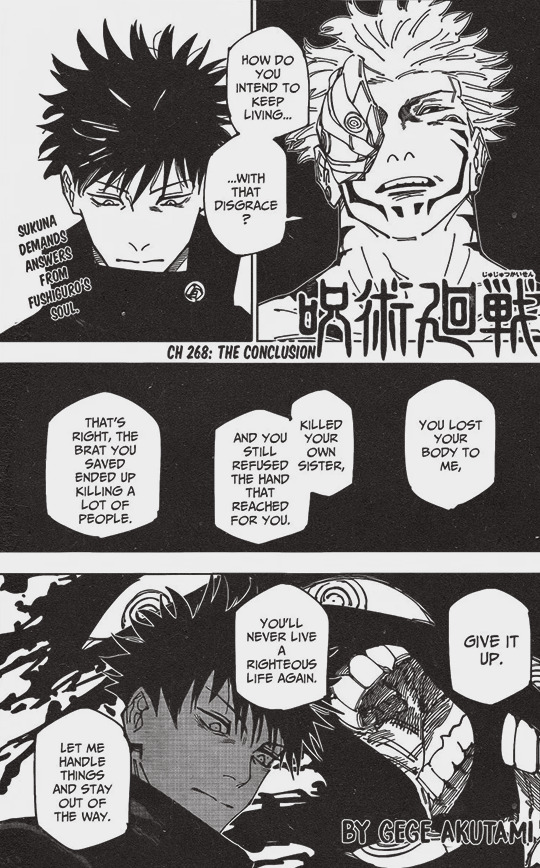
ONCE MORE, I THINK I'LL LIVE FOR OTHERS
So of all the characters in Jujutsu Kaisen Megumi has turned out to be one of the most controversial and hotly debated characters. There's nothing the internet hates more than a boy with trauma, I guess. Jujutsu Kaisen is a controversial work in general so it's not surprising that the ending wasn't super well received by the fans, especially in the way it decided to conclude Megumi's character arc.
There are many people accusing Gege of giving Megumi no character development. Of Megumi just choosing to replace Tsumiki with Yuji. Lots of complaints about Megumi never finishing his domain expansion among other things. Of Megumi being nothing more than a damsel for Yuji to rescue in the end. I'm here to say I think Megumi does have a complete character arc even if it didn't end the way I would have liked, and under the cut I'll be giving my thoughts for Megumi's ending and JJK's ending in general.
I CAN ONLY SAVE THOSE WHO ARE PREPARED TO BE SAVED
If you were to ask me what the most important arc in Jujutsu Kaisen is, it would be Hidden Inventory. Hidden Inventroy covers the inciting incident which leads to all the conflicts in the main story, Riko's death, Geto's defection, Tengen's merger failing, and Gojo's decision to adopt Megumi.
However, it also shows us what motivates Gojo in the main series, mainly his desire to raise this generation of students into strong and intelligent allies because of his inability to save his closest friend when it most counted.

If the quote that summarizes the central theme of Jujutsu Kaisen Zero is "Love is the most twisted curse of them all."
Then I put forward that the quote that summarizes the theme of the main series is what Gojo said to Yaga post Geto's defection, "Being strong isn't enough, I can only save those who are prepared to be saved."
Just like Hidden Inventory is centered around Geto and Gojo's relationship in their youth, the main manga itself centers around Megumi and Itadori's relationship. The manga itself starts with their first meeting. Yuji devours the finger in order to try to help Megumi. Megumi requests Gojo help save Yuji from execution because he didn't want to see another good person die.

Megumi and Itadori are also a deliberate parallel to Geto and Gojo's friendship in the past. To begin with Gojo tried to nurture these relatoinships in his students so they COULD get along and enjoy their youths the way he remembers doing so with Geto in his three springtime of youth.
He not only encourages Megumi to selfishly try to save Yuji even though it is against the rules of sorcery and poses a risk to other people, he also encourages them to socialize at every opportunity.
The strong and intense friendship that Megumi and Yuji enjoy is not only a clear parallel to Geto and Gojo's special connection with one another, but also the fact that a strong reocurring motif in Megumi and Yuji's friendship is their strong desire to save each other. Which is a clear parallel to Gojo's inability to save Geto in the past.
As I said for a long time Yuji and Megumi were being set up as this generation's version of the "strongest duo" except they were going to be able to break the cycle. Whether it be by Megumi saving Yuji, or Yuji saving Megumi, they wouldn't be driven apart by the corruption in the Jujutsu World the way that Geto and Gojo were.
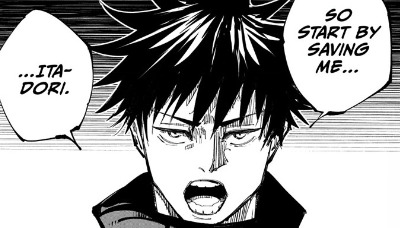
As I said the central question of Jujutsu Kaisen especially in regards to Megumi and Yuji's friendship is if it's possible to save someone who doesn't want to be saved. Which is why Megumi and Yuji both wanting to save each other is something that happens again and again at different parts of the manga. Whether it be the ending of Origin of Obedience where Megumi and Yuji are both unable to talk to each other because they want to try to protect the other from information that might harm them. Megumi hiding the fact that he knows resonance between the Sukuna fingers awakened the curses. Yuji hiding the fact that Megumi's decision to save Yuji has caused strong curses to awaken and kill other people.
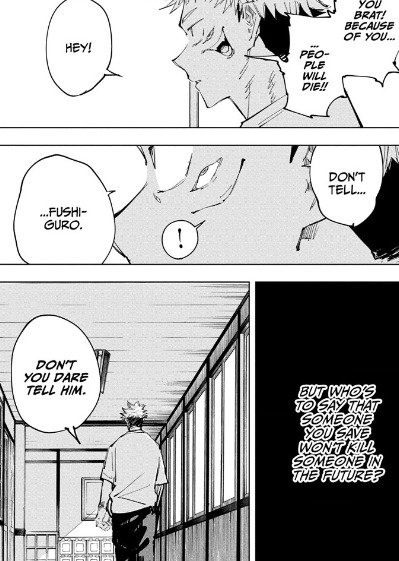
Just as often as these two try to save each other, they fail. Megumi watches Yuji die early on when Yuji takes back control from Sukuna and decides to die without a heart.
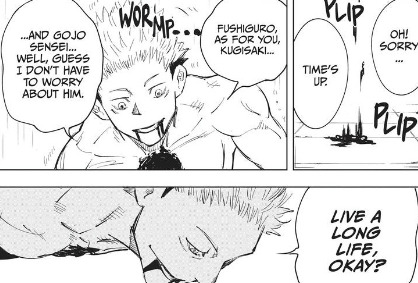
Megumi spends the entirety of the culling games clinging to Yuji's side no matter how Yuji tries to push him away because he knows Sukuna has plans for him. However, Megumi is afraid to leave Yuji alone because he knows Yuji is in a dark place after the Shibuya massacre and that if he's left alone Yuji might just find some way to off himself in a heroic sacrifice to try to atone for the people lost at Shibuya.

Only for Megumi's insistence on clinging to Yuji to backfire because Sukuna ends up taking his body from him in a critical moment. When Sukuna takes his body their circumstances swap and Megumi is the one who's body is being used to kill people by Sukuna. When Megumi has to live with the guilt of Sukuna using his body to kill both his sister and his teacher, he's not able to live with it anymore.
Then their positions swap completely and it's Megumi who wants to die to atone for the guilt, and it's Yuji who doesn't want to let go of Megumi and will do anything to save Megumi from both Sukuna and the other sorcerers even if the right thing to do is just kill both him and Sukuna and letting him live means putting the whole rest of the world at risk.
As you can see not only is saving each other a common theme of Megumi and Yuji's relationship, but at different points of the story both of them are trying to save the other even when the other doesn't value their own life.
Gojo's relationship with Geto is defined by his inability to reach his friend in time, and how he was "left behind" in the end.
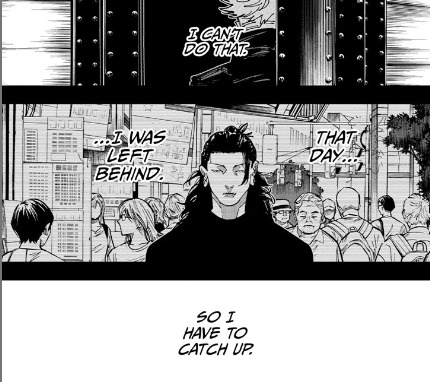
Gojo explicitly waited a year after learning about Megumi being sold to the Zen'in clan to do anything, and only decided to intervene after Geto's defection. Gojo's decision to mentor Megumi was inspired by Geto leaving. He even said "Don't get left behind."
His hope in taking in students like Megumi, Yuta and Yuji was twofold first that he'd be able to handpick and raise several strong students who would eventually replace the elders and reform the Jujutsu World. The second and more personal motivation is that he wanted these students to be able to support each other and be strong allies to one another so they wouldn't end up alone like Gojo did in his youth.

Gojo's intentions were good however, Gojo has a very flawed understanding of how people and relationships work. In Gojo's books "strong=good" and almost everything can be solved by strength. Notice just one chapter ago Gojo said that being strong wasn't enough, he can only save those who are prepared to be saved and yet one chapter later he tells Megumi that he needs to get strong otherwise he'll be left behind.
So, even when Gojo knows that being strong isn't enough and didn't make a difference with Geto, that's still the only real advice he can offer Megumi.
A big theme of Jujutsu Kaisen is the failures of the past generation affecting the present. A lot of people in trying to put Gojo on a pedestal fail to realize one of the central themes of this manga is GOJO WAS WRONG. The way Gojo went about doing several things wasn't the right way. Gojo wants the next generation to succeed him and do better than him, because Gojo himself knows that he was wrong and he's a part of the past generation.
I think a big part of the reason the conclusion to Megumi's character arc is poorly received is that Megumi didn't end his arc the way that Gojo set out for him.
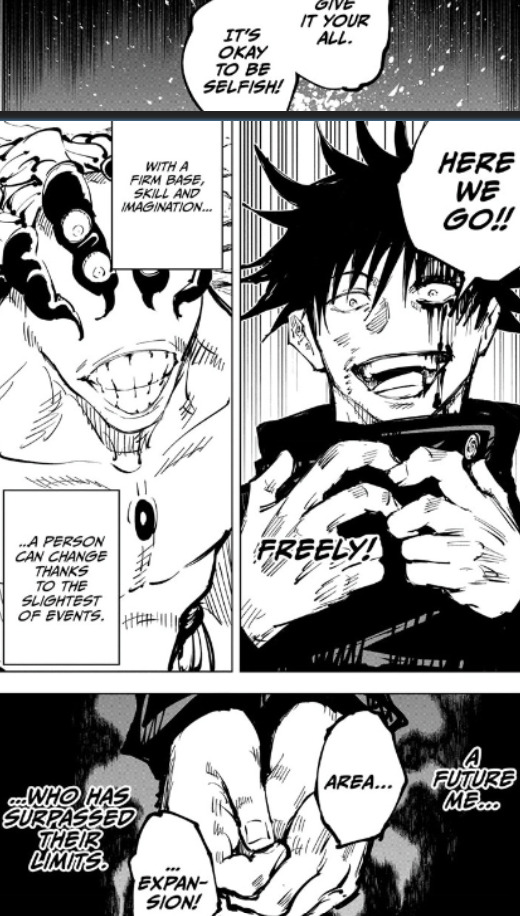
Scenes like this led the audience to believe that Megumi's character arc was going to be completed by him learning to be more selfish and living up to the potential that Gojo saw in him. That we were going to get a completed domain expansion. That Megumi was going to become stronger than Gojo because the ten shadows was the only technique to ever beat a wielder of the limitless and the six eyes.
I understand wanting to see Megumi living for himself, and how cool it might be to see Megumi's complete domain expansion after Gege teased us with this twice but I have to ask this.
If Gojo was the strongest sorcerer in the world, and that still wasn't good enough to save Geto. Then how would Megumi reaching his full potential as a sorcerer in any way help Megumi avoid making the same mistakes that Gojo did?
HAVEN'T WE HAD ENOUGH OF GOJO SATORU
I think a lot of dissatisfaction in Megumi's character development comes from he didn't really follow the path that Gojo set out for him. He didn't unlock his full domain expansion, he didn't learn to live more selfishly. They say that Megumi simply choosing to live for Yuji isn't him learning to stand on his own two feet because he's just hinging his self worth on someone else the same way he did with Tsumiki.
However, I have to ask.
How exactly would Megumi becoming more like Gojo or more like Sukuna be any better?
A big recurring theme in Megumi's arc is his lack of agency, and how many different adult figures have tried to mould him to their own selfish ends.

In the same chapter where Megumi has the flashback where Gojo encourages him to become more selfish, Sukuna has his hands wrapped around Megumi's neck in the colored page. Sukuna was never actually trying to mentor Megumi.
He only had an interest in Megumi because his ten shadows techniques was a way to bypass Gojo's infinity. Henever actually cared about Megumi reaching his full potential. He was grooming Megumi in the long term so he could snatch his body and turn him into a weapon against Gojo Satoru. The same way that Gojo only decided to take Megumi in and mentor him in the first place because his technique meant he had great potential as a sorcerer and a future ally in Gojo's crusade against the elders.
Megumi's life is defined by every adult in his life trying to mould him or use him selfishly for his own gains. His father sold him to the Zen'in clan for gambling money and abandoned him. Gojo only was interested in a strong ally against the elders. Sukuna is just one in a long line of people who are trying to shape Megumi into something he's not for their own selfish desires.
Ngl, the fushiguro girlies are kinda onto something with their characterization of Sukuna’s possession as the physical embodiment of his lifelong struggle for self determination and autonomy and how others have always pupeteered his fate for their own devices and he’s thusly never put himself first ─ his selfishness functioning ultimately as platitudes which still center others and his consideration for them. [SOURCE]
So if all of Megumi's various abusers have tried to make Megumi into something he's not and robbed him of his agency in the process, then is the best ending for Megumi really to become more selfish like Gojo or Sukuna?
If Megumi ended his character arc by using a complete domain expansion, and reaching Gojo's level of power wouldn't that be validating the way Gojo stole Megumi's entire childhood from him in order to make him a strong sorcerer. Wouldn't it look like the narrative was going, yeah, it was wrong for Gojo to groom Megumi like that, but look how strong it made him!
We already have a version of Megumi who learned to live only for himself, someone who broke the chains of fate and became entirely free.
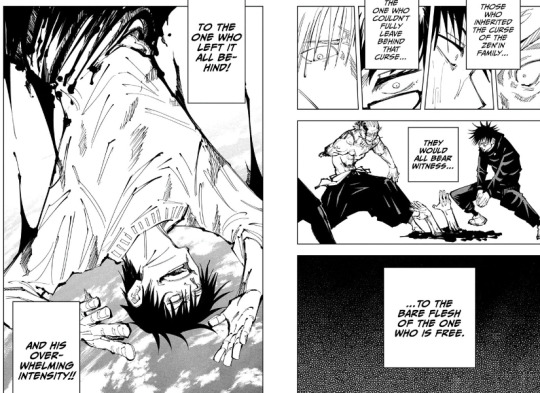
Toji shows us a version of Megumi who lived up to his full potential as a sorcerer, became someone strong enough to threaten Satoru Gojo, and who put himself above everyone else and... Toji's fucking miserable.
Toji is the bad ending of Megumi. He's strong but that's all he is. The narration refers to him as a puppet of carnage, only living to fight the strongest around. In fact, Toji dies BECAUSE he wanted to feel validated as the strongest. The decision to say and fight against Gojo when Gojo unlocks reverse cursed technique leads to his death. Being the strongest and his desire to be validated as someone strong is nothing more than a curse for Toji and what allows him to escape the cycle is not strength, but rather seeing that his son has succesfully escaped the abuse of the Zen'in clan.
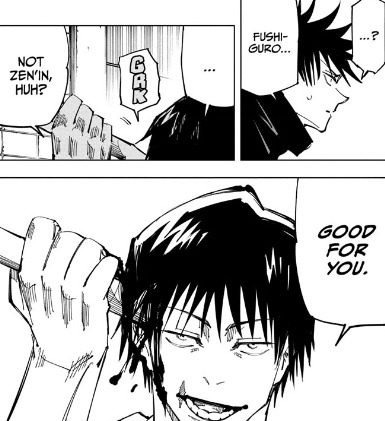
So having Megumi live up to his full potential as a sorcerer, or living selfishly the way that Gojo or Sukuna wanted him to wouldn't really be breaking the cycle, because it'd be Megumi acting the way his abusers wanted him to act. If anything it' be Gojo's long term grooming of Megumi finally succeeding.
I understand that Megumi fighting back on Sukuna from within with one use of ten shadows to create a puddle underneath Sukuna's feet isn't the most dramatic way to signal his journey of self-realization, but sometimes the flashy, dramatic, and satisfying thing isn't always the right thing.
if the central relationship of the series is Megumi and Yuji, and the central question of that relationship was "is it possible to save someone who doesn't want to be saved-" then resolving both Megumi and Yuji's character arcs requires answering that question. That's the most important part. How are we going to break the cycle and have Megumi and Yuji save each other in a way that Geto and Gojo weren't be able to.
Yes, I understand wanting Megumi to be his own person and stand on his own two feet, but before he's a person Megumi is a fictional character. Megumi and Yuji are characters intentionally designed to be each other's other half. The same way that Geto is designed to be the other half of Gojo. They both represent a yin / yang pair. They both represent the shadow and the light, the sun and the moon.
People also talk about wanting Gojo to learn to be his own person outside of Geto, but that's also missing the point. Gojo isn't a person to begin with he's a character designed to be the other half of Geto. All of those parallels that exist between them, both of them getting their bodies stolen from them, both of them becoming monsters (geto slaughtering the village, Gojo slaughtering the elders), both of them dying on the same day. Those are intentional, because they're fictional characters meant to represent the concept of yin and yang and balance. Gojo cannot exist without Geto, Geto's body causes Gojo to get boxed, Gojo dies within a year of killing Geto, because they're meant to represent the taoist concept of BALANCE in a manga that's about BALANCE. Gojo cannot achieve balance with the character that symbolizes his yin. Whereas, Megumi's way of achieving balance is to find a way to make things work with his other half Yuji in a way that Geto and Gojo failed to.
As someone who used to be the biggest Megumi Corruption Arc truther, I've come around in my thinking and I can at least understand why Gege didn't go that direction. Megumi learning to be selfish like Gojo would be changing too much of Megumi's inner nature, because as much as Megumi pretends to be selfish as an excuse he still is someone who wants to help people.
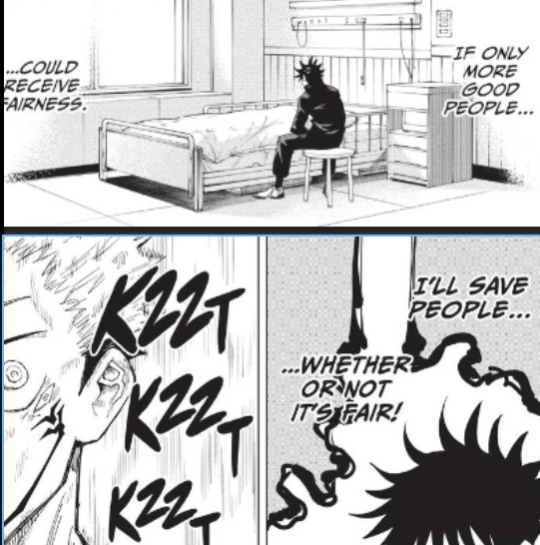
There's nothing wrong with Megumi wanting to help people, or wanting to be a team player. It was Megumi deciding to hinge his entire self worth on just his ability to help one person. It's why he couldn't go on when Tsumiki died, not just because he was grieving his sister, but because he decided to make protecting his sister his entire reason to live and genuinely saw no other reason to keep on living.
A lot of people say that Megumi is just deciding to make Yuji into an emotional crutch the same way he once did with Tsumiki, however, I don't think these lines of dialogue really indicate that.
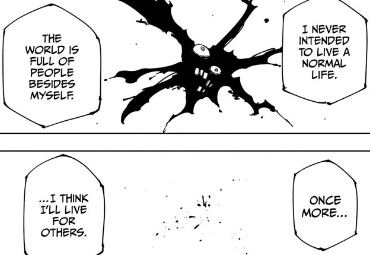
"The world is full of people besides myself. Once more I think I'll live for others."
To begin with, Megumi says that the world is filled with lots of people. Megumi didn't want to go on because he didn't think he'd ever love someone as much as he loved his sister. That there was nothing in the world worth living for if his sister was gone.
However, now Megumi is acknowledging that there are more people in the world than just Tsumiki. That he might come to love them the same way that he loved her. That he shouldn't give up on life just because he lost one person, no matter how important that person was.
Megumi's words run contrary to the idea that he's just going to use Yuji as his next living emotional crutch, because he says the world is full of people. There's more people than just him, there's more people than just Yuji, as long as Megumi makes the choice to continue living then he can go out into the world and meet them.
Jujutsu Kaisen is a very individualist manga, and I understand we also exist in an individualist society so we want to see Megumi stand on his own two feet and live for himself, but I don't think Megumi deciding he'll live for others is a bad thing. This is just a few chapters after Yuji said that what makes life meaningful is the memories you leave behind with other people. Which is the exact same sentiment.
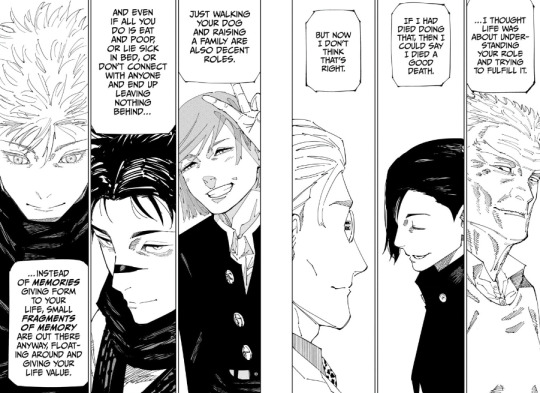
Yuji is able to break free from the cog mindset when he realizes that all the people he connected to in his life gave his life meaning, even if they died tragically, even if he only knew them for a short time. Choso's final words are "Thank you for being my little brother" and that connection was incredibly important even though they only knew each other for about a month. Yuji's life became meaningful because he went out into the world and made all these important connections.
Now Megumi is doing the same thing. He's resolved that even though his sister is dead the world is full of people he can connect with. That he can come to love other people the same way that he did. That his life is still worth living because he can find new people to love. Is Megumi deciding he can try to live for the other people in his life and his connection to those people even after the loss of his sister made him feel like his life is worthless and he'll never love anybody that way again, really that different from Yuji deciding that the people he made connections too gave his life value?
Jujutsu Kaisen lifts from other manga, this is pretty common knowledge. Killua and Shinji Ikari are probably the two biggest inspirations for Megumi and both are two very passive characters who are entirely reactive. They don't decide, they don't act, they react to the decisions of people around him.
Killua's ultimate moment of character development isn't beating his abusive big brother, or his abusive parents in a physical fight after getting a power up. Killua's greatest moment of character development is accepting Nanika as a part of Alluka. Something he was too afraid to do because it would mean that his family would continue to try to exploit Alluka for her wish granting abilities.

Killua finishes his arc with the resolution to protect both Alluka and Nanika from the rest of his family. Considering that Killua has been centering his entire self worth around his usefulness to Gon by this point you could call it Killua is just replacing Alluka with Gon as a crutch if you were cynical. Or you could just say that Killua, like Megumi is someone who lives for their loved ones and finds value in the bonds he makes with other people.
Shinji Ikari spends the entire 26 episode run of Neon Genesis Evangelion not making a single decision, and his final moment of character development isn't really that much character development. He simply makes the decision to reject instrumentality and try again. To go back to the real world and try to be a person in the world again, because as long as you're alive there's still a chance to be happy.

Megumi like Killua, never really changes. It's in Megumi and Killua's nature to be a protector / a nurturer. They want to take care of the loved ones in their lives. Megumi and Shinji both have an arc where it takes the entire anime / manga to take the very first step. Their arc is there to depict how hard it can be to take that first step on the journey to change when you're as traumatized as someone like Shinji or Megumi.
Megumi's arc especially is about him making his very first decision in the whole manga. As I said the central question of Megumi and Yuji's relationship is can you save someone who doesn't want to be saved and Yuji eventually finds you that you can't.

Yuji's greatest moment of character development and empathy for Fushiguro is realizing he can't force savlation on Fushiguro if Megumi doesn't want it. He can't force Megumi to live. He can't just tell Megumi to be stronger.
In doing so Yuji does something that no one has ever done to Megumi in his life, and offered him a choice. Gojo expected Megumi to be as strong as him and saw him as a mini-gojo never once taking his opinion into the matter. As I said above Gojo sees being strong as the soliution to all of life's problems. His adivce to Megumi was don't be weak, otherwise you'll be left behind.
Yuji allows Megumi to be weak. He says that Megumi doesn't have to be strong and suck it all up. The metaphor of Yuji and his grandfather works well to show how Yuji truly understood Megumi in a way Gojo never did. Gojo expected Megumi to be as strong as him. Gojo encouraged Megumi to grow up into another Gojo. Gojo failed to understand Megumi in many ways because he wasn't Gojo, and enjoy Jujutsu and being a sorcerer the way that Gojo did.

Yuji relates the story of his grandfather rejecting chemo treatment. At the time he didn't understand why his father would refuse the treatment just because it was painful, because Yuji being young would have been very easily able to handle the pain. However, after Yuji went through trauma and started dealing with suicidal ideation in the aftermath of Shibuya he understood why some people wouldn't want to keep fighting.
Yuji knows what it's like to be weak and want to give up so he doesn't want to force Megumi to be strong. Gojo projected himself onto Megumi and expected Megumi to always be strong and to love Jujutsu like he did, and didn't understand the ways Megumi was different than him. Yuji on the other hand accepted Megumi for who he was with those words, even though Megumi was weak and didn't want to continue living Yuji didn't crticize him he accepted that Megumi was different from him. He accepted the fact he didn't really understand Megumi's pain. He validated Megumi's pain and didn't try to dismiss it.
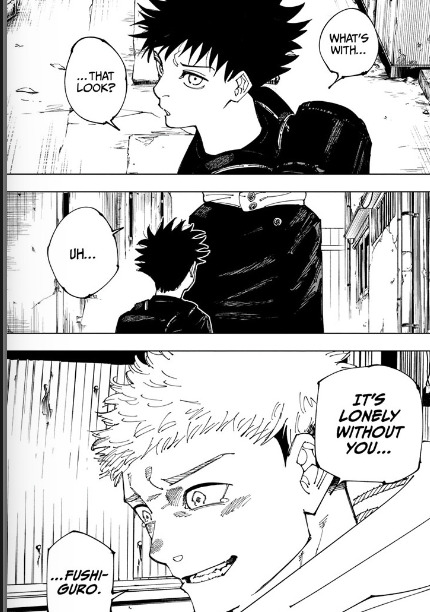
This parallel to Gojo and Megumi's first meeting is so important, because Gojo showed up in that child's life only to exploit him. While Yuji gave Megumi a choice. Even if it meant that Yuji would be lonely and heartbroken, he still gave Megumi a choice on whether or not he wanted to live.
In the end Yuji gave Megumi a choice, and Megumi made that choice to keep living. Just like Shinji, Megumi's entire character arc was just leading him up to taking the first step on his journey. Just like Shinji, Megumi's entire arc is defined by his choices being taken away from him but the very first choice he makes is his most important one: the choice to live.
So yes, a Megumi corruption arc would have been really cool but I think the answer of "You can't save someone who doesn't want to be saved, but you can still love them" is a beautiful one.
#jjk meta#megumi fushiguro#yuji itadori#itafushi#satoru gojo#suguru geto#satosugu#ryomen sukuna#jujutsu kaisen spoilers#jjk 271#jujutsu kaisen 271#jujutsu kaisen#jujutsu kaisen meta
443 notes
·
View notes
Text
Continuing with the theory that Protocol is just Archives mirrored, let's do a little compare and contrast between TMAGP 40 - Public Image and MAG 101 - Another Twist, as both episodes are about halfway through the series (if I recall correctly how long Protocol is supposed to be).
In this episode, the protagonist finally has a face to [no] face meeting with a supernatural entity associated with inanimate, humanoid things. [The Archivist has been uncomfortably strapped down into a chair against his will. He is not the gorilla skin Nikola needed for her scheme to reshape the world and make harvesting fear easier, but he'll suit her purposes just fine.]
But someone else is here that the entity didn't account for - someone here to "rescue" the protagonist. For a few episodes littered throughout the season, [Michael / Starkwall] has been looming in the background as an uncomfortable potential ally. They, or at least a part of them, messily helped avert an apocalypse before, but now they're considered too dangerous to work with. At least, [Gertrude / Lena] does not have any more use for them. But she's not in charge anymore, is she? [Michael / Dane Bowie] tells the protagonist they will [kill him / ensure her safety], but by the end of the episode, the one who made that promise is no more (though the greater [Distortion / Starkwall enterprise] still exists).
The [statement / case] for the episode is a freely-given first-person account of how an [avatar / external] came to be (and it's clearly written in a way to endear the meta audience, us, to him). It's been around for quite a long time, in a few different forms. But at one crucial point, an exceptionally [old / young] person decided to more concretely define it, to forever change it, confining him into the shape of a tall, eerie man with strange fingers and notably [light / dark] hair. Well, mostly confined. The man, the architecture, the [door / doll] that is the inciting incident; they're all one being, but now they're one that takes a more active role in how they feed. Being given a body seems to have [weakened / strengthened] the previously abstract fear.
As the story wraps up, the [avatar / external] offers the protagonist a way forward, but not here. [Heinrich Unheimlich once again offers Alice a specially prepared chair to sit in, for her comfort. She may not be the one he had intended to talk to for his scheme to reshape himself and make harvesting fear easier, but she'll do just fine.]
So anyway Alice is TOTALLY in good bloodstained hands and we have NO REASON to be worried.
#the magnus archives#tma#tmagp#the magnus protocol#the magnus protocol spoilers#tmagp spoilers#tma spoilers#tmagp 40#magpod
88 notes
·
View notes
Text
The TTPD Deep Dive (Part ?)
It’s no secret that I have a lot of Thoughts about The Tortured Poets Department and it has lived rent-free in my head since it came out earlier this year. I’m absolutely blown away by how underneath the chaos, it’s actually an exceptionally cohesive story and is probably the closest to a concept album Taylor has ever done.
There are so many themes that have stood out to me over the last five months, and there’s one in particular that I think not only drives the entire album, but ties into previous albums to help deepen understanding of it.
This is it, my fangirl magnum opus, my months of posts consolidated into one place. This is also my disclaimer that this is just my interpretation of the album, and my summary of the story it tells, and I don’t pretend to have any special insight or authority. I’m not saying I’m correct at all, do not take any of this as fact, it’s just what it sounds like to me, and these are my silly not-so-little thoughts about it.
(Under a cut because it’s way too long and involves discussion many may not care for or be sick of.)
Come one, come all, it's happening again (I'm thinking too hard about Taylor music)
The overarching theme in TTPD to me is: Grief. If you’re looking at TTPD as a story being told (instead of just as someone’s real life), the inciting incident of TTPD is loss, and the grief from that loss is what drives the narrator’s actions and the fallout, as well as unpacks those complicated feelings and how they apply to the her life in general. By the end of the standard album, it’s also about recovering from that pain, moving on from it and learning from it.
The loss specifically is the loss of the dream of having a family (with one’s partner). One thing that is abundantly clear both on the top line and under the surface in TTPD is how Taylor (as a person and as narrator) longed not only to for marriage but specifically parenthood, and the fear and then realization of losing that chance absolutely wrecked her— which is why the next lover’s (the conman's) wooing worked so well, because it preyed on that yearning. Yet that loss also dovetails into the grief of many things: of youth, of idealism, of relationships, of ideas, even of self, which causes almost a deconstruction of a belief system to piece one’s life back together by the end.
THE CONTEXT
TTPD weaves in the topics of marriage and motherhood both explicitly and in the subtext, in various forms and scenarios. The cheating husband in “Fortnight.” The wedding ring line in “TTPD” the song. “He saw forever so he smashed it up” in “My Boy Only Breaks His Favorite Toys.” All of “So Long, London.” Running away with her wild boy in “But Daddy I Love Him,” fantasizing about weddings and joking about babies. The imaginary rings in “Fresh Out The Slammer.” The cheating husband (again) and the friends who smell like weed or “little babies” in “Florida!!!” “You and I go from one kiss to getting married,” “Talking rings and talking cradles,” and “our field of dreams engulfed in fire” in “loml.” (And arguably: “I wish I could un-recall how we almost had it all.”) “He said he’d love me all his life, but that life was too short,” in “I Can Do It With A Broken Heart.” They may not sound like much on their own, but they paint a picture about how the topics pervaded her thoughts and her writing, and in many cases express her desires, and her pain.
It’s something that goes back several albums when you pick up on context clues. You get the first hints on Reputation with “New Year’s Day,” and “you and me forevermore.” Then Lover is very forward with it: “Lover” is basically wedding vows, “Paper Rings” is very engagement-coded, “I Think He Knows” is cheeky but low-key “you better put a ring on it,” “It’s Nice To Have A Friend” has wedding/marriage imagery in the last verse. As a self-professed diaristic writer, it’s the type of stuff one presumably doesn’t put out there unless those conversations have already happened, and she was very excited about it at the time it was released.
Then the pandemic happens and folklore comes out, and while there is still happy love there (“invisible string”), there are also the first indications that something has happened to put a halt to whatever future she once dreamed of (“hoax,” “the lakes”) and that she’s trying to reassure herself and him that it can still happen even if she’s scared it might not (“peace”). Notably, as far as I can remember it’s the first time Taylor explicitly brings up the idea of family (with her partner) with “you know that I’d give you my wild, give you a child,” which stood out at the time because it’s so incredibly vulnerable, but it’s even more poignant when you really take in that the whole song is like a confession of her deepest worries, and this is her vowing to give him these things that she holds most sacred if he’ll let her. These are what she cherishes most dearly and wants to return in kind: her youth and commitment (my wild), the family she craves (a child), unconditional support (swing for the fences/sit in the trenches) and understanding/compassion (silence that only comes when two people know each other).
Evermore follows an even darker path, and suddenly the album explores relationships that end and grappling with loss. There are toxic relationships (“tolerate it”), dangerous marriages (“no body, no crime,” “ivy”), failing/broken relationships (“Coney Island,” “champagne problems,” “happiness,” “‘tis the damn season”), as well as grief (“Marjorie,” “evermore”). Even some of the happy songs have uncertainty in them: in “willow” she’s begging for him to take her lead, like she’s still trying to decipher him and ask him to commit; in “cowboy like me,” still a beautiful love song, she’s thinking, “this wasn’t supposed to work and we were supposed to bail on each other but we fell in love instead”; “evermore” is about the depths of severe depression (and more) with the love story being the one saving grace in her darkest hour. And it’s also notable that after all the “fiction” writing, shortly after this album she writes “Renegade” where she’s telling the subject: I’m ready to start the next phase of our life now, why aren’t you? Is it me you don’t want after all? It’s like there’s something telling her that this stall might not just be a stall.
Midnights is a jumble (in a good, but in hindsight, also sad way) with the “sleepless nights” concept, but it seems pretty clear now that the themes and events and relationships she was revisiting tied into a lot of what she was feeling in her present life. I wrote the cliff notes version awhile back, but she’s questioning so much of her life that’s reflected in past events and relationships. Am I actually always the problem? How did we lose sight of each other and what we had? We only seem to work when we block out everyone and everything else. Can we ever go back to when things were good? Why are you neglecting me? I once thought I was going to lose everything but you saved me in the nick of time, can that happen again? I chased my career, but did I give up my chance at having a family in the process? Nobody knows what I really suffer from behind closed doors and I’m all alone.
And so on, which in retrospect now that we have TTPD, is very much what she was grappling with in private while writing and releasing the album. The inspiration behind the songs may have been different events and muses, but regardless of their origins they all end up feeling too familiar, like she's seen this film before (ahem). We’re seeing her view of commitment change too, or rather how she writes about it: she’s not making the outright declarations of it like on Lover, or even the implied ones on folklore, nor is she talking of the dark side of it like evermore. For the most part it’s a return to the early days of some relationships, before things got hard, or the end of them when there was nothing left, and also pushing away the discussion of it altogether by the outside world. “Sweet Nothing” is a sweet slice of life, but even at that, it’s the peace of the home in conflict with the pressure of the outside world. Now that we have “You’re Losing Me,” which was written at the same time as the rest of the album, we can probably deduce that she was going back to the start because something happened that made her doubt the future.
THE SETUP
So much of Midnights directly ties into TTPD, and I said in the post I linked that it’s like Midnights is asking the questions that TTPD answers. But there’s one song in particular on Midnights that sticks out to me as being key in the broadest sense to understanding the state of mind that led to the events of TTPD, and that’s “Bigger Than The Whole Sky,” because the way it expresses grief is reflected in the theme of mourning a life built and the dreams along with it that are never realized in TTPD. There are several instances in TTPD that are basically variations of: “every single thing to come has turned into ashes,” and that’s what makes her snap, and leaves her vulnerable to someone who promises her those things when she’s bereaved at losing them in the first place. (In other words: “the deflation of our dreaming leaving me bereft and reeling.”) The song tells a story about how that loss of hope colours one’s entire mindset, and in some ways is a bridge to TTPD to understand what such a low point feels like.
I think that that grief, and most importantly losing hope for an imagined future in its wake, is fundamental to understanding TTPD on so many levels: both the decline with one partner that kept her hanging on then led her such a dark path, and why she fell for the conman's apparent bullshitting because it offered an express pass to what she was losing with her partner. And I also feel like it plays a part into the ruminating she’s doing all over Midnights, trying to make sense of where she finds herself when she’s writing the album, which directly leads to “You’re Losing Me.” Loss permeates so many of the stories on Midnights: of lovers, of innocence, of youth, of faith, of control, of life’s work, etc. “BTTWS” is just one of the ways in which it is expressed so fully, capturing that deep depression and subsequent extinction of faith in something that once felt assured and very much wanted. (Which is also mentioned in her writing process in the “Depression” playlist on Apple Music.)
If you understand why that feeling of loss in general across so many parts of life is so important to Midnights, then it illuminates so much about the “narrative” in TTPD too. If on Midnights she’s wrestling with the seeds of grief and loss (on multiple fronts), TTPD is her reckoning with it in its full form. “So Long, London” is the song that is the most explicit about it: How much sad did you think I had in me? How much tragedy? Just how low did you think I’d go before I’d have to go be free? You swore that you loved me, but where were the clues? I died on the altar waiting for the proof. It’s the sequel to “You’re Losing Me.” It’s, the air is thick with loss and indecision, I know my pain is such an imposition, I’m getting tired even for a phoenix, all I did was bleed as I tried to be the bravest soldier, I’ve got nothing left to believe unless you’re choosing me, my heart won’t start anymore, but from the other side of the break.
This is highly speculative, but if you follow the thread about the topic and the relationship as told from Rep through TTPD, in broad strokes it goes: young love with a serious connection (Rep) -> growing up and making life plans (Lover) -> something happens that delays those plans or makes them grind to a halt (folklore) -> serious doubts arise and cause a loss of faith in their future (evermore) -> struggling with the loss of that future and trying to make sense of the problems in a last ditch attempt to save the relationship (Midnights) -> fallout from that grief after the blowup of the relationship (TTPD). Understanding that progression of events (through the music) explains not only the storytelling side of TTPD (e.g. the jump from the partner to the conman) but also how the experiences/muses blend in the music, and how the music that on the surface is about the short-term relationship is really driven by the destruction of the long-term one.
Following the music, it’s IMO implied that Taylor (the narrator) was holding out for marriage and family with her partner, for years, and it seems like it was at one point a shared dream until something happened to pump the brakes, and seemingly on her partner’s end. And extrapolating further, given how the sorrow expressed in former albums bleeds into TTPD, it sounds like a plan that had been concrete in some form before it had fallen apart, and losing something that once felt so tangible is what drives her in her grief to find any kind of respite from the pain. Which is why the situation with the conman becomes so appealing as the one with the partner splinters further and further.
(If everything you’ve once touched is sick with sadness and you don’t want to be sad anymore, what are you left to do?)
THE STORY
So (one part of) the story kind of sounds like this from the standard album: the relationship with her partner as well as his mental health slowly deteriorate and he withdraws emotionally (“London,” “Fresh Out The Slammer”) and physically (again, “London,” and “Guilty As Sin?”) and takes his resentment out on her (“London” and arguably “My Boy Only Breaks His Favorite Toys” even though I don't want to get into muse speculation here). As she sinks deeper into her own depression as a result, the weight of the failing relationship starts feeling like a cage— or a noose (“London,” “Guilty”), but coming to terms with the loss of their life together and the future they’d dreamed of was killing her (again, “London,” but also “I Can Do It With A Broken Heart”).
Enter the conman who she reconnects with at the very point where this is coming to a head (knowing that IRL she reconnected with him around the time Midnights was being worked on) , and if you read between the lines, she confides some deeply personal things to him (“Down Bad” and “hostile takes overs”/“encounters closer and closer,” “Smallest Man” and the entire sleeper cell spy imagery which is one of my favourite things and I could write a whole essay about the meaning of it, “loml” and “A con man sells a fool a get-love-quick scheme”). Then after she’s confided these secrets to him, he insinuates himself back into her life (“Guilty,” “Down Bad,” “Smallest Man”) and sells her a dream that HE can give her all these things she hopes for (again, “Down Bad,” “Smallest Man,” “loml,” song “TTPD,” “Broken Heart”).
But the thing is, he only knows these are the things she wants because she’s revealed it to him, and presumably, told him that was what she was losing by staying with her partner. And instead of the normal response of, “that is really sad that your partner is not supporting you and you deserve to be treated better,” to a friend in growing distress, it seems like it was, “well I can give you all those things!!!! Right now!!!! Trust me!!!!” And worked on her until she believed it, and jumped at the chance at a precarious time in her life. And one thing I want to underscore is: Taylor has agency in the situation always, it’s not like she’s been kidnapped and brainwashed. (In fact, she implores on songs like “But Daddy” that SHE is in charge of her own choices, good or bad.) She chose to rekindle the friendship and then relationship, and she chose to eventually leave her long term relationship for another man, and she reiterates on the album that she owns this all. But it’s also: nothing exists in a vacuum, and she makes choices based on emotions and information she has at the time, which is why it gives so much whiplash.
THE ALBUM
When you look at it as, the situation with the conman only happens because of what happened with the partner first and that the appeal of the conman and the fantasy he sells her is a direct reaction to that, it makes the “swirliness” of the music make so much more sense. And for much of it, even many of the “conman” songs on the surface are really “partner” songs underneath.
Fortnight
A suburban gothic allegory about a broken marriage with a distant husband with a wandering eye, which makes the rekindled romance with the neighbor so appealing. She’s miserable caged in her stifling house because she’s been abandoned by her spouse, so the reappearance of this past love reignites the passion that’s dead at home.
TTPD
“So tell me, who else is gonna know me?” “I chose this cyclone with you.” I’m gonna kill myself if you ever leave. Everyone knows we’re crazy. She’s laying it out there that she’s already in a dangerous state of mind, and she’s actively putting herself in more danger by pursuing the conman. “At dinner you take my ring off my middle finger and put it on the one people put wedding rings on, and that’s the closest I’ve come to my heart exploding,” spells this whole thing out so clearly: whether it’s an actual event (likely) or a metaphor for the promise he makes to her, the reason why it makes her heart explode is because it’s the thing she’s been waiting for forever with no movement, and here this person comes in and slips it on her finger in an instant like it’s nothing. (And eventually, as we’ll come to know, it is absolutely nothing to him.) You mean it could have been this easy this whole time?! (Well, no. Not until a certain other suitor makes his appearance later.) It feels like she’s finally getting everything she wanted in the blink of an eye! How lucky! How convenient! What was that about the get-love-quick scheme you say? (Unsaid: the reason why this feels so urgent is because there’s a sense that time is running out in so many aspects of her life and not just the obvious. Which reappears later on.)
Down Bad
“Did you really beam me up in a cloud of sparkling dust just to do experiments on?” sets the scene for this euphoric experience in the moment that starts to feel violating once the dust settles (which is then followed up in “Smallest Man” and the spy mission on her). The bridge spells out how he weaselled his way into her life, preyed upon (intentionally or not) her emotional state, sold her a dream and then vanished, without the benefit of hindsight yet we see later in the album.
The alien abduction metaphor is pretty brilliant, because it shows both how she was desperate to escape the place she found herself in, and how much it screwed her brain to then be left stranded when the affair was over. “[I loved your] hostile takeovers, encounters closer and closer,” is so evocative because it details how the situation came to be: his overtures under the guise of friendship blurred lines until he made her an offer that she eventually couldn’t refuse (hostile takeovers) as he infiltrated her life more and more intimately. The sad thing is that the song has parallels to how her relationship with the partner started too in earlier albums, in that they ran away to live in their own bubble (or planet) only for him to metaphorically abandon her as the years went on. (Oven, meet microwave.)
My Boy Only Breaks His Favorite Toys
Being continually emotionally broken down by a person who knows he’s hurting you but still acts the way he does. (The original voice memo version makes this even clearer and it’s rather heartbreaking.) “He saw forever so he smashed it up,” speaks to the loss of a future the person became scared of, and the original lyrics (“he saw forever so he blew it up”) somehow cut even deeper to me because it feels so much more intentional.
Also in the original version, “he was my best friend and that was the worst part,” also speaks not only to the loss of an entire partnership in the wake of this hurt, but also to the feelings of betrayal that the person you trust so deeply has the ability to hurt you in this way too, and how it’s a one-two punch of not only losing the relationship but also your closest confidant. (It’s like the sequel to “Renegade” and the missiles firing to me.) Again, there are shades of both/many situations in the song, pointing to an unfortunate pattern in some ways. The situation in “My Boy” is part of why she was so low, and why the “get love quick scheme” was so appealing later on. And it dovetails nicely into…
So Long, London
The most explicitly “partner” song that puts a coda on “You’re Losing Me,” and is Track 5 because it’s the emotional underpinning of how she got to where she was, and drives the events of the rest of the album. It spells everything out: He withdrew, she tried to fix it for both of them, eventually even that stopped working, he was oblivious to or minimized how badly she was suffering and his (in)actions couldn’t reassure her, he wouldn’t move forward on their future plans and stewed in his own struggles, she was spiralling out of control trying to hang on and ultimately felt like she was going to die if she didn’t leave.
But Daddy I Love Him
Like a direct reaction to “So Long, London” in that she breaks free from the death of one relationship and throws herself with reckless abandon to the next, fuck the haters. How dare you judge me, when the relationship you think I should have stayed in was killing me? (Dutiful daughter all the plans were laid. All you want is gray for me.) Fuck all of you, I’m going to choose whoever I want! (So what if I have a baby with HIM, huh?! I tried doing it the proper way and look where that got me so now we're back to square one) It’s again her imagining how wonderful and freeing this “wild boy” is going to be for her, and how wrong she’ll prove everyone. THIS TIME she definitely got it right. So what if she has to run away! So what if she scandalizes the whole town! They don’t know what she really wants or needs anyway! She’s the only one of her (hee-hee-hee) and she’s the only who gets to decides how this goes. (Because: she longs for control in a situation she’ll eventually realize she has little of it in, which we’ll find out is a recurring theme in her life.)
Fresh Out The Slammer
Also spells out what happened with the partner in the first verse and the pre-choruses, which is what makes the conman so appealing as the imagined jailbreak. The bitter loneliness vs. the sultry passion she builds up in her head as she awaits her release from prison is key to understanding the two sides of the story in the album. There’s this whole outlaw imagery (which is also carried through in “I Can Fix Him”), but it’s contrasted in the end with her and her reunited lover sitting on park swings like children with “imaginary rings” — because “Ain't no way I'm gonna screw up now that I know what's at stake.” What’s at stake is lasting love and the promises that come with it (marriage/family) that are precious and time-sensitive. The imaginary rings are both a nod to the youthful dreams of her and her new/old lover, but also has a double meaning to me because those promises aren’t built on anything together; they're made up, intangible. (They’re no more concrete than the plans that went up in smoke with the partner.) Like with most of the conman situation, it’s all a fantasy in her head that has yet to happen, and as we find out later in the album, reality ends up leaving much to be desired.
Florida!!!
Broadly speaking, it’s running away from your problems and wanting to disappear from your life. (But again: the life she’s disappearing from is the cheating husband she may or may not be feeding to the swamp-- another miserable marriage.) What kind of flies under the radar though is the “I don’t want to exist,” line, which points to her dire state of mind that led her to fleeing to that metaphorical timeshare down in Destin. In many ways about cheating death.
Guilty As Sin
Yes it’s the “masturbation song,” but again the nuance is that she’s left to pleasure herself because her partner has abandoned her emotionally and even physically, i.e. “my boredom’s bone deep.” To be blunt: they aren’t even intimate anymore, so she starts fantasizing about the guy she used to have chemistry with who’s reentered her life and is making moves on her. And realizing that she’s now finding release in another man (albeit imaginary) breaks her even as it reinvigorates her because she finally understands that the relationship she’s in is effectively dead. (“Am I allowed to cry?”)
Who’s Afraid of Little Old Me
This isn’t about relationships, but about society and its reaction to them in a general sense. But again, she’s left to stew in all this anger and hurt as she’s been abandoned at home, then abandoned by public opinion, and the public attack on her is part of the origin as well as the end of that story. The trauma inflicted upon her detailed in the song is the reason why she felt trapped in the first place, which led to the decisions she’s made and habits she’s leaned on ever since.
I Can Fix Him (No Really I Can)
This is one of the few songs that is the most completely conman-coded, and shows when the delusion finally breaks at the end of the song. She spends the whole song being like, “no really, I alone can make him better! You’ll see! I know he’s gross, but he’s mine! It’ll be fine I swear! You don’t know anything! Uuuuuum hmm wait actually what the fuck—“
Loml
Oof. THE song. Again the surface reading is about the “conman” who comes in and sells her the lie, but the pain is because all the dreams she writes about are HER dreams and implied that they were the dreams she built with her partner that the conman sold back to her. I could do a deeper dive on this but most of the song is applicable to both relationships, which not only shows the “swirliness” of her writing, but also how they both ultimately did the same thing to her in different shades.
The bridge and the last chorus are kind of fundamental to understanding it all, and her ending it with “you’re the loss of my life” is about, among other things, how falling for this trap blew up the life she built and dreamed of for good. (I could talk about this one forever.) “You shit-talked me under the table, talking rings and talking cradles” to “Our field of dreams engulfed in fire” is a hell of a line and progression, and again, indicative of what the real driving force behind the whole album is. The shit-talking is because he took her dreams (of marriage and children) and hyped it back up to her tenfold whether in a moment of his own delusion or for more nefarious reasons — much like how the man prior kept promising these things but never followed through, which left her vulnerable to someone who appeared to offer them enthusiastically. The field of dreams isn’t just the one with the conman, it’s the one with the longterm relationship she’d built the dream with in the first place, because the conman’s actions are part of the reason the LTR went up in smoke. (Not the reason for the rift, but the consequence of the final break.) And THAT is why it’s the loss of her life, so completely.
When she says “I wish I could un-recall how we almost had it all,” IMO it’s not just the fake future that the conman lures her into, but also (and perhaps mainly) the once-real one she had with her partner and the loss of which that made her susceptible to falling for the con in the first place. There’s honestly so much between the lines in this song that covers every theme and speaks to the grief of seeing the life she imagined slip away, slowly by the first man then annihilated by the second.
I Can Do It With a Broken Heart
The juxtaposition of “He said he’d love me all his life, but that life was too short” and “He said he’d love me for all time, but that time was quite short” sums it up to me (and parallels “loml”), because they are two different situations, but they cut her just the same. In the first, “that life” IMO was the life they’d built with the dreams that went along with it and it was too short because he never followed through, and in the second, the “time” was quite short because it was the frenzy of the whirlwind romance that fizzled as quickly as it began. The life that was too short led to the time that was quite short.
The Smallest Man Who Ever Lived
This is definitely THE conman song. The rage, the shame, the violation, it’s all in there. But the key to it is the bridge and the espionage imagery woven through it. A honeypot scheme is when spies target a mark and seduce them to gain their trust and their privileged information for their homeland. So her likening him to a sleeper cell spy who set her up just to mine her deepest secrets and use them against her is a heavy, loaded statement. And implied: that valuable information she unknowingly held were her longings of marriage and family (the aforementioned shit-talking about rings and cradles she never got to have), and more importantly, those dreams preceded him reentering her life and then beginning his mission on her.
The insinuation then is: she confesses these are her deepest wishes which are now seemingly unattainable in her current situation (e.g. with her partner) -> he convinces her HE will give them to her and make the dreams she pines for come true -> she falls for him and blows up her life to make it happen -> he gets what he wants (thrill of the chase/sex/the idea of her/whatever his intent was) -> he abandons her when he gets what he wants, or rather it isn’t what he wants or can handle -> she’s left a) all alone b) with dreams unfulfilled c) with no answers d) feeling used at having her most sacred wishes used against her.
Again, the song is unquestionably about the way the conman absolutely destroyed her, but he was able to do that because there was this thing she wanted more than anything, that was dying in her previous relationship, that he was able to prey upon to seduce her, then discarded her and her dreams as soon as it was inconvenient for him while absolutely hollowing her inside out. (And again: the devastating thing is that this also applies to other relationships she’s written about, in different ways.)
The Alchemy
Not about either the partner or the conman directly, but it (loosely) touches on her finding herself after the whole oven-to-microwave experience and opening herself up to life and love again. #GoodForHer
Clara Bow
This isn’t about the romantic relationships on the surface, but it is about how damaging the entertainment industry and public life are on women, and how women are only valued for their beauty as commodities until they can be discarded and destroyed in the process. Which I think plays into the circumstances that led her to make the decisions that she did years ago, and why she makes the ones she does now. (But also, being valued for physical traits and appeal for the male gaze brings us to…)
The Manuscript
The “original sin” that kicks off all of this. Again, at first light this isn’t about the partner or the conman, but the person it is about is the reason why she has made all the decisions she has ever since in relationships (and that’s Mr. Plaid Shirt Days from “All Too Well”). The realization that her first serious adult relationship is what cemented these patterns, and this view of herself and her worthiness in relationships, is profoundly sad. An older man who valued her for being so mature for her age and implying that the mature activities ahem associated with that were the performance benchmarks in her ability to carry a relationship, only to leave her, was earth shattering. She placed her faith in this person, but then the way he treated her changed her view of love and of herself.
She took his innuendo about “pushing strollers” as a sign of potential commitment, whereas he ultimately meant it as foreplay, and she was too young and naive to know the difference. So not only did she learn from that that this man (and men) didn’t view commitment and family the way she did and that it was something to be toyed with, but she also learned that her value to them among other things was sex. Imagine being an idealistic 20 year old and your boyfriend ten years your senior tells you, “if the sex is anywhere near as good as our dates have been, we’re going to be making babies before you know it,” (e.g. this is relationship is serious) and then he dumps you: does that imply that the sex was not in fact that good? (E.g. that you’re not worthy after all?)
No, obviously from this side of life, it’s because he was a commitment-phobic playboy, even if he did love her, but she couldn’t have known that at 20 and instead internalized that shame. But, it did send her on a path of how she approached sex and love and relationships for over a decade afterwards. And her coming to the realization that that first act of (perhaps unintentional) manipulation is what informed her actions thereafter helped her break the pattern. Her worth to men is not just sex, she has value and her hopes and dreams have value, she doesn’t have to change into a different person to please anyone, because if that is what they want, they won’t ever want her anyway.
It’s been described here on Tumblr by people more eloquent and astute than I as a song that encapsulates the album as this: one did it slow (partner), one did it fast (conman), and one did it first (first love)— and that is haunting. After years of men minimizing her dreams and desires, if not outright using them against her, she’s finally at the point where she can let it all go and move on for good. (There’s a whole other tangent about consent and shame and manipulation, but that’s an entirely different kind of discussion. But it is so devastatingly contrasted with “you said if we had been closer in age maybe it would have been fine, and that made me want to die.”)
THE SUMMATION
This is just my interpretation of it, but in going through the standard album, it feels pretty clear how cohesive the album is about a story of love and loss and grief, then reckoning with what caused it all in the first place that set a person on this path. It’s a formative experience at a young age that was traumatic and led to certain coping mechanisms and a shaping of one’s self-perception, as well as the reaction to external pressures that try to dictate behaviours and influence how one feels one deserves out of love which makes it harder to know when one absolutely deserves more and better. And leaves one struggling to cope with loss when there isn’t anything else to hold onto. Then in light of one’s life blowing up, learning to find oneself in the aftermath all over again.
On another tangent that is somewhat related to the theme of loss, the way she writes about the two main muses on the standard album also ties into how the situations converged to create absolute carnage on her emotional and mental well-being. With one situation, she’s talking about a concrete life that crumbles under the weight of their struggles; with the other, the entire thing is a fantasy that she builds up in her head, and when it comes to fruition it falls far, far short.
If you look at the “microwave” (conman) relationship, you realize that almost everything she writes about it happens before it actually becomes reality, and it’s mostly her imagining how great it’ll be, but with few exceptions, when she writes about what actually occurred, it doesn’t even come close to living up to her expectations. “Fortnight” is an imagined future where she escapes to Florida and his touch finally starts her stalled engine (ahem). “TTPD” is perhaps the most positive retelling of their time together, but even that implies he was better off stoned and when he sobered up he succumbed to his demons all over again, and more importantly she conveys how she also is in extreme distress, barely concealed by the veneer of being infatuated with him. (E.g. saying to that she’ll kill herself if he ever leaves her — the implication is that she is absolutely serious about it when she “felt seen.”) And that the warning bells are going off in her head, but she feels like this person is the only one she can be with (because they’re equally fucked up and the chaos he brings into her life makes her feel alive when she felt so close to death).
“Down Bad” is the most explicit about being in love, but she’s also left completely confused and disoriented by him disappearing, wondering if any of it was real and the seeds of violation creep into her consciousness (“did you really beam me up in a cloud of sparkling dust just to do experiments on?” “Waking up in blood.”). “But Daddy” is her imagining she can tell everyone to fuck off for telling her what to do with her life. “Fresh Out The Slammer” is her fantasizing about this man while feeling trapped in her relationship — but never in the song is she actually reunited with him; she’s using him as the projection of all the things she’ll make right after being wronged by her partner. “Guilty As Sin?” Is very obviously about her fantasizing about sleeping with him, but again it’s such a minefield for her because it hasn’t happened yet; they’ve only just reconnected. “I Can Fix Him” is the only song other than “TTPD” that shows them actually together, and it’s the one where she keeps saying, essentially, “I know he’s gross but I can rehabilitate him into an upstanding person, trust me,” until the mic drop at the end of the song where it finally hits her that no, she can’t, because this is who he is, not the person she’s built him up to be.
“Loml” is when it all comes crashing down, and the song emphasizes everything he did and told her, e.g. that she’s the love of his life, but she doesn’t return the sentiment in the song about their time together. Because now that it’s past tense, she knows it wasn’t actually love. (And says as much in the album epilogue poem.) “Broken Heart” is her reeling in the aftermath, but again, it’s “he said,” not “I loved.” And then there’s “The Smallest Man,” where she eviscerates him: he also pursued an idea of her but didn’t care much for the real her in front of him (who else is gonna know me?), he love bombed her only to hurt her (crushing her dreams), he was constantly stoned (and not just in the funny munchies kind of way), and he wasn’t even a good lover (despite the fantasy she’d created before). That last point is especially striking because she spent albums singing about the importance of and pleasure in (sexual) intimacy in the relationship with her partner (sometimes to both their own detriment) and how it was at times the only way they could connect, but in this case, the idea she hyped up and acted on in her head about this lover never panned out in practice. She spells it out in the epilogue: it wasn’t a love affair, it was a mutual manic phase.
In contrast, there’s a lot more tangible action in the “oven” (partner) parts of the album, showing how hard she tried to make the relationship work in real life instead of just in her head. All of “So Long, London” is her detailing how she tried to break through to him and support him, even when he rejected it and pushed her away, thinking she could carry them both until they ultimately sank, but she did it because she “loved this place for so long.” (The place? Not just the city, but the home and perhaps most importantly, him.) In “Slammer” she stayed with him even as things disintegrated for “one hour of sunshine.” (E.g. holding onto the rarer good times even as they were fewer and further between, hoping things would eventually turn around.) And like in “London,” she held on despite people in her life pleading with her that it was hurting her. (Which is also echoed in “Slammer.”) In “Guilty” her boredom is “bone deep” because the passion that once drove their relationship (and papered over their problems) has finally gone out too, so there’s nothing left to hold onto, leading to her fantasizing about the new suitor, which makes her realize her relationship has passed the point of no return. “Loml” is about the conman on the surface, but the undercurrent of all the things she says about him is that he was co-opting the dreams that she was clinging onto for dear life in the previous relationship, which is why the con is so painful; the field of dreams he sets ablaze isn’t just the fake painting he sold to her, but the original artifact (her life with her partner) too.
All the physical and emotional labour she puts into the relationship with her partner ends up reflected in the fantasizing she does in the one with the conman, which is why it is so confusing in the moment and so lethal when he leaves her without any answers. She wants to get married and start a family with her partner which keeps getting stalled; the conman mock-proposes which makes her think he’s immediately serious (“TTPD,” “loml”). She feels caged by having to hide with her partner and shrink herself; the conman promises he’ll stand by her side publicly and let her shine (“Smallest Man”). She sinks into a deep depression in her loneliness as the relationship with her partner careens off a cliff; the conman convinces her they’re meant for each other in a them-against-the-world way (“Down Bad”). The intimacy (in all senses of the word) in her relationship with her partner fizzles; the conman stokes the fire by sending her secret messages and reigniting passion (“Guilty”). She spent years trying to help her partner to no avail; the conman makes her think she has the power to reform him (“loml”). She feels misunderstood by her partner; the conman acts like he’s the (only) one who truly gets her (“TTPD,” “loml”).
In short: there’s nothing that the conman does or says that isn’t a direct response to what her partner did first, and it’s even worse because the conman knew how much her partner’s actions hurt her and he used that privileged information to paint a picture of what he could give her, but in doing so in some ways aimed at her heart with even deadlier accuracy. (I’ve likened it to him borrowing someone else’s life for his own joyride, until he crashes the rental car and flees the scene.) It’s why in the aftermath, the difference in emotions are so different: she feels nothing but rage and violation towards the conman for getting in her head and using her, whereas her feelings towards her partner are more complicated. There’s anger (at her lost youth and being taken for granted), but there’s also sorrow (at their lost life and future), disappointment (that he never could step up the way he’d promised or she’d needed), even compassion (towards his struggles) and a tiny measure of appreciation (for the good times they did share).
When you look at the bigger picture, the story the album paints is just so painfully normal. You have two people (Taylor and her partner) who once loved each other deeply, and despite warning signs early on telling them they have fundamentally different needs and ways of living their lives they fight like hell to make it work (the epilogue) until those warning signs become grenades that destroy their home (“My Boy,” “London,” “Slammer,” arguably “loml”). Having already been through at least one rough patch/break/breakup that she felt almost destroyed her (harkening back to Midnights on “You’re Losing Me,” “The Great War” and “Hits Different”), the final and fatal downward spiral of the relationship (“YLM,” “London”) and the grief over losing that future sends her into a tailspin, just at the time where a flame from the past (the conman) reenters her life and tells her all the things she’s been longing to hear and feel (“TTPD,” “Down Bad,” “Guilty,” “loml”) and, crucially, missing from the relationship that was once her entire life.
So in her panic, she falls prey to the (empty) promises of the past lover (“loml,” “Smallest Man”) and decides he’s actually what will save her from the free fall, because the alternative (that she will end up in a situation she doesn’t think she can survive) is too painful to bear. When she finally acts on these circumstances (leaves her partner/runs to the conman), she snaps, acting on pure emotion and adrenaline (“But Daddy”), but before she knows it, the new lover abandons her, and she’s left to reckon with the fallout of the episode and process everything that has happened (“Down Bad,” “loml”) — with the conman, with her partner, with the choices made in her adult life personally and professionally which leads her back to the moment she feels set her down that road at the start.
The TL;DR of this unintentionally long essay is that the reason the conman affair was so serious was precisely because it was meant to fulfill the promise of what was her life with her partner. To me, a large part of the story is that she projected that life onto the conman (or he projected her life back to her for his own purposes) because she wasn’t ready to deal with that massive grief and the life raft he offered felt like the only alternative to an even darker end. Whether the conman actually believed what he told her, or he went along with it or encouraged it because it served his purpose, we’ll never know, just like we’ll never know the finer details of what went on (nor should we). But no matter what, the album is just an extreme deep dive into all the ways grief can consume us, and whether it’s a long, drawn-out death or a sudden, inexplicable one, it can turn a person’s life into such a trainwreck that they act in ways unfathomable to even them, let alone the people around them. It can also unleash repressed trauma and mental illness that can crater your sense of self. And when those situations are compounded? It makes for a nearly impossible type of breakdown to unpack. (Which is why you might need a 31 song album to process it.)
#What if i told you I’m back lol#Time for me to finally just post the thing after it’s been sitting in my drafts for so long so I can rid myself of it lol#Writing letters addressed to the fire#the tortured poets department#Consider this a treat before Eras comes back for its swan song leg idk#Would you believe that as long as this is#i deleted quite a few chunks of it from the original draft i sent to a friend(s) in the interest of ~propriety~#Because they were a little too rambly and um— ~speculative~/personal/etc and we are flying too close to the sun#And i tried to be as tactful and more or less stick to things we can point to in the music and such#So hope people catch my drift lmao but also iykyk i guess#I have so many other themes I want to talk about but I never have any time#I have so much more i want to say and yet#wavesoutbeingtossed: The Anthology#Also if things get weird i will turn off reblogs/delete the post tbd#This is not an invitation to get into muse ranting or debate in my inbox and I ask that you please respect my boundaries :)#Midnights#lover#folklore#evermore
154 notes
·
View notes
Text
Day something of crying over how similar pre war Skybound Starscream/Ulchtar and amnesiac g1 Redemption center Starscream are, literally my first time reading issue 13 I was reminded of RC. Starscream without his memories and essentially a blank state was just exactly how Ulchtar used to be before Genvo's death and meeting Megatron.




His natural state was so polite,reasonable,intelligent and curious, these traits got morphed into more twisted versions once the war started. I always did wonder why was someone like Jetfire close friends with Starscream in g1? because Jetfire couldn't tolerate a few hours with the decepticons noticing how they were, and if we take RC being a g1 adjacent story(since I believe they do mention events of some episodes in season one I think)it makes sense because Starscream was also a pretty nice/decent person back then.
As I recall redemption center had a whole conversation with the Autobots trying to figure out if there was a way they could influence and reason with decepticons- with some even suggesting brainwashing which Optimus was against- but it was mostly about trying to understand them, by the end Optimus narrowed down that without whatever happened in his past Starscream would have been a different person but it was the past that influenced and changed his personality to the one he currently has, that's why upon remembering despite a part of himself wanting to look at a possible bright future a few moments ago he felt he had no choice but to continue his old ambitions because he at his current state will never able to able to go back to who he used to be. That person is dead,and I think Starscream himself does miss his past self too he seemed partially disappointed that he remembered when Optimus realizes this.

This line especially stood out.
"he knew who he was,knew the inevitability of who he was"

I wonder everyday what would have happened had it been Optimus who met him first instead of Megatron. I wonder what was G1 Starscream's inciting incident like Skybound with the death of his friend. What happened to him after that expedition where he lost Jetfire and before he met the decepticons?
Like not trying to excuse anything,he was always pretty full of himself to an extent,in the he wanted to be validated kind of way but he still had morals and it wasn't borderline narcissism back then.


I wish he just went with Jetfire instead of staying. Not that it would've helped much but maybe then he wouldn't been corrupted due to war in the specific way he did. At the end of the day his actions are still his own and he did hurt so many people but I do still feel bad for him. My war criminal pookie.

Now I'm just wondering it really does add up to his relationship with Jetfire/Skyfire because after Fire in the Sky they literally act like strangers, for Jetfire it makes sense because the guy shot him for dead, but Starscream was acting strange even before that to the point even Megatron pointed it out. Thinking about it it really does make sense why, when he chose to shoot Jetfire it wasn't just a simple act of ending an old friendship, it was him severing the last connection he had to his past self, he chose to discard that part of himself completely that the friend he once spent so long mourning and even searched half the globe for,he had no hesitation shooting that same person down.
It's even more evident when Jetfire asks him if he's happier being a warrior than a scientist, to him of course it is, why would he want to go back to who he used to be? Starscream likely associates his past self with weakness in Skybound's case weakness that allowed Genvo to be killed,weakness of hesitating to kill prisoners for the cause that's why he doesn't like being reminded of his past. And it explains why he's kind of a control freak in a way he hates it when things are out of his control,he hates it when people try to control him so he follows the mentality he'd be even worse than them. Because this world is for the strong, something he told Thundercracker. If you were weak you die or lose what you care about.
And the fact he isn't initially drawn by Megatron when he and Soundwave come to get him back in RC while being in Optimus' care says a lot, a lot of things relied completely on circumstance Skybound Starscream was in a very vulnerable moment when he first met Megatron he just lost one of his best friends,lost his work station and saw Optimus himself shoot Genvo down in the crossfire, then in came Megatron. The panelling of that moment really does give the feeling to Starscream Megatron was like a saviour he was the one who gave him a new purpose in life,who saved him but in reality played the biggest part in his damnation.
The thing is I geniunely do not believe who Ulchtar was would have become the person Starscream is today without Megatron's influence, if he never met the latter and had been left to his own devices he would have continued to suffer for sure and have been a victim of war like Jetfire eventually became in the future, he would've either remained depressed and get more cynical or have died as a civilian later down the line,who he is today is a result of Megatron grooming him into being that way. He didn't show any real signs of wanting revenge at all, and seemed at a loss, until the latter tempted him and even then he was still willing to hold onto his morals up until he was forced to kill those POW against his will.
Megatron himself is a complex charecter and I can see why he also turned out the way he did because of that same cycle of violence but he did play a role in exacting that same pain onto others,same way Starscream in the present is hurting so many people who did not deserve it either. Again, the purpose of this post is not to say he was completely innocent, he is still accountable for his own crimes I'm not denying the fact, that regardless of what circumstances drew him to this point he did still hurt other people too.
There are so many gaps in the timeline of G1 SS's backstory I really want to know what the heck happened? This is only clue when he was remembering everything the minute he did he just couldn't stay even if he understood himself that going back was just ruining whatever bridges he could have formed.

Fun fact : Ironically he remembered his backstory upon falling/thrown off a cliff by Soundwave and being in a shock like state,much like RC losing his memory upon falling off a cliff and hitting his head lol. Soundwave also found it so funny he was looping the same footage over and over like a TikTok reel all the while enjoying seeing Megatron crash out over Optimus and Starscream and having the best time of his life and slightly manipulating Megatron into making efficient decisions. My Boy was winning for once.
#transformers#starscream#redemption center#transformers g1#transformers generation one#transformers skybound#tf skybound#tf starscream#skybound spoilers#analysis?#transformers analysis#Optimus prime#Megatron#mentioned I suppose#redemption center had me feeling so sad when I read it 2 years ago#now skybound has a pre war story that makes me just as sad#what was g1 Starscream's backstory in between the lines? that's what I wanna know#ulchtar#soundwave#jetfire#skyfire
111 notes
·
View notes
Note
I'm tired of my ideas always being big. It's overwhelming. I like seeing others' WIPs and ideas because they're just so simple... Like, that comic about a mermaid living in the ocean in our modern time and dealing with plastic trash. So simple and my own brain is bursting with ideas. But my own WIPs... they just start huge. I'd like something smaller... but I don't know how.
Stories Always Get Too Big
Stories can get out of hand quickly when they sprout too many independent threads. There are three primary culprits that serve as sparks that create these threads:
1 - Setting 2 - Non-Protagonist Characters/Relationships 3 - Back Story
The thing to remember, though, is that no matter how interesting your setting is, no matter how compelling your other characters are, and how fascinating the back story is, those things are not your plot.
Plot is the sequence of events through which the protagonist (and potentially other main characters) attempt to resolve the story's conflict by overcoming obstacles and setbacks in pursuit of a goal.
In other words, focus on this:
the protagonist > their normal world > the event that introduces a problem they must resolve > the goal they formulate in order to resolve that problem > the events that occur as a result of their pursuit of this goal > their attempts to overcome obstacles and setbacks encountered along the way > their attempt to solve the problem once and for all > failure or success > life in a changed situation/world
Anything else doesn't need to be there unless it is critical in order for one of the above steps to make sense.
So, let's take your mermaid example... though I haven't read that comic so I'm winging it here:
the protagonist = mermaid normal world = doing mermaid stuff inciting incident = finding plastic trash in the water goal = clean up/find the culprit and teach them to do better events = cleaning up, learning about humans, tracking down culprit climax = mermaid appeals to humans to do better finale = mermaid is living in a cleaner ocean
Now, let's say your brain starts to go off on a tangent about a deep oceanic rift and an evil merman wizard who lives there... stop right there. It's a fun idea, but what does it have to do with this story? How does it relate to the trash, clean-up, finding the culprit, or appeal to humans to do better? It doesn't. Theoretically, you could make it make sense... like, maybe the merman wizard likes the trash and wants the ocean to be dirty and gross, so maybe he is opposing the mermaid's attempts to clean up and to appeal to the humans. Okay, that works, so you can keep it. But, let's say you also have this idea about these creatures that live around the hydrothermal vents, and the mermaid meets and falls in love with a scientist who's studying them. Okay, again, interesting idea, but this one is much harder to fit in with the rest of the story. Sure, you could say the scientist is studying marine pollution instead... that brings it back around to the main conflict, but still, what does this relationship add to the story? How does it help or harm the mermaid's mission? How does it help to explore the story's themes or help deliver the message? It doesn't really sound like it does, so this would be an example of a thread you can probably snip.
And the thing is, it would be okay to follow a thread like that while you're plotting or writing your first draft, just to see where it goes and see if you can make it work. Part of why we edit and revise is to snip out the threads and elements that aren't pulling their weight. But learning how to curb them as they occur to you will help save you work later on down the line. Try writing those ideas down in an ideas document, and maybe those can be worked into different stories, a sequel, or a companion story.
One final note: I am very much aware that there are some epic writers out there who let wild tangles of threads sprout as they write, and they follow them all without abandon, relevant or not. That's okay, too. These are writers for whom that works, who don't feel overwhelmed by all of those threads, who want to write something bigger and more unwieldy. Maybe in time as you get accustomed to writing smaller, tidier stories, you embrace the bigger stories your brain wants to tell. Or maybe you don't. Whatever works best for you is all that matters. :)
•••••••••••••••••••••••••••••••••
I’ve been writing seriously for over 30 years and love to share what I’ve learned. Have a writing question? My inbox is always open!
♦ Questions that violate my ask policies will be deleted! ♦ Please see my master list of top posts before asking ♦ Learn more about WQA here
255 notes
·
View notes
Text
A few more (genuine) thoughts and theories about chapter 85!
I love narratives that invite a close reading, and Witch Hat's foreshadowing is so on point and the worldbuilding so detailed that it's kinda hard not to.
Working through the new details from chapter 85, this may not age well, but I one thousand percent think Qifrey is going to turn into a silverwood tree at some point. Like, he's toast on that front, no? Everything about his visual design and story so far is all gravitationally drawn around the idea. He's a chekhov's gun and you can't not fire those.
But if that's the case, what's the inciting incident that causes him to be, even momentarily, chilled out enough to germinate, and god what a sentence to type. You know what I mean, what's something so good that could happen to him that the curse/spell/experiment would fulfill itself?
No idea, but we know what (and where) he cares about more than anything because he's said as much. And good god the notion that Qifrey collects apprentices as a way to protect them from being planted/experimented on...
I love this stuff to pieces.
I'm also not really sweating possible treefrey* because the entire story is, in some part, about what happens when people turn into things because of magic. Into rock, or solid gold, or wolf boys or cat hybrids or big ol blood trees. Not just what happens though, also, 'how do you undo this transformation' and 'can you'?
The counterclock spell un-leeching a man. Coco's idea about canceling Euini's wolf curse with a negative version. Accessing the library to undo Coco's mom's petrification. A lot of story beats about reversing or mitigating spells cast on people.
My very first thought on seeing the Naakiwan Downs was also, 'huh this is an interesting choice for a cozy atelier, it's so barren of vegetation.' It was a genuinely interesting artistic choice for a setting, and maybe a reason she chose to put there was because a giant tree would contrast real nice with the surroundingsssssjustsaying.
Anyway, this was fun, correct me if I misread some of the details. I don't think it's inconsequential that there's more than one piece of concept art of future(?) melancholy Olruggio, or the one with older/adult Coco wearing lil Qifrey glasses.
*delicious angst
62 notes
·
View notes
Text



📖"Temporary Custody"
Rating: Explicit
Pairing: Steve x ofc x Bucky
Word Count: 2366
Tags: Dom/sub, bdsm au, dom Bucky, sub reader, hurt/comfort, enemies to lovers, gay sex'n'stuff, straight sex'n'stuff, Steve being a literal Golden Retriever, mental health issues, dub-con, forced submission, bakery au, m/f/m, gentle domination, total power exchange
Summary: The stigma and shame of being a submissive has kept Mary unfulfilled and in the closet her whole life, until an inciting incident leads to Bucky and Steve taking her in and giving her everything she was always too afraid to ask for.


Trigger warnings: This story contains background/minor themes of eating disordered behavior, body image issues, self-harm, and alcohol abuse.


1. Lemon Cream Tart (with Pistachio Streusel)

“Oh, baby, yes.”
Mary grunts, annoyed that this is still going on.
Her pleasure waned a while ago, nowhere close to orgasm, and she can’t seem to get it back when she’s being fucked this hard. She’s getting too dry now, just wants him to come and have it be over with.
“Yeah,” she says breathily, canting her hips up against where the guy—Dennis, she thinks it is—is fucking into her. He’s going too fast, pulling out too far,and hardly connecting with her body at all before thrusting again. “Jackrabbit sex,” she calls it in her head.
“Shit, Ugh. M’gonna cum,” MaybeDennis grunts.
It’s nice to finally hear him talk. He’s been virtually silent this entire time and Mary’s whined and squirmed and panted, wishing that the sex was better and that he’d just fucking say something to her—something low and quiet in her ear, something confident and knowing, maybe putting a hand on her neck at the same time as he—
“Fuck!” he shouts, close to her ear. His thrusts start to stutter, losing their rhythm as he gets close. Mary grips him harder, and moans loudly like she’s getting close too. It makes him come, and she tenses her body and matches his sounds of relief with some of her own. It’s performative and easy to fake, she doesn’t overdo it, and she sounds convincing.
MaybeDennis groans and collapses against her, resting his sweaty forehead on her shoulder for a moment before pulling out. He flops over onto his back, chuckling tiredly and removing the condom. Mary watches him get up from the bed and pad into the bathroom. He’s a good looking guy, with just a little too much fat in the midsection for her taste. But then, she knows she’s overly picky, especially considering the state of her own body.
Beyond the open bathroom door, the toilet flushes, and MaybeDennis peeks his head out from the bathroom. “Hey, you mind if I grab a shower before heading out?”
Mary resists the urge to grimace and smiles tightly instead. “Nope. Go ahead.” She’s just grateful he isn’t asking to spend the night. “Towels are in the closet.”
MaybeDennis smiles. “Thanks.”
After he leaves, Mary gets her vibrator out of the bedside drawer and shoves the extra pillow between her legs, arranging the toy so that it sits against her just so. She doesn’t think of MaybeDennis as she gets herself off. The orgasm feels good but leaves her feeling bereft afterwards. She scowls and wipes the tears from her eyes, feeling just a little pathetic.
Like most other nights, she gets up and goes to her apartment’s little kitchen, grabs the vodka from the freezer and pours herself a glass mixed with diet soda. She winces in relief as the first sip goes down. It’s eight o’clock now. She doesn’t have to be up for work until seven, so that leaves at least another six hours to get drunk and have a nice relaxing evening in.
It’s her favorite part of the day.

Bucky’s just left the gym after a really intense workout and is feeling pleasantly worn out and relaxed when he decides to try the new coffee shop on a whim. He’s passed it by for months, and when he finally walks through the front doors he’s pleasantly surprised by the atmosphere. There’s a small dessert case next to the register, which he examines while he waits his turn in line. It’s filled with colorful, glossy, artful little pastries that look almost too pretty to eat—almost. He grins as he thinks about what Steve might want.
“Welcome to Angie’s, what can I get for you?”
The greeting sounds mechanical and anything but chipper, and Bucky’s attention shifts to the woman behind the register. He eyes her up and down, noticing both how pretty she is … and how worn down she looks. Her hair is pulled back in a messy bun and her eyes look red-rimmed. They have faint circles under them. Bucky offers her a sympathetic wince. “Late night?”
She blinks at him, unamused. “Yeah, I guess. Do you know what you want?”
“These pastries all look so good,” he says, trying again for friendly. “What would you recommend?”
“Any of ‘em. They’re all good.”
“Are you sure?” he teases.
“Pretty sure, yeah,” she deadpans. “Since I make ‘em.”
Bucky looks back to her, impressed. “Yeah?” He regards her nametag, sees the little handwritten “Mary,” and thinks, aw, that’s cute. He reins in his reaction. Leaning against the counter, he praises, “Well you’re very talented. They all look like little works of art.”
(They’re priced that way, too. $8.99 for a shiny little dome thing? Jesus.)
Mary blushes and smiles a little, not seeming to know what to say to that. But she leans towards Bucky too, receptive to his compliments. She’s not making eye contact, which automatically gets Bucky’s instincts perking up. Not that he has any intention of taking this anywhere. It’s just a little friendly banter, a woman reacting to him in a way that’s naturally satisfying for Bucky. “Thanks,” she says shyly.
“I’m still waiting on that recommendation, Mary,” he says, inserting a bit of flirtation into his tone. She makes eye contact at his use of her name, her lips parting just the barest bit and her pupils expanding. Bucky grins, leaning closer. “Hm?”
“Uh, the … the lemon tart is very good,” she says. “If you like lemon. Not too strong. I balance it out with cream and some pistachio streusel, and the meringue on top of course …”
Now that she’s closer and is talking more readily, Bucky catches the faintest whiff of alcohol coming off of her. He raises an eyebrow and looks at her more closely, noticing how there’s a sheen to her eyes, how she doesn’t look just tired, but unsteady; not just unkempt, but disheveled. He frowns. Is she … is she drunk? “Um,” he hedges, pulling back to stand straighter. “Are you okay, Mary?”
She looks surprised at the question. She glances down to her nametag, then back up at him. “I’m … fine,” she says. “Just tired.”
“You kinda smell like booze,” he whispers, not wanting anyone else to hear. He gives her a searching look. “Are you hung over?” Her eyes widen in alarm and Bucky frowns, concerned. “Are you drunk?”
“I told you that I had a late night,” she hisses. “Not that it’s any of your business.���
Bucky gives her a warning look for her tone, and the girl is immediately lowering her eyes. Hmm. Not many people are dominant or submissive the way that Bucky is. It’s considered disordered, so he doesn’t usually play around with testing people this way. But this girl has raised some of his telltale red flags, and he’s curious. “I wasn’t trying to embarrass you, Honey,” he says gently. Then, inserting a careful amount of authority into his voice and watching how she reacts, he says, “Now: I’d like an almond venti chai latté with stevia and cream, double-frothed, to-go. And why don’t you be a good girl and grab me two of those lemon tarts as well? They look too tempting to resist.” Her eyes flick up to his, some strange mixture of outrage and obedience in them, and Bucky feels like he knows, then. She looks the way a woman looks when you’ve just whispered something filthy in their ear. Bucky raises his eyebrow. “Did you get that, Mary?”
“... Yes,” she breathes, making something deeply innate in Bucky stir. She shakes herself out of her stupor and gets to work with a sharpie and venti-sized paper cup.
“Bucky,” he tells her, as he taps his card to the terminal to pay. “That’s the name you can write down.” Mary looks inordinately pleased at having been given his name (another clue). Bucky nods over to the other end of the counter. “I’ll be waiting over there.”
“Okay,” she says, once again back to not meeting his eyes. She seems embarrassed at having been found out for being drunk at work. Maybe she expects Bucky to scold her. He wishes he could. Instead he goes down to where he said he’d wait, and makes up his mind to ask her about whether she’s on the spectrum.
“Here you go,” she says as she hands over the cup several minutes later. “Bucky” is written in neat, sharp letters on the paper sleeve. She pushes a little white box across the counter at him too. “And the tarts.”
Bucky takes them without comment, eyeing her up and down instead. “Mary?” he says, because subs love hearing their names said aloud. Predictably, her eyes snap right up, alert and bright, like Bucky’s just dangled catnip in front of her nose. He offers her a kind look and delicately ventures, “Have you ever been assessed on the D/s spectrum, Honey?”
“What?”
“The D/s spectrum?” he repeats, keeping his voice low because he’s still not trying to upset her. He can see the moment that her brain clicks over in recognition, because her irises flare and her face slackens in shock. “Hey, hey, it’s okay,” Bucky reassures gently. “I don’t mean any of this in a negative way. I just think you might be on the spectrum. I’m familiar with the signs. And if you’ve gone undiagnosed all this time … well that’d explain it if you’re struggling, you know.”
“I’m not … I’m not struggling,” she stammers.
Bucky gives her a look. “You don’t think so? When here you are, sleep deprived, drunk at work?”
Embarrassment stains her cheeks within seconds. “How dare you? I am not.”
“Not drunk? Or not submissive?”
She blushes even harder, jaw working. “I’m not,” she repeats stubbornly.
“Oh, Honey,” Bucky says, and he reaches for her hand before she can pull it back. He circles her wrist with his fingers, marveling at how tiny it is in his hand. He squeezes—and proceeds to watch her eyelids flutter like he’s touched someplace far more erogenous than her wrist. “I think you are,” he murmurs sadly.
It takes her a minute, but she gets angry again and yanks her hand away, scowling at him. “You’re very rude,” she says. “You can’t just say stuff like that to people.”
“Can’t I?”
Her lip quivers. She pushes the box further across the counter at him. “Take your stuff and leave.”
“You don’t have to be so defensive,” Bucky says. “It’s okay. I’m diagnosed dominant, you know. I understand what it’s like.”
“What?”
He shrugs. “I’m just saying: I’m not going to judge you. I think you should probably get some help, though. It’s pretty progressive if you don’t address it.”
“You don’t even know me!” she hisses, then looks around the shop nervously when she realizes she’s gotten louder. Nobody seems to be paying attention to them, but she still looks back at Bucky with a furiously embarrassed expression. “You're wrong. I’m normal.”
Bucky knows that arguing with her isn’t going to get him anywhere. Instead, he slips the paper sleeve off of his coffee cup and plucks the sharpie from the edge of Mary’s apron. She gasps at the boldness of it and he shoots her a wink. “It’s nothing to be ashamed of,” he says, as he jots down a number. He hands the sleeve back to her. “You can call that number any time, if you wind up needing help.”
“Oh my god, is this some sort of come-on?” She sneers. “Newsflash: I’m not interested in you.”
Bucky nods placidly while imagining putting her over his knee. “No, it’s not my number. It’s a hotline you can call. To talk about this stuff. It’s free and confidential, and it’s manned by people like you and me.”
She regards the cardboard sleeve like it might suddenly have more information written on it. “I don’t—”
“Here.” On a whim, he jots down his cell number as well, this time on the back of his receipt. He slides it over the counter at her but she doesn’t take it. “That’s my number,” he says. “If you want it.”
“I don’t need these. I’m not some friggin’—”
He cuts her off from whatever undoubtedly prejudiced thing she’s about to say. “I’ll be back to give a thorough review of the tarts,” he tells her, taking the box and his coffee cup and stepping away. He heads for the door, satisfied that he’s done the right thing by this woman, even if his dominance is still urging him to do more. “You should have a coffee, yourself,” he calls back over his shoulder. “Have two, even—Strong ones.”
“I hate coffee.”
He hears her scoffing at him as he goes out the door. She’s right, he thinks: he doesn’t know her. It was ballsy to talk to her the way that he did. To presume her situation from just a few reactions. He could’ve been wrong about her …
Glancing back through the café’s window from outside, he sees her making a drink at the espresso machine. There are no other customers waiting in line. Bucky watches as she takes a sip from it, winces in distaste, and takes another sip anyway. She’s obeying his command. She took it as a command. Bucky smiles sadly from out on the sidewalk. He wasn’t wrong about her. Hopefully she’ll call the hotline, get started on the right path to fix whatever’s going wrong in her life. But even though Bucky’s a dom and thus a natural “fixer,” he can’t solve every sad case he comes across. Especially when the person doesn’t want to be helped. He’s done all he can do, and that’s going to have to be enough.
Shaking his head, he turns away and starts off for home, sipping at his—excellently made—latté, and feeling grateful that he got help when he needed it, back when he was young. He’s one of the lucky ones.
He puts Mary the drunk barista from his mind, thinking instead about how he needs to get home to shower and change into something nice. He’s got a date with Steve, after all.


Series masterlist
Masterlist
If you like what you read and feel so inclined, please consider dropping a tip in the Kofi🍵 cup!
Commissions: contact via Tumblr messenger or here

Fill for
@anyfandomdarkbingo
card: sarah-writes-stucky / sarahyellow
square N5: anonymous sex
#m/f/m#steve rogers#bucky barnes#stucky#stucky x ofc#bucky barnes fanfic#bucky barnes fanfiction#bucky barnes fic#bucky barnes smut#steve rogers fanfic#steve rogers x bucky barnes#steve rogers fanfiction#steve rogers smut#steve rogers x you#dom/sub#marvel#mcu#fanfiction#fanfic#dominant/submissive#bucky barnes x you#original female character#steve rogers x ofc#bucky barnes x ofc
303 notes
·
View notes
Text
The Owl House Pilot Leak!!!
Oh my titan.
The Owl House’s original pilot episode (basically a bunch of voiced-over storyboards) just got leaked and OMT. Watching it felt like experiencing the original magic of the show all over again… Reminding me what it was like to fall in love the first time!!! The hype and rush, the excitement to type down my thoughts after a new episode, analyzing and gushing over both big and small moments, the details!!! The pilot has reiterated all over to me again why I love these characters, from Luz's powerful earnestness, to Eda's chaotic demeanor! It’s like having the whole show open ahead of me, the possibilities endless when knowing this is just the beginning and we could go anywhere from here!
What’s interesting is that Luz’s conflict with Camila doesn’t really exist here; In fact Camila isn’t present or mentioned at all! What brings Luz to the isles is Amity, who’s been learning in the human world, under the guise of being a human by disguising her ears! It’s alluded to that Odalia and Alador made her do it, though we don’t know why…
But WOW that must’ve been so meta, doing S3 with Amity stuck in the human world with Luz, hiding her ears! It must’ve been a fun way to bring back the older concepts in new form! And indeed, we see a couple of stuff we’ve already gotten glimpses of, such as the storyboards of Luz offering her friendship art to Amity! I love that we get to see the actual scenario of how Amity accidentally defended Luz in the first place, since we heard that but didn’t get to see how it turned out.
It’s interesting that Lumity is basically the inciting incident of the story, though I can see why the final version opted instead to emphasize Luz’s conflict with her mother. Especially with how she chooses to stay in the isles in the final draft, which leads to guilt over lying to her mom, having her ‘coming out’ moment that eventually occurs in Yesterday’s Lie, etc. So more agency when it comes to Luz losing her access to the human world. Plus in the pilot, there isn't the same emphasis on Luz trying to live out her dreams of being a witch, and her obsession with stories that ties back to Manny and forms the basis for a lot of other themes and arcs.
That said, I also appreciate what this alternate take offers, and how Lumity helps tie everything together, it really is the queerness that is such a foundational part of the ‘weirdness’ theme that the show is about, and it’s intertwined with the pilot! God Luz being heartbroken when Amity dismisses the drawing… And then crying when Eda compliments it without realizing who it’s about! Or maybe she did, she could’ve recognized Luz there and figured out a way to stealthily make Luz feel better…!
I love Luz routinely lock-picking her locker because she presumably forgot the combination! And it’s interesting that we have a setup of there being multiple dimensions that the Boiling Isles has access to, and not just the human world and Demon Realm. That plays a role in the climax, more on that later. Given we have what is basically an airport for different dimensions, I wonder if we would’ve seen Luz find her way back home much earlier on, under much less intense circumstances, in a S1A episode?
The ‘Emperor’ is also alluded to in the pilot, which we didn’t get actual mention of until the fifth episode in the final show. He apparently dislikes humans and wants Luz brought over to him, is this still operating off of the ‘Pupa’ version of the character who claimed to speak on behalf of the true ruler, trapped in their metamorphosis by him? So maybe he wasn’t always human, or maybe this is Belos’ hypocritical way of ‘protecting’ humans by keeping them away and in blissful ignorance of the demon realm.
We also establish Hexside much earlier! IIRC Hexside was always part of the show, but executives pushed for it to have more emphasis, which the crew continued to follow through on in S2 onwards because that had already been set up. Lilith is the principal, and I recognize the storyboards of her, including her bat transformation! We get a Tinella Nosa cameo, we see Amity, and there’s also a brief cameo of Willow too! Nice way to set her up before her proper debut.
The ‘barrier’ containing King’s crown turns out to just be a regular human locker, which makes me wonder if the writers updated the final draft to make it a force field that only allows humans through, because of the whole Belos twist. Which makes me wonder if in this draft, Belos is Pupa, who never was human, or maybe they realized the opportunity to insert foreshadowing into a big twist regarding the main villain. Makes me wonder if the house we see Amity enter in the pilot, which is on sale, would've had any significance like in the final show. Love how Tinella Nosa is a student at Hexside, and also Dana having to occasionally insert lines for Wendie Malick and others was great.
Lilith is a lot more openly adversarial, which is different compared to how her actual debut provides a softer side to her; I imagine this would’ve been apparent in a later episode of the ‘Pilot AU’, and her transformation has me curious; Was she originally the one with the curse, but then the writers changed it to Eda? Or did they both have a curse? Eda also has an owl form she can summon and control at Will, maybe all Clawthornes have a beast mode that’s less of a curse and more of a talent. Lilith ends up trapped in another dimension, which makes me wonder if she’d have a temporary replacement –possibly Pilot Bump- or if she’d return offscreen. We see the portal key get destroyed under much more casual circumstances, though it’s less as big of a deal for this and the established ‘dimension port’ we saw before.
(Also, Amity recognizing Luz in the hallway… Everything to me!!!)
Warden Wrath doesn’t exist and neither does the Conformatorium, it’s Lilith and Hexside. With her as principal and Amity as student, I wonder if we would’ve gotten more of their relationship in the pilot AU, if Covention was a way of carrying over that former connection since Amity would be a teacher’s pet in either version of the story. And speaking of ties to Covention, it’s interesting is that Eda’s chest gem seems to be linked to the Emperor’s Coven, as ‘Pilot Kikimora’ uses it to control her. Curiously, we have a scene at the end mirroring what we got with Lilith in the final draft of the show!
I feel it implies that Eda DID join the Emperor’s Coven with Lilith, if only for a brief moment, but then defected; But the chest gem is basically the pilot version of the Emperor’s sigil, except with the explicit function of being a shock collar. I find it interesting that Eda still has the mirror to contact the EC with, instead of just getting rid of the thing. Is she a rogue agent who hasn’t totally cut ties, because she can’t? Won’t?
And the fact that Pilot Kikimora can just shock Eda at will makes me wonder if the Emperor is low-key just letting Eda roam around, which makes me wonder if he’s aware of the familial connection, is using Eda to find Luz, already knows about her doing that because of the time loop, etc. We’d of course have gotten an episode where Luz finds out about Eda’s connection and helps her deal with the gem… I realize now that Luz learning Eda also wanted to join the EC with Lilith is a carryover of this idea.
I can see the ups and downs between both versions; The final draft sets up Luz’s conflict with Camila and the reality camp, which is foundational to her character arc throughout the whole show. Her pain over being ‘sent away’ is just so vital that I appreciate its inclusion in the first episode. But I also like the inclusion of Lumity and the earnest desire to be friends with someone who showed her, unwittingly, any kindness at all! We get explicit bullying from Luz’s peers in the pilot, but in the final draft we also get her thoughtlessness that plays a big part in her S1 arc. And Luz’s arrival in the isles is more intertwined with Eda and King in the final version, which also feels right; The show is about these three in particular!
All in all, this was wonderful to watch! The magic was experienced all over again, not just in watching an episode, but also commentating on one that was just ‘released’ as well? I thought the last time I’d do anything like this was with the series finale Watching and Dreaming… But as Luz said, it really comes full circle with watching the first episode all over again! So maybe we have other stuff to still look forward to after all… At the very least, we have an eternal anticipation with an unexplored universe ahead of us, that will never reach completion; So it's like our ever-lasting final gift from TOH, and a good last one. So until next time: BBBBBYYYYYEEEEEEEEE!!!!!!!
#the owl house#luz noceda#amity blight#lumity#eda clawthorne#edalyn clawthorne#lilith clawthorne#analysis#the owl house pilot
183 notes
·
View notes
Text
So I am a certified Catwin shipper. I have written a series that currently sits at 90k words that is casefic but also them getting together. But I am also a multishipper and have written some Payneland stories as well.
So I was understandably quite happy to hear we would've gotten Catwin in S2 because I love the dynamic and I love Lukas Gage and his performance.
But it has made me very sad to see how some people are genuinely upset by this news. I don't think it's justified, frankly. People are doing a lot of filling in the blanks, guessing, and supposition. Just because Catwin would have happened doesn't mean Payneland wouldn't have. Also, we have no idea the context in which all of this would have gone down.
It's important to remember that The Cat King also went on a journey and changed as a person throughout season 1 (as did all the characters.) He is not the same person who slapped the bracelet on Edwin when they first met and not just because he died and was resurrected.
He's matured, settled and grown. It's very possible this arc would have continued. Even if you hated TCK in S1, you may have come to love him in S2, or at least hate him less. Redemption arcs are great fodder for stories and I have no doubt the writers and Lukas would have done that kind of arc justice.


Or maybe Edwin would have had his hot girl summer and TCK was the same old lothario. In which case, he'd definitely be no threat to Payneland endgame. This scenario would make me sad for TCK because he does seem to have genuine feelings for Edwin beyond the sexual, but that was certainly a way they could have gone with it.
My point is, we're missing a lot of context. If you were to take plot points of S1 out of context as well, it would be very hard to envision the final product.
I mean:
Niko gets infested with dandelion sprites that nearly kill her. These sprites manifest with cartoon sparkles around her head and they feed on attention. When they get out of her brain, they're tiny snarky humans she keeps in a terrarium.
Jenny gets set up by Niko with a quiet librarian who turns out to be psycho killer stalker.
People jump off a lighthouse and get swallowed up by a giant angler fish who is siren-ing them to their death. Their ghosts linger, and this annoys the ghost who mans the lighthouse so he hires the boys. Charles yeets the Night Nurse into the fish, and inside she has a talk with an oddly calm and optimistic man. Oh, also the fish is called Angie and she didn't do any of this maliciously.

My point is, this show is camp. That's part of the charm of it. Camp plotlines sound absolutely wild when you distill them to one-liners. When you add in inciting incidents, context and character interactions, these turn from wacky scenarios into full, entertaining stories.
Please don't catastrophize based on crumbs! Whether we get a S2 or not, it's really not worth getting that worked up over. We can't draw conclusions based on what we've been given. It's all guesses, and it could have changed a million times before the episodes were finished.
Also please don't get upset at Catwin shippers for being happy about this. We just wanted to see more of Lukas and George interacting. Most of us are Payneland fans, too and understand that would be the most likely endgame.
#dead boy detectives#dbda#fanfic#ao3 fanfic#ao3 writer#dead boy detectives fanfic#cat king#the cat king#the cat king discourse#the cat king analysis#catwin#dead boy detectives season 2#gameoden
108 notes
·
View notes
Text
Chapter of the Fireflies: Those Who Yearn

Disclaimer: This is a fan-translation japanese-english of the original novel. This is a short story originally written for a japanese magazine and later compiled in one of the Ravens' Hundred Flowers books.
Blog version
For other translations, you can find them HERE
Timeline: Midway of Raven of the Empty Coffin, after the Chihaya chapter
Characters (in order of relevance): Masuho no Susuki, Akeru, Sumio, Yukiya, Hamayuu, Nazukihiko, Chihaya, Shigemaru.
Synopsis: During Yukiya's second year at the Monastery, he takes the lead role during the Boys' Festival celebrations at Cherry Blossom Palace. The inciting incident to a strange proposal...
⊛ ⊛ ⊛
Those Who Yearn(1)
It all happened during the Boys’ Festival(2).
At the time, the mountains were full to the brim with new leaves, all sparkling like green jewels under the dazzling sunlight, but in Cherry Blossom Palace none was more splendid than Sakura no Kimi, the Crown Prince's wife.
An aroma so strong it was almost overbearing came from the ornamental scent bags hanging around the place. They were made with mugwort and iris, and decorated with freshly cut flowers and five-colored strings that were now swaying in the blowing wind. For the first time in three long years, the Horse Racing Ceremony was to take place at the riding grounds in front of Cherry Blossom Palace.
Within Yamauchi, the Boys’ Festival was, for the most part, structured to take two days. During the first, Medicine Hunting(3) took place, and Horse Racing was scheduled for the second.
As for Medicine Hunting, just like the name implied, the term originally referred to a religious service(4) consisting of the picking of medicinal herbs and the acquisition of deer antlers. The first day was, in fact, the most important part of the event. It was when the Golden Raven, the chief of all Yatagarasu, would perform a ritual known as ‘Antler Knocking’, in which he would retrieve the antlers of a nine-colored deer(5) raised by the Bureau of Medicine.
However, in modern days, real deer hunting had come to take place simultaneously with the ritual at one of the hunting grounds on the Center's property. The attendees were mostly young noblemen, purposely for the sake of building up their stamina in preparation for the coming summer, who would later go on to present their acquired prey at the Court. The second day's Horse Racing Ceremony was intended as a reenactment, showing off their performance during the hunt itself.
For the Yatagarasu, who possessed both the form of a human and a three-legged giant crow, to employ another member of their own race as a ‘horse’ and ride it was an act requiring permission only given to a limited number of privileged. So, during the event, the young noblemen who took part in the hunt rode outstanding giant crows, all specially chosen for the occasion, and shot an arrow each towards an earthenware deer statue as they flew towards it.
There were multiple potential riding grounds in the Center, so the one used for the festivities was chosen by the priests after seeking Lord Yamagami's divine will. That said, for the one by Cherry Blossom Palace to go unchosen for three years was unheard of. After all, there was in truth another altogether different criteria than divine will playing a hand in the events.
On the sides of the cliff where Cherry Blossom Palace stood, there were covered paths built to bridge the different buildings. Thin bamboo screens had been placed on them, making it impossible to look at whoever hid within them. There sat the Ladies in Waiting under the service of Sakura no Kimi, the edges of their kimono visible from underneath the curtains. Peeking from underneath the green bamboo were colors as vivid and pleasing to the eye as the peonies and azaleas that decorated the many ornamental scent bags around.
Masuho no Susuki, the head of Sakura no Kimi’s Ladies in Waiting, watched over such a scene with the indifference of an onlooker. She was standing on top of a stage which overlooked the roofed paths where the others were waiting in line.
To the opposite side, at the halfway point between the stage and the mountain, a tall rock protruded upwards with a red deer statue on top of it. Giant crows flapped their dark wings as the young noblemen on their backs approached the statue one after the other, mimicking the act of shooting their bows.
While they all feigned indifference, they kept giving curious glances at what hid behind the bamboo blinds—most likely, picturing in their minds the ladies’ beauty through their lovely clothes. Something that the women within were very well aware of. They had, in fact, gone through great lengths to look their best for the day. Aware as she was of their hard efforts, Masuho no Susuki looked warmly over the scene from underneath her long-handled parasol.
The Ladies in Waiting serving at Cherry Blossom Palace were often young, beautiful women—and their chances to meet the sons of the nobility were quite scarce. Many of them ended up marrying someone just for their families’ sake without ever meeting face to face with their husband before the fact. Hence, it had become custom to use the Horse Racing Ceremony as an excuse for a bachelor line-up.
The number of successful marriages among the nobility went noticeably up every year the Ceremony took place at Cherry Blossom Palace compared to the others. Some young men had even gotten the chance to successfully rise up in standing after a high-ranking princess fell in love with them at first sight, so none were more psyched up during the day’s exhibition than those of the low nobility.
Just a few years ago, as Masuho no Susuki calmly realized, she would have been the most concerned with the beauty of that barely visible kimono edge. Yet now that her plentiful waving locks had been replaced with the hairstyle of a nun, the only thing she felt was utter disinterest.
The highest of the nobility, besides the Golden Raven, who stood at the top of Yamauchi’s hierarchy, were the Four Houses, who had all been entrusted with the ruling of the territories in each of the cardinals—the Eastern, Southern, Western and Southern Houses. Each Region had their own unique produce and crafts they specialized in, and their best goods and talent were all henceforth sent to the Imperial Court. In doing so, the economy at Yamauchi’s Center stayed in motion.
Masuho no Susuki had been born as the first princess of the Western House, which held craftsmanship as its regional specialty and, until not that long ago, she had been one of the candidates to become the wife of the Crown Prince—Wakamiya.
Masuho no Susuki’s beauty had been without equal at the time, even compared to the other beautiful princesses sent by the Four Houses to Cherry Blossom Palace as prospective wives. There had been no doubt she would be the one chosen and yet, in the end, it wasn’t her but a lady of the Southern House—the West's political rivals—who became Sakura no Kimi.
Ever since infancy, Masuho no Susuki had spent her life with the conviction that she would be chosen as the prince's wife. She had longed for Wakamiya—who had grown into quite the attractive young man, a perfectly matching picture to the memories of those moments in her youth spent together—more than anyone else. A fact that had driven her to believe that, in the unfortunate and unlikely case she went unchosen, it would be the end of her. That she wouldn’t be able to live on.
Reality, however, couldn’t have been more different from her imagination.
The moment Masuho no Susuki actually met Wakamiya during the consort selection process, she came to discover that the attraction wasn’t there at all. He even told the candidates—of all things to say—that ‘he didn't particularly like them, and there's a possibility he may end up betraying them in the future.’ That ‘if they didn’t mind that, he would make them his wives.’
His arrogance was plain for anyone to see as he stomped all over the love the princesses held for him. Masuho no Susuki was a prideful woman and this wasn't something she could ever overlook. In fact, she had been so worried about the Southern princess, who had actually gone and accepted such terms, that in the heat of the moment she became a nun and a Lady in Waiting serving her.
Those of the Western House had been beside themselves with disappointment, apparently, but Masuho no Susuki saw the instant she cut down the same hair she had prided herself in as being freed of something possessing her. From that point onwards, she had lost all interest in romantic love.
She learned afterwards that Wakamiya's circumstances were what left him with no other option but to be realistic to a fault like that. While it gave her a newfound respect and admiration for the Southern princess, as she had chosen to become his wife with full knowledge of the brutal circumstances she was embroiling herself in, she still couldn't picture herself as Wakamiya’s wife at all from that day onwards.
She had never expected to find such a side to herself, but she had come to discover that she liked this version of herself—someone who kept her dignity and pride—much more than the woman drunk on love she had once been. So, what alternative did she have?
——An hour or so had passed since the start of the ceremony.
The last shooter should be about to arrive at the scene. This star shooter, unlike the other young noblemen taking part in the event before him, didn’t have to feign the act—his role was to shoot an arrow and actually hit the deer effigy. Successfully taking it down brought good fortune and failure brought misfortune, or so the story went, which made it an important duty to bear.
Ever since that tiny boy had left to train to become a high-ranking military officer, Masuho no Susuki hadn’t had much of a chance to meet with him—would he be actually capable of successfully fulfilling the task?
Suddenly, the sound of bells ringing resounded in the distance.
“He's coming, Lady Masuho no Susuki,” the Lady in Waiting waiting beside her announced nervously.
It wasn’t the shooter ringing the bells, but the herald. Ting-ting-ting. A giant crow led the way, the bells producing their shrill sound as it moved forwards. It flew much, much faster than any of the young noblemen had before. In fact, Masuho no Susuki couldn’t help but wonder with a touch of fear whether it was too much speed.
Yet, right behind the heralding giant crow came the shooter—and he proved to be just as swift. The rider, laid down on top of his steed, lifted his body all of a sudden with smooth, graceful movements as the sleeves of his cool light blue kimono—embroidered with silver—flapped in the wind, the gold of the stirrups sparkling under the sun.
The shooter, with his back now fully straightened as if he were unfolding, clung tightly to his mount's back using just his thighs while he gracefully drew the bow.
A woosh, and the arrow came loose with a sound not unlike a high-pitched whistle, piercing the deer effigy as if it had been sucked in. The effigy immediately crashed down with a clatter, giving no time for the bell to ring to indicate the shooter had successfully hit the target.
The spectators cheered, and the shooter dropped his speed. He then drew a loose arc in the sky, flying towards the spot where Masuho no Susuki awaited him. In the process, he passed by the roofed paths and their excited occupants but, unlike the other young men taking part in the ceremony, he didn't pay them even a single glance. The other young men, who had been on standby right underneath the stage, flew up and positioned right behind him.
The star shooter—a scion of the Northern House, once Wakamiya's close aide and a boy Masuho no Susuki regarded as her own little brother—smoothly landed on the stage where Masuho no Susuki stood with the spectacularly dressed young noblemen right after him.
Actually, no—calling him a ‘boy’ didn't feel right anymore. The young man had now dismounted with ease and approached Masuho no Susuki with a broad smile on his lips.
“It’s been so long, Lady Masuho no Susuki.”
His friendly voice was unfamiliar to her ears, somewhat hoarse as it was so characteristic of teenage boys. Masuho no Susuki was taken aback.
‘Who is this?’
Of course, she knew his name. Asking would be stupid, she realized that much. Still, and despite having met so many times before, the man in front of her looked like a completely different person in her eyes.
“Are you… Yukiya?”
“I am, yes. I've come to bring this year's Boys’ Festival's medicine to Sakura no Kimi.”
After giving his face a long, hard look, Masuho no Susuki could in fact tell those were without question Yukiya's features, but he had changed so much that it was almost a guarantee to confuse him for another.
His cheeks, once round like a baby's, were now lean, giving him the distinctive look of a warrior, and the outline of his face was that of a young man, firm and defined. His skin had a healthy tan to it and his somewhat light-colored eyes sparkled. To top it all off, he had become noticeably taller compared to their last meeting—it was now Masuho no Susuki who had to look up.
It actually felt like a fox had disguised itself to deceive her.
“Lady Masuho no Susuki?” Yukiya called out to her, perplexed.
After finally coming back to herself, a panicking Masuho no Susuki proceeded to respond as custom demanded. “You did a good job coming here. Sakura no Kimi must be no doubt overjoyed as well.”
“There's no bigger honor than that,” Yukiya courteously bowed his head and signaled behind him with his eyes. The moment he did that, a number of warriors—all fully clad in black—briskly stepped forward from the group and proceeded to place in a line the medicine, deer meat and antlers they had brought, all loaded on small offering stands.
Once she verified that everything in the checklist was accounted for, Masuho no Susuki nodded in approval. “Everything has arrived safely indeed.”
“Please, send my best regards to Her Highness.” A pleasant, refreshing smile later, Yukiya nimbly jumped back onto the giant crow's back. “Now, if you'll excuse me.”
Masuho no Susuki bowed slightly at him and Yukiya gave her a firm last greeting back before taking off. The flashily dressed young noblemen, who had been looking over their exchange with keen interest, followed after Yukiya this time as well—although they were clearly reluctant to do so.
Their group flew away, in the direction of the Imperial Court, as Masuho no Susuki watched over them. With them gone, all that remained on the stage was the ‘medicine’ sent for Sakura no Kimi, the Ladies in Waiting and a small number of warriors who had stayed to help carry the delivered goods to Cherry Blossom Palace.
It was among those warriors that Masuho no Susuki found the face of someone who wasn’t even supposed to be there. Her eyes went wide open. “Sumio, is it really fine for you to be here?"
Sumio had a dark complexion and a somewhat small build for a warrior, and he was always found by his Lord Wakamiya’s side as his bodyguard. His lord, always keen to abuse his infamy at the Court as a ‘fool’, had no qualms to indulge in his bad habit of skipping ceremonies and, to make matters worse, Sakura no Kimi, his wife, didn’t reprimand him—she instead went as far as to willingly help him on occasion. All in all, it was a pain to deal with.
Just the day before, Sakura no Kimi had actually gotten news of Wakamiya secretly escaping from the Court and had left for Sunrise Palace—where Wakamiya had been supposed to be—to act as his literal body double. She wasn't even supposed to ever come out from Cherry Blossom Palace.
Masuho no Susuki had waited with bated breath ever since, hoping her absence went unnoticed by everyone, but the situation had to have somehow resolved itself. Otherwise, Sumio wouldn’t have been there at the event. He ran towards her with a slight, wry smile on his lips and stopped some distance away from her.
“I know we've caused you much worry, but Wakamiya has now returned to Sunrise Palace. Sakura no Kimi should be back here as well tonight—she's at Sunrise Palace right now,” Sumio announced to her in a whisper, low enough that nobody else but Masuho no Susuki could hear him.
“I see.” Masuho no Susuki let out a sigh of relief.
Every single time, it was Sumio and Masuho no Susuki's job to clean up whatever mess Wakamiya and his wife caused by acting irresponsibly. She had gotten quite used to it—a feeling she actually found terrifying when she stopped to think about it, although there was little to no point to complaining after being at it for so long.
The weight on her shoulders now lifted, her mind couldn’t help but to turn towards the events that had just transpired. “Still, what a huge surprise. I knew that Yukiya would be taking on the role of the star shooter, but—”
“I know what you mean…… He has grown up a lot, hasn't he?”
“I mean, yes, that kid was shorter than me last time we met.”
Masuho no Susuki's actual little brother had joined the Unbending Reed Monastery—the same training facility for military officers Yukiya attended—at the same time as Yukiya did. Despite their circumstances, Masuho no Susuki had gotten the chance to meet with her brother from time to time, but his growth rate hadn’t been nearly as dramatic as Yukiya.
“It's as the outer books say, right? ‘If you don't meet a young man for three days, pay attention’(6),” Sumio responded as he smiled wryly.
Masuho no Susuki, on the other hand, quietly muttered, “Seeing him grow makes me happy, but… It does make one feel a bit lonely……”
The source of her turmoil was, most likely, a gnawing feeling of loss. Whenever she thought about how that innocent boy was gone from this world—even if she technically knew it was a good thing and she should be glad for his growth—the sensation that overtook her was one beyond description.
⊛ ⊛ ⊛
After finishing up the matters at Cherry Blossom Palace, Sumio flew right back to Sunrise Palace. There awaited the young men who had just recently joined him in the ranks of Wakamiya’s bodyguards. Their nerves were plain on their faces, but their expressions shifted to ones of relief the very second they saw Sumio return.
Well, not like Sumio could blame them for that.
Their Lord and his wife were found within the annex they were guarding, but the couple didn’t obey common sense and dealing with their sudden whims was still a bit too heavy a task for the new guards. Apparently, they had been trembling with fear at the possibility of receiving some ridiculous order during Sumio's absence.
But Sumio was here now and the young Guards let him pass inside.
“I'm back,” Sumio opened the door and announced his arrival with a very familiar tone—something usually unthinkable from a servant. There, in front of a desk facing the window, was a young couple, their appearances remarkably similar, drinking tea with complete ease.
“Good job out there. How were things at Cherry Blossom Palace?” The handsome young man who asked the question was none other than Sumio's childhood friend and the Lord he had sworn his loyalty to—His Highness Wakamiya. His straight hair was tied at his nape and fell over his light purple kimono. He was dressed casually, with no hakama.
“It all went without a hitch. It may go without saying, but nobody noticed Sakura no Kimi's absence.”
“How was Yukiya?” Sakura no Kimi—Princess Hamayuu, who was dressed in the exact same outfit as her husband, asked with clear amusement. Dressing gown or not, that outfit probably still qualified as male attire, yet it was quite the perfect fit for the tall princess, who was constantly taking the role of Wakamiya's body double.
“That too went without issue. However, I brought a message with me from Lady Masuho no Susuki for Sakura no Kimi—’For all of the world, please, let's not have another ceremony take place in your absence ever again. Also, please, return as soon as possible.’”
Sumio replied to Hamayuu with some degree of respect, but the oddly-dressed princess just cackled in answer. “She doesn't learn her lesson either, huh? She should have figured out by now that I won't listen no matter how many times she asks.”
“I guess she can't hold herself back from trying,” Sumio spoke a tad emotionally—he felt exactly the same way as her after all. The young couple was, unfortunately, impervious to his tame attempt at sarcasm.
“Anyway, now that Masuho no Susuki has shown her face in front of those noblemen, we'll have quite a commotion awaiting from here on.”
“What do you mean?” Wakamiya asked his wife.
Hamayuu let out a snort. “Isn't it obvious? I mean there’ll be marriage proposals aplenty.”
“I see…” Wakamiya’s eyebrows lowered. “But Lady Masuho has become a nun, so it shouldn't be too much of a problem…”
“Quite the opposite. She let down her guard because she's a nun now and showed her face, and I'm convinced that's going to backfire on her.”
Sumio couldn't help but to agree with Hamayuu’s argument in his mind. Masuho no Susuki had never cut corners when it came to her appearance when she had still been a candidate to become Wakamiya's wife, always dressed in tremendously splendid outfits.
However, ever since she had decided to serve Hamayuu as her Lady in Waiting, she had come to prefer plain outfits with subdued colors. But she wasn’t the princess renowned as the most beautiful in Yamauchi for nothing. Far from diminishing her appearance, it had actually come to highlight her own natural charm and in turn made her stand out even more than before.
The events of the day had been no different in that regard. The young noblemen's eyes had been hopelessly glued on her the entire time as they passed on the medicine, however brief a moment it had been.
“It's at my discretion as her master to decide whether she returns to secular life or not, after all. Wait for it, I assure you there'll be letters arriving nonstop to Cherry Blossom Palace from tomorrow onwards,” Hamayuu declared as her lips curved upwards.
Wakamiya tilted his head with an ‘uhm’. “And looking at you, it seems you're more than eager to receive such proposals for Lady Masuho?”
“Of course I am! It's Masuho no Susuki we're talking about! To make such a beautiful and good-natured woman waste her life away serving me is no hobby of mine. It would be such a shame, who could do that?” Hamayuu yelled at him. “That said, I have no plans to give her away to some no-good noble. To marry Masuho no Susuki is to quite literally gain the Western House as your ally. There should be someone, right? Someone ready-made for her, in need of the Western House's influence.”
Wakamiya, who had seemingly realized where the conversation was going, grimaced. “Hey……”
“It's a good opportunity. I've told you this many times before, but you really should be taking Masuho no Susuki as your concubine.”
Wakamiya, faced with his legal wife's keen glare, sighed. He was clearly sick of it. “And I've told you this many times before. As nice as gaining the Western House as my ally sounds, the West-affiliated nobles will undoubtedly get carried away if I do that.”
“Do you really think you have the leeway to say that in your current situation? You barely have any allies and, to make matters worse, you have political enemies everywhere. Shouldn't you secure your position first, even if that means turning a blind eye to those who use their lineage to throw their weight around?”
“And I’m telling you that's absolutely not a problem I can turn a blind eye to. This is a topic that concerns the future course of the Imperial Family, I must not cheap out on my methods.”
“You say that, but where's the meaning in that if you get killed for taking things too slowly?”
The conversation had gotten to a point beyond the realm where Sumio could even dare to open his beak. And so, under their bodyguard's watchful gaze, their very un-couple-like argument kept escalating further and further.
“Don't fuck with me, what's even your problem with Masuho no Susuki!? That girl will certainly be a good mother. If I were a man, I would have taken her as my legal wife without hesitation! Are you freaking blind?” Hamayuu picked Wakamiya up by the collar.
“Your logic is off. It's not like I have any problem with Lady Masuho.”
“Of course you don't! If you had said otherwise, I would have had to do you the favor of destroying your sorry ass here and now.”
“Wait a moment. What even are you to Lady Masuho?”
“I'm Masuho no Susuki's master and your wife. It's me of all people who's telling you it's fine to go with it. What other issue can you have to not take her as your concubine?”
“It's nothing but issues. Anyway, I’m not taking Lady Masuho as my concubine, I won't back down on this.”
While he didn't resist Hamayuu's grip, Wakamiya remained otherwise unyielding. Hamayuu finally clicked her tongue and, all of a sudden, dropped him. Sumio took some newly poured cold brewed tea and quietly placed it in front of them.
——The exchange had been a bit violent, but Sumio knew very well that, for this oddball couple, it was just some form of play.
Hamayuu promptly accepted the glass teacup and drank it all in one go. That done, she stared at Wakamiya with squinted eyes. “...... I’ve realized as much, you know? That the Western House's Lord and Heir must be begging you to take her as your concubine. Won't it become a problem for you to disregard their wishes like that?”
Wakamiya, who had been quite a bit more well-mannered while drinking his tea, left the translucent cup on the floor with a clink. “Even if that's the case, my stance is the same. I can't take Lady Masuho as my concubine, given how it will affect power dynamics.”
“No matter what?”
“No matter what.”
Hamayuu’s face was one of disappointment—and it most definitely wasn't an act on her part. “Then, what are you planning to do? To keep Masuho no Susuki as a nun is just too much of a waste.”
This time around, Wakamiya nodded in agreement. “I feel the same, yes. If possible, I would want her to play a role in strengthening the ties between the Four Houses.”
Hamayuu's expression changed as she focused on giving him an earnest proposal. “Are there any suitable young noblemen among the Four Houses, though? At least for ones that come to mind now, there's only Aotsugu from the East and Kiei from the North, but……”
“Both of them must already have legal wives, and there's no way I'm sending Lady Masuho away as a concubine.”
“Then we are left with no option but to extend our criteria to branch families. That said, that comes with a problem—finding someone with a high enough status to fit in with the Western House.”
Both of them groaned as they wondered what to do. Sumio, who had been listening to the conversation in silence until then, cleared his throat lightly.
“Sumio, what's wrong?”
“Do you have any good ideas, perhaps?”
They both turned towards him with the same exact expression on their faces. Sumio smiled wryly.
“...... I don't know if it's a good idea, but—I do have a suggestion.”
⊛ ⊛ ⊛
Green rain fell ruthlessly all over the Unbending Reed Monastery's roof tiles, but the rain drops dripping unceasingly from the building’s eaves were clear and its interior remained isolated from the grey world outside the walls.
“Sorry, Yukiya, you shouldn’t have to help me like this,” Shigemaru said with a frown, his big body hunched over. Yukiya, however, laughed lightly in response.
“It's fine. We’ll take care of this in just a minute.”
Due to the rain and at the Instructors’ convenience, the day's practical courses had been replaced instead by theory and, while Yukiya himself had finished the assignment quickly, he had chosen to stay to patiently explain everything to his best friend, who was as compassionate as he was bad at theory subjects.
To become part of the organization in charge of the protection of Yamauchi's rulers—the Yamauchi Guard—you had to first enter its training facility, the Unbending Reed Monastery. It required the recommendation of someone influential and enduring three long years of training, so it was a grueling process and dropouts were a matter of daily life.
They had to learn not only arts like swordsmanship or archery, but other practical skills like horsemanship—where they learned how to ride horses and how to fly themselves—and theoretical subjects like Etiquette and Law as well. This methodology was known as the Six Arts, Four Techniques and Two Studies.
They had plenty to learn about theory during their first year at the Monastery, but their studies were much more focused on the practical from the second year onwards. In other words, the evening was essentially a break for the trainees, at least once they were finished with their mostly meaningless assignment, and had in consequence mostly gone on their merry ways to relax as they pleased.
Class was almost over by the time Yukiya and Shigemaru had managed to clean up the latter's assignment barely enough to be above reproach. They had just stood up, planning to get a snack from the kitchen, when someone else interrupted them.
“Hey, Yukiya! I've heard you have gotten quite popular lately, right?” One of their fellow trainees called out to them.
Yukiya turned towards him. “Wait, popular? What do you mean?”
“Oh, don't play innocent!”
“We heard about it, you know? That you've been getting love letters nonstop ever since the Boys’ Festival happened.”
“They must be from the girls working at Cherry Blossom Palace, aren't they?”
The group of boys looked at Yukiya, all wearing sarcastic smiles. “Well, what can you do? An esteemed nobleman like the star shooter at the Horse Racing Ceremony isn't like the rest of us mortals.”
——So they were jealous and wanted to tease him, huh?
At least then the discussion wasn’t likely to be that serious. Realizing that, Yukiya's lips curved into a wry smile. It wasn’t him who answered their provocations, however, but Shigemaru. “He has rejected them all, though, so I don't think ‘popular' is the right word for it, really.”
Still, Shigemaru’s nonchalant explanation was met with shocked screams. “You gotta be kidding me!”
“What are you? An idiot!?”
“Why would you even waste such an opportunity!?”
“Why become the star shooter if you’re going to do that then!?”
With everyone around snapping at him, Yukiya retorted with disgust. “I didn't really become the star shooter because I wanted to, you know. There just wasn't anybody else who could take on the role, so it fell on me in the end.”
At the moment, a certain young man was reading a book at a corner of the dining hall. His shoulders twitched uncomfortably the second Yukiya spoke, but none of the boys gathering around Yukiya noticed that. Instead, they let out a collective and overdramatic sigh of aggravation. “What a waste.”
“You could have, I don't know, met them at least once?” Despite not being the actual recipients of the letters, they all acted as if it were a personal offense. It was annoying beyond belief.
“But it would be a problem if I did that and they got actually serious about me,” Yukiya hastily argued back, and the mood of the entire hall noticeably dropped.
“This bastard……”
“You piece of shit……”
“You better pay for what you just said one day! And as painfully as possible, I hope……”
Everyone cursed him, their words full of resentment. Among them, only Shigemaru glanced at Yukiya's expression with clear curiosity. “Then, what kind of girl would you actually consider dating?”
“Huh? Shige, are you curious as well?”
“Sure I am! You never talk about these things.”
Faced with his best friend's unexpected interrogation, Yukiya scratched his cheek. “Uhm, well—She must have a birth family to rely on in case something happens to me. Her social status must be similar to mine, and the marriage must be politically advantageous in some shape or form. Plus, she must be able to assess situations calmly and to promise me she won't ever drag romantic feelings into the relationship no matter what. If it were someone like that, I would at least consider it. A bit.”
As far as Yukiya was concerned, his answer was simply serious and sincere, but the looks on everyone’s faces had all simultaneously gone stiff. “That—wasn't what we meant, you know?”
“It wasn’t anything that serious! Just say you like fair skin or a big chest or something.”
What the hell was wrong with these guys? This entire conversation was now genuinely pissing Yukiya off. “Who even cares about appearances? Everyone ages and gets wrinkles, so it doesn’t change anything? To embrace a beauty, just go to the Red Light District?”
Among an otherwise deafening silence, a low groan escaped from the lips of one of Yukiya's fellow trainees. “...... If I ever run into any girl daring to say that Yukiya is cool or something like that, I’ll just do her a favor and stop her right then and there. No matter what it takes.”
“Same here.”
“Oh, really? If my little sister said she wanted to date Yukiya, I wouldn't actually ask her to reconsider—”
“What the hell, Shige? You’re way too soft on Yukiya!”
“Aren’t you sorry for your sister? Because I sure am now!”
Everyone found themselves at a loss for words as Shigemaru gave Yukiya a somewhat troubled look. “Still, you would be marrying her, why forbid romantic feelings between each other? That’s such a lonely way to live, I feel.”
Yukiya laughed at that. He knew very well how cold-hearted he sounded, and his expression made it obvious.
“Sharing your life with someone just over some ephemeral passion won’t ever make you happy. Once the heat of love dies down, all that remains is a cold, hopeless reality.” That being the case, to not ever drag such feelings into the agreement was much more preferable. Those were Yukiya’s genuine thoughts on the matter. “Besides, politics are going to play a part in any wedding a noble like me could have. There's nothing lonely or fun about it. I don't want anything out of this hypothetical woman—and if she wanted something from me, then that would only trouble me.”
The ruckus surrounding him had been replaced with uncomfortable silence. Shigemaru, meanwhile, looked at Yukiya with pity in his eyes and murmured to him in a quiet and confidential manner, “I wonder, what kind of girl would make you actually fall in love……?”
“I don’t believe such a person will ever appear, and it's not like I want it either.”
Suddenly, a loud thump resounded across the hall. The young man reading, who had remained silent until then, had slammed the book against his desk and stood up in a rage.
“Akeru? What's wrong?”
Akeru, however, didn't pay any mind to the confused trainees questioning him.
“Chihaya!” he raised his voice with clear irritation. “The rain is but a drizzle now. Come with me, I’m going to train.”
In response to Akeru’s calling, Chihaya opened one of his eyes with clear annoyance—up until then, he had been leaning against the wall with his eyes closed.
Those who didn’t know the finer details of how they had met often concluded that Chihaya was Akeru’s attendant or something of the sort, given he was a lowborn and he attended the Monastery thanks to the support of the Western House, Akeru’s family; but the Unbending Reed Monastery was a meritocracy. The truth was very different—a genius like Chihaya couldn’t stand to watch as Akeru fumbled due to his tendency to lag behind in practical courses and so he curtly looked after him.
While Chihaya would have usually retaliated and poked some fun at Akeru for giving him orders like that, he didn’t this time. He seemed to have an inkling of why Akeru was so upset. His expression instead stuck on resignation, Chihaya followed after Akeru as he left the dining hall without ever opening his mouth.
Although there was rain, the drops didn’t have much strength and the sun was out with no wind.
The determining factor of a horse’s speed wasn’t so much its quality but rather its rider’s skill. Akeru sat on Chihaya’s back, who had transformed into a crow, and flew as fast as he could towards the shooting range. The wind howled as it slammed against his face. Once they reached the landmark Akeru used as a guideline, he lifted his body and drew the bow—but his aim was off and the arrow failed to hit its mark.
“Dammit!”
They passed by the target and Akeru raised his voice again. “One more!” But the giant crow didn’t caw in agreement, instead aiming to head back to the ground. “No, Chihaya, wait! Where are you going!?”
Chihaya glided down and threw Akeru to the ground with a shake once they had almost reached the ground.
“Ouch! What are you doing!?”
“Now, calm down.” Chihaya returned to human form mid-air and smoothly landed right in front of Akeru, who was lying on his butt. That done, Chihaya said matter-of-factly, “Rushing it won’t get you anywhere. Or do you want to fall off a horse again?”
As childish as he knew it was, Akeru couldn’t help but to pout in answer. “But…… If I stay like this, I may not even be capable of taking the Trial of Mist……”
“And you have more than half a year left before that. That’s not why you’re panicking—it’s Yukiya, right?”
Akeru couldn’t argue against that—Chihaya was right on the mark. After all, the first candidate proposed for the role of star shooter at the Boys’ Festival hadn’t been Yukiya, but the scion of the Western House and Masuho no Susuki’s younger brother—Akeru.
It was only once Akeru proved incapable to hit the target no matter what he tried that, left with no other alternatives, the role fell on Yukiya, who originally had no intention whatsoever to participate in the event. For Akeru, it had all been beyond vexing. So much so that he hadn’t even attended the horse racing event altogether, as the idea of acting as Yukiya’s opening performer together with the other noblemen was too much for him to bear.
Yukiya’s social standing wasn’t as high as Akeru’s, but he was still directly related to the current Lord of the Northern House and hence a proper member of the high nobility. However, he had grown up among the rural nobles of North, famed by their warrior clans, and so he was leagues above Akeru at skills in arms. Akeru hadn’t paid much mind to this difference back when they had first joined the Monastery, but the more time passed, the more obvious and wider the gap became.
“There’s no point in comparing yourself to Yukiya. If I had to guess, his eyesight is just that good.” Chihaya was usually a man of few words, so why did he have to become all talkative only at times like these? Or so Akeru inwardly thought in anger. Not like that stopped Chihaya from talking. “And that’s something you’re just either born with, or not. It’s not a problem that hard work can somehow fix.”
After they advanced to their second year, Akeru had gone through a growth spurt that had thrown off his sense of balance. While the same had happened to Yukiya—in fact, he had grown a lot more than him—he had seemingly surmounted the issue with ease. This wasn’t just a matter of eyesight—Yukiya’s talent was, no matter how one looked at it, superior to Akeru’s.
Chihaya sighed at Akeru’s silence. “Don’t you sulk like that. You may be worse than Yukiya at physical skills, yes, but at the very least you still have the better personality.”
He had a serious expression on his face, which actually made it harder to tell whether he truly meant his words or it was all just a joke. Quite the sloppy consolation.
“Thank you, I guess,” Akeru replied bitterly.
Then, Chihaya frowned. “Wait a minute….. Is there something else?”
“...... Nothing in particular.” Akeru looked away in a pointless attempt to avoid Chihaya’s gaze, knowing he could be strangely perceptive. Chihaya, meanwhile, glared at him in question, seemingly unwilling to back off that easily. “—Ah, fine! But you have to keep it a secret for now, got it? The truth is that my sister has gotten some marriage proposals.”
“Oh?”
“And the main candidate as of now is—Yukiya, apparently.”
Chihaya’s eyes went wide open.
“...... Now, that’s—” His words died down there, but Akeru could feel Chihaya’s condolences clear in the air. “To have that as your brother-in-law is……”
“It’s a humiliating prospect, but that’s still fine. But you heard how cruel he was when talking about a prospective wife…”
If his sister were to actually marry Yukiya, Akeru genuinely believed that she would lead a horribly unhappy life. However, his sister wasn’t yet aware of it and the ones actually moving the proposal forwards were their families, so Akeru couldn’t even protest. Hence, he ended up essentially running away.
Chihaya crossed his arms, apparently having grasped the subtext of Akeru’s words. “So that’s why you acted like that before.”
“Childish, right?”
“I do get why, though.”
Akeru, still on the ground, held his head in despair. He hated this entire situation. “What should I do if Yukiya and my sister end up actually engaged……?”
Chihaya was watching Akeru with pity in his eyes as he groaned pathetically when someone else joined the conversation. “—Well, you have no more need to worry, it seems.”
The voice came suddenly and out of apparently nowhere. Akeru raised his head in surprise. There, under the shade of the training hall’s building, he found a familiar face.
“Sumio!” He was an alumnus of the Unbending Reed Monastery. Despite his lowborn status, he had graduated as the first of his class and entered service as His Highness Wakamiya’s bodyguard. Sumio approached them, raising his hand in greeting as Chihaya did the same with his eyes. Flustered, Akeru stood up. “Sorry for my rudeness. Uhm, still, why are you here?”
“I was searching for you, actually. As I said just a moment ago, this concerns your sister’s marriage. It was canceled.”
“Eh—?” A screech escaped Akeru’s lips. “Canceled? What the hell happened?”
Sumio scratched his head bashfully. “Well, about that. We thought that Yukiya wouldn’t go against it as long as it was an order, so the matter was first brought up to Masuho no Susuki and—she absolutely hated the idea.”
⊛ ⊛ ⊛
Much like they had expected, letters written by the many young noblemen who had fallen in love at first sight with Masuho no Susuki arrived like a veritable storm to Cherry Blossom Palace. Everyone would ask for her to return to secular life and for being given the honor of taking her as their legal wife.
While Masuho no Susuki herself paid none of them any mind whatsoever, a request to discuss the matter from her master, Sakura no Kimi and Wakamiya was a different matter altogether. Apparently, she had meekly listened to their talk about marriage in complete silence at first. Her behavior, however, shifted the very second Yukiya’s name came up as the prospective husband.
“You have to be kidding me! Why else would Yukiya’s name even come up here?” Masuho no Susuki asked them with her big eyes wide open, as dumbfounded as she was furious. “And here I was wondering what prompted a formal discussion! I was willing to go through with it if it was all like, a huge issue coming up among the Four Houses with my marriage as the only real way to solve it. But, no! You’re telling me it’s with Yukiya of all people! Are you messing with me!?” Masuho no Susuki screamed, boiling with anger. “This is a pointless marriage, no matter how you put it! What were you even thinking to propose it?”
Sakura no Kimi had apparently not expected such an explosive reaction, as her bold and fearless self was nowhere to be seen. She was unusually pale. “Well, but you see, Masuho no Susuki! You’re at the peak of your beauty. I can’t bring myself to keep you here sequestered at Cherry Blossom Palace, so……”
“And that’s none of your business!” Masuho no Susuki spouted with anger, very much unlike her usual self as well. “I became a nun very much willingly, thank you, and yet you’re ignoring my wishes altogether and moving this entire thing along without me!?”
She glared at Hamayuu, her red, glossy lips twisted into a grimace. This time around, Wakamiya, with a somewhat troubled look on his face, tried to appease her instead. “Please, do at least try to look at it from the bright side instead. It’s because this isn’t a matter of necessity that we didn’t plan to move things forwards any further without your approval. We just thought that maybe, if it was Yukiya, you wouldn’t be wholly against the idea…”
The second Wakamiya said that, however, Masuho no Susuki’s expression went blank. “...... What did you say?”
“Am I wrong?”
“Who suggested such an idiotic thing?” she asked in a quiet voice. It made it all the more terrifying.
Even Wakamiya, ignorant as he was of the intricacies of romantic love, seemed to have realized how bad the situation was, albeit belatedly. He immediately closed his mouth, but his eyes wandered and, for a second, pointed in Sumio's direction. Masuho no Susuki turned around violently and glared at Sumio, who had been waiting on the side in silence.
“I see. Now that I think about it, you would be the only one in a position to say such a thing.”
Resigned to his fate, Sumio nodded lightly in acknowledgement. “My apologies, I have no excuse.”
“Why?”
“Your eyes were following Yukiya around during the Boys’ Festival.”
“That’s—I mean, yes, he did an impressive job as the star shooter, but I was moved seeing him all grown up as one would a little brother, not… it most definitely wasn’t like that. So you better keep all those vulgar suspicions off your mind!”
The more Masuho no Susuki spoke, the more she got worked up. Her lips were trembling and her eyes, the deep color of amber, were glistening.
“...... I’m extremely sorry. I jumped to conclusions.”
“I’m not forgiving you. This is an insult to both Yukiya and I.” Masuho no Susuki, who had just been taking slow breaths in an attempt to calm herself down, stood up in a fury as she pointedly glared at Sumio. “I’ve thought this for a while, but I can’t keep it to myself any longer after this. I have nothing but disdain for that side of yours, don’t come close to me ever again!”
After crying out those last few words, Masuho no Susuki shed a tear and left Cherry Blossom Palace.
“Hey, wait, Masuho no Susuki!” All flustered, Hamayuu went after her. Wakamiya and Sumio were left behind in an uncomfortable silence.
⊛ ⊛ ⊛
“—And that’s what happened. Masuho no Susuki made Wakamiya and Sakura no Kimi promise they wouldn’t ever again push anything marriage-related on her without permission, so I don’t think there will be any more engagements coming for the time being.”
Akeru couldn’t stop himself from breathing a sigh of relief. “I see…”
His heart broke for his sister—to think that she had hated the idea to the point of crying. Still, it was a much more preferable experience than to have such an undesired marriage actually happen. His mood lifted knowing the whole talk was no more, but he found that the anguish was now replaced by resentment towards Sumio, the very source of the problem.
“Still, why did you even think Yukiya was right for my sister? He’s a cold-hearted bastard—he said one of his conditions for a wife is to not bring love into the marriage. There’s no way he would ever be a good fit for her, right?”
While his tone came out slightly accusatory, Sumio didn’t seem at all bothered by that. Instead, he gave him a weak smile. “I know that’s what Yukiya says.”
“Then, why?”
“Well, it’s precisely because he says those things that I thought it would work out……”
Incapable of comprehending what Sumio was trying to tell them, Akeru looked at him dumbfounded.
“What do you mean?” Chihaya asked instead, and Sumio groaned in answer.
“Well, you see, if we’re talking about Yukiya’s harsh manners—in a manner of speaking, to me it feels like the logic at work is the same as Wakamiya’s when he asked Sakura no Kimi in marriage.” According to Sumio, when Wakamiya asked Hamayuu to become Sakura no Kimi, his words were tremendously cutting. “‘I’ll never be a good husband for you and it doesn’t mean I’m in love with you. Depending on politics, I may have to take on a concubine or I may have to betray you. Despite it all, you won’t be allowed to complain. If you’re still fine with it, then I’ll take you’—so he said.”
“Now that too is… quite the love confession.”
After hearing such a thing, what woman would gladly accept the terms? None, as far as Akeru was concerned. He couldn’t fathom what Princess Hamayuu was even thinking when she agreed to that.
“Well, it’s a terrible way to say it when you look at it from outside, right? But I knew the situation Wakamiya was in when he asked her that, so to me those words were just him being fully honest with her.”
Wakamiya had plenty of enemies at the Imperial Court and a change of government could happen no matter how much Wakamiya fought back and, regardless of his wishes, he could well find himself in a situation where his only real option was abandoning his wife. In fact, Wakamiya could easily be the one to die first. As a ruler, he could be in a position where calling someone special, whispering his love, was not allowed to him.
——‘Even then, would you still be my wife?’
“In those circumstances, promising her certain happiness would have been the same as deceiving her.”
‘It will be hard going, but I still want you by my side. I want you to choose me fully knowing where we stand’.
“Personally, I can place my trust much more easily on someone like that than on some irresponsible guy willing to spout sweet words he doesn’t mean. And as far as I see it, Yukiya is the same,” Sumio said quietly. “There were apparently some very difficult circumstances surrounding his birth and, on top of that, he swore his loyalty to Wakamiya. He has made his peace with not knowing what may happen to him tomorrow, but to not make a spouse unhappy means being careful like that.”
Akeru was left speechless. Meanwhile, Chihaya just watched Sumio intently with an unreadable expression.
Sumio sighed sadly. “Besides, and this is between you and I, I was there as Wakamiya and his wife thought of marrying Masuho no Susuki off without even the slightest concern for her own opinion on the matter. I wasn’t fine with that, as you may guess, so I just wanted things to at least go in a slightly better direction for her, but……”
It had, by all appearances, the opposite effect.
Still feeling conflicted after Sumio’s explanation, Akeru timidly spoke, “My sister must be of a mind to only be with someone she loves, so…… of course she would be angry at being paired with someone willing to say such horrible things, someone like Yukiya. Even if he has a proper reason for it.”
“Maybe you’re right,” Sumio murmured, frowning ever so slightly with his gaze distant, lost somewhere else. “...... And yet, the look in Masuho no Susuki’s eyes when she looked at Yukiya was so intense.”
He must have been looking at her a lot, Akeru suddenly noticed. Before he could follow that line of thought, however, Sumio raised his head and gave them a bright smile, full of energy. “Anyway, I just came to tell you that. You won’t need to worry about your sister for a while.”
“You have my heartfelt gratitude.”
“But now that I’m here, I guess I may as well watch you train,” Sumio announced cheerfully.
Before Akeru could say a word, Chihaya answered, “We’ll be in your care then. Could you give him an example of what to do?”
“Sure thing. Are you fine with being the horse?” Silently, Chihaya transformed into a crow. Sumio looked at him with satisfaction and nodded. “Good. Then, let’s get going.”
Chihaya, with Sumio on his back, flew high into the sky. He took quite the long detour, putting so much distance between him and the training spot that it was almost overdoing it. Akeru found himself thinking about how they must have gotten quite far when, suddenly, the blurry shadow of a bird came into his sight. He let out a gasp.
While Akeru had seen Chihaya fly as a crow innumerable times during training, it was the first time he had seen him speed up like that. From what he was seeing, it had to be about as fast as his top speed without anyone riding him. It had to be too much—how was Sumio even going to shoot a bow while riding that fast?
The rider and mount approached Akeru by the minute, but Sumio was leaning towards Chihaya’s back so perfectly he was virtually melded into it, making it impossible to tell he was even there. Right as Akeru realized that, Sumio lifted his body from his mount, as light as a feather dancing on the wind.
In a matter of seconds, Sumio pulled out an arrow and shot it. It was so fast that Akeru couldn’t even tell how he had done so in the first place—his eyes couldn’t follow the motion. By the time he processed what had happened, Chihaya and Sumio had already flown past him like a storm, and an arrow adorned with white feathers had landed right in the middle of the target. Sumio was terrifyingly quick and precise.
“Did you get to see it properly?” Sumio asked as he and Chihaya returned and the latter relaxed his wings, but Akeru just stood there dumbfounded. He couldn’t believe what he had just seen.
“...... I didn’t quite get what I saw.”
Sumio jumped off from Chihaya’s back, and the latter immediately returned to human form. “No wonder. It’s the first time I managed to fly that fast when ridden.”
“Well, appearances aside, I’m part of the Yamauchi Guard, you know? It would be an embarrassment if I lost against a mere trainee,” Sumio laughed well-naturedly.
“You were even better than Yukiya. You could have well taken the role of star shooter at the horse racing ceremony instead!”
“Me? No way! I’m not a noble, remember?” Sumio retorted without hesitation and Akeru’s chest tightened as if someone had clutched his heart. “Hey, Akeru. I know Yukiya is brilliant, so I understand why you’re panicking. But some things people are just born with or without. There’s nothing more futile than to compare yourself and envy others over something like that, something you can’t hope to fix. So, don’t you think it would be better to consider what you can achieve with what you actually possess instead?”
——Most likely, the man in front of him felt the truth of those words much more acutely than Akeru ever did.
Akeru remained silent as Sumio watched over him—his eyes were so gentle. “Chihaya and I are above you as far as talent as a warrior goes, but no matter how skilled we are, when it comes down to politics, we have no footing whatsoever to stand against the men at the Imperial Court.”
“That’s……”
“You know what I mean, right? We don’t have the status.”
In politics, Akeru was acknowledged just by virtue of his birth. But being told so just made him feel like Sumio was mocking him. “But that’s—!”
“You were born as a noble here in Yamauchi and it’s fine for you to use that as your weapon. We have our bodies and you have your status, what’s the big difference? The problem here is what you use that weapon for, don’t you think?”
It felt like Sumio’s keen eyes were piercing him. Akeru, still unconvinced by his arguments, refused to answer.
“I think that it would be a waste for you to get greedy and attempt to do too much at once, coming out the other side achieving everything by halves and mentally crushed. You have the high status and the bright mind, plus a virtuous character to not let that go to your head. What you lack may look desirable, but you realize no amount of complaining will change that, right?” Chihaya clapped his hands wordlessly. His look was the one of someone who had been wanting to say that all along. “Akeru, you may not be able to become a good bodyguard, but you can become a good vassal. Are you really unhappy with that?”
It was as if Sumio was testing him. His question made Akeru feel like crying.
“...... No.”
“That’s good then.”
And yet—and yet! Akeru bit his lips. “Still, it’s so frustrating!”
“—It is, right? Frustrating,” Sumio repeated the word as he sighed, his tone giving him away.
Afterwards, once Akeru ran to retrieve the training saddle and Sumio was watching him go, Chihaya approached him without a sound. “Are you truly fine with this?”
Sumio turned around with a start. Faced with Chihaya’s silent stare, a forced smile appeared on his lips—the boy had seen through him, it seemed.
“...... It’s not like I can do anything about it.” It was the one thing he couldn’t help or change. No matter what he did. “She may hate me and give me the cold shoulder, but I at least thought it would be fine for me to wish her a bit of happiness.”
Ah, and yet—it was so frustrating.
As he spoke, Sumio slowly shot an arrow. An impressive shot that landed right in the middle of the target, as if it had sucked it in.
—---—---—---—---—---—---—---—---—---—---
1: The original title is しのぶひと, in hiragana, which I'm interpreting by pure logic as 偲ぶ人. The main meaning of the verb 偲ぶ is to recall, which is what you may find in japanese-to-english dictionaries, but it has more than one meaning. The second, which I consider the intended here, is "心引かれて、思いをめぐらす。慕わしく思う" or "To muse of a heart stolen. To yearn."
2: The Boys’ Festival (端午の節句) or Boys’ Day celebration, also known as the Feast of Flags, takes place every May 5th in Japan. Within the story of Yatagarasu, it’s noteworthy for its second day being when Wakamiya, Yukiya and Kazumi go to spy on Cherry Blossom Palace and Yukiya is thrown down the cliff, being seen transforming by Asebi and the others. Wakamiya was, in fact, supposed to visit that day bringing the offerings.
3: Medicine Hunting (薬狩) was an actual component of the Boys’ Festival in ancient times, although it’s now lost to time. They would indeed get deers’ antlers, mugwort, irises and similar medicinal materials. The scent bags were also a historical element of the festivities, being made with the gathered materials with the idea of helping with keeping people healthy during the following rainy season. These scent bags would stay until September 9th, the Chrysanthemum Festival.
4: The term refers explicitly to Shinto rituals, but Yamauchi has no concept of Shinto.
5: The nine-colored deer (九色の鹿) has its roots as a sacred beast in a buddhist jakata tale, but it’s also known to appear in the Konjaku Monogatarishū (今昔物語集), a recopilation of japanese folktales written during the 12th century and other ancient tales. Much like the name implies, its fur is supposed to be of nine colors.
6: Sumio here is quoting the Romance of the Three Kingdoms. The specific excerpt (which has since become a saying in Japan) originally referenced Lü Meng, a general who came to serve under Sun Quan, during his youth. It’s essentially used to express that you must never underestimate how fast a young man can grow, both literally and metaphorically. “Outer book” here means any book coming from Outside of Yamauchi.
#yatagarasu#yatagarasu series#the raven does not choose its master#karasu wa aruji wo erabanai#Translation: Chapter of the Fireflies
36 notes
·
View notes
Note
sorry if this is kind of a dumb question, but what do you think is a good way to develop the actual plot of a story you have a loose idea of? i've basically had a bunch of characters, themes, concepts and pivotal moments held together with bubblegum and tape in my head for almost a year now, and i am really passionate about these characters and ideas, but have like a mental blockage when it comes to actually arranging them together and coming up with an actual narrative to put them in. it's weird bc i really wanna do something with them, but it's like my brain is scared of comitting to an idea that might not hold up to the maybe overly-grand expectations i've built up over this time for an actual story
I think that first of all, you need to come to terms that the finished product will most likely not be what you planned. And that's okay! You'll realize when you start to put pieces together that sometimes the themes you thought of and the scenes you're fond of, may not make it to the final story. Your readers will not know that unless you make your thought process public so don't beat yourself over the head. Your script and story changing is a natural part of the process, you just need to know when to stop picking on it and let it be.
I start by putting my ADHD daydreams onto paper. Everything I think of ends up in a folder, no matter how stupid or incomprehensible the idea might be. Put a pin in that, I'll come back to it later.
I'm sure you've seen this diagram or something similar before.
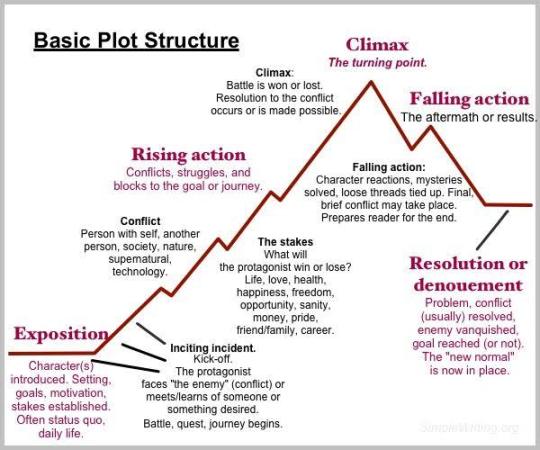
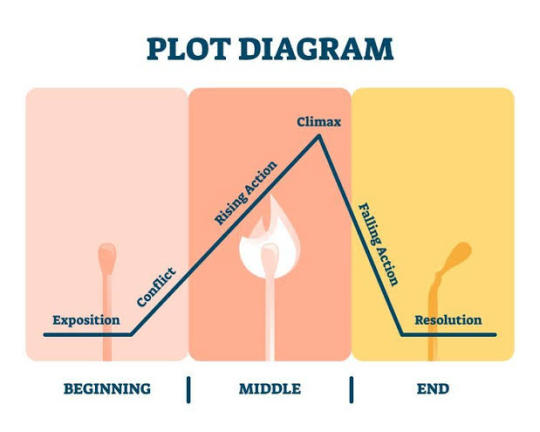
Almost all stories have a conflict and climax, yes even those you think are boring and slow. I'll start by mapping out the conflict of the entire story first. What are my protagonists struggles? Who are they struggling against? Once I have that figured out, I'll think of the resolution. What happens in the end? Is it happy? Sad? Bittersweet? Will they succeed in overcoming this conflict? Partially? Not at all? Talking about overcoming the conflict, what happend at the height of the story? Is it a big action scene? An epiphany? An argument between characters? Once we have that settled, what can lead up to that climax? Now this is the fun part. Remember that folder with all the possible daydreams? Let's lay them out there and put a question mark on them. You can narrow them down as you start thinking about what makes sense in context of your climax and what doesn't. Finally, the beginning of your story (and the inciting incident). How does it start? What makes sense in this context? In the middle of the story? At the very beginning? What triggers the conflict? What will you be exploring? What will keep the audience on their toes?
Once I have that figured out, I'll start to individually brainstorming possible chapter scenarios. I'll plan out a plot structure for the chapters, etc etc. Rinse and repeat.
Tadaaaa ~ before you know it you have the first draft of a book! Now you can narrow it down even more, and pick on what does or doesn't fit! Enjoy!
120 notes
·
View notes
Text
Trailer Analysis of Asterix & Obelix The Big Fight (Part 3) : Theorical Plot
Part 1
Part 2
One month from now, we’ll finally be able to watch Asterix & Obelix : The Big Fight!
In the previous posts, we have seen what will be present in the Big Fight: some elements will be familiar, while other will be original to the show.
Now that we have all these cards in hand, what can we expect from the actual series? There will be five episodes of 30 min : what story can be told in 2h30 ?
This is the part where I speculate about the possible plot: I might be wrong, and I hope the show will still be able to surprise me in good ways. I'm curious to hear your own theories, but first, let's dig into mine!
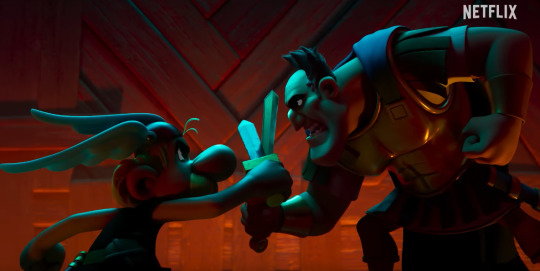
Set Up : The Year is 50 BC…
(RIP Pierre Tchernia et ta voix inoubliable de narrateur des films Astérix)
I think it's safe to assume the first episode will serve to introduce the main characters, the initial situation and the general mood of the show.
Of course, we’ll get to meet once again with our dear old Gauls and show them in their natural environment: living, laughing, beating up Romans for fun.
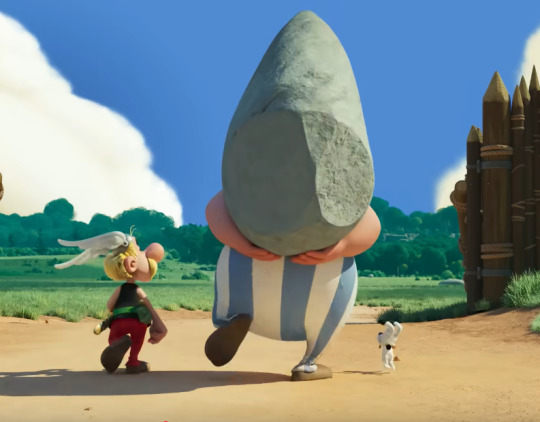
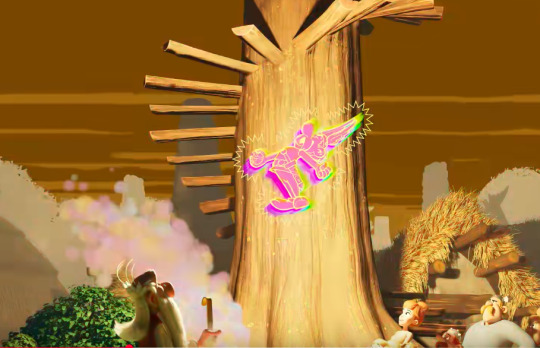

We’ll probably be introduced to the depressed Roman centurion we see here and there in the trailers, serving as the poor hapless victim of the Gauls’ shenanigans, and demonstrating the might of the magic potion in a big fun battle.

In the meantime (or even before that), we’ll certainly be introduced to Metadata and her boss, working on finding the best idea for the triumph of Caesar. Metadata learns (and serves as the exposition fairy) the situation of: Gaul is entirely occupied by the Romans. Well, not entirely…etc etc you know the pitch.
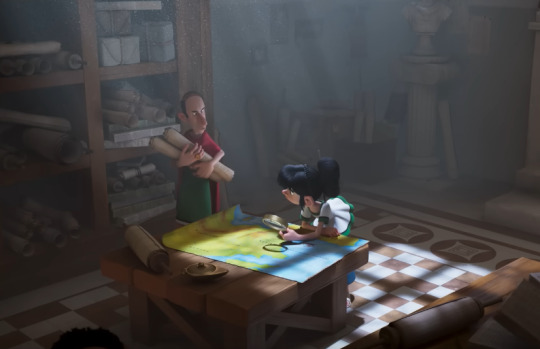
I wouldn’t be surprised if the Metadata scene has someone talk about how monstrous and barbarous the Indomitable Gauls are, and then the scene cutting to the village being very silly. Like the fish scene
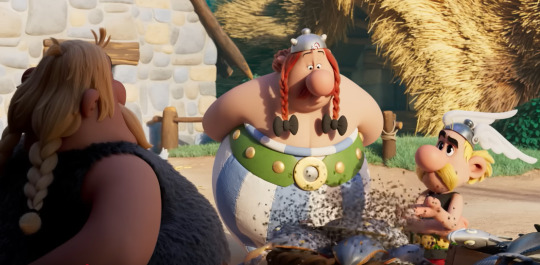
All of this could take place in the first episode ; but it’s also probable this could be spread out on two episodes, especially with the upcoming situation...
Inciting Incident : Menhir Ahoy!
It's no surprise to anyone who knows the story, the plot gets kicked off by two events influencing each other : first, the Romans want to have Ceramix challenge Vitalstatistix to a duel and need to put all their chances on their sides, thus capturing Getafix and remove the magic potion. Secondly, because of that plan, Getafix gets attacked by Romans in the forest and Obelix throws his menhir at him, causing Getafix to lose his mind, thus putting the entire village in a very grave situation.
But I am also convinced we’ll have a third plot-kicker: Vitalstatistix’s birthday.
There’s a couple of moments in the trailers where the Gauls are feasting, and we can see some gift-looking objects there. And in The Chieftain’s Shield, it’s after a particularly festive banquet that Vitalstatistix gets his liver issues. Who knows, maybe it’ll be thematically connected to him getting back in shape to defeat Ceramix?
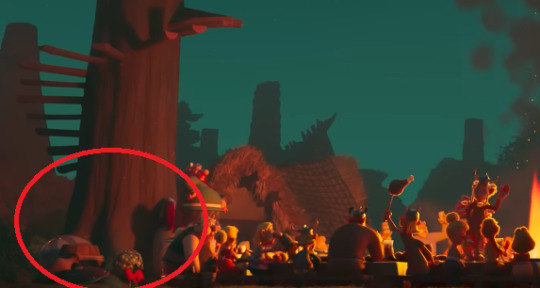
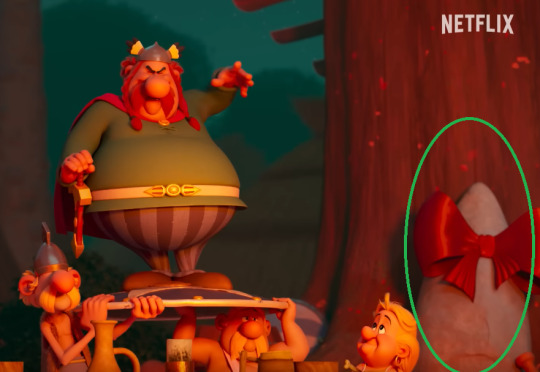
So I think the Inciting Incident will combine these three elements:
Metadata tells Caesar about the Big Fight because the mosaic idea didn’t please him and Potus was getting aggressive about it. Caesar is enthralled by the idea and tasks Potus AND Metadata with this plan.
Meanwhile, in the village, the Gauls just finished celebrating Vitalstatistix’ birthday, but it caused him health issues; Getafix orders him to go on a trip for a cure, and while Vitalstatistix and Impedementa pack up, Getafix goes into the forest for some ingredients. Maybe Asterix and Obelix follow a bit later because he forgot something, or maybe they go hunting at the same time.
Either on Caesar’s orders or by sheer coincidence, the Romans near the village are on a mission to capture the druid; I think the events play pretty much identically to the comic, with the Romans disguising themselves as trees and shrubs, ambushing the druid, Asterix and Obelix running to the rescue, Obelix shooting the menhir, Getafix getting knocked out, Asterix and Obelix bringing him back to the village and nursing him until he wakes up… and everyone learns he’s now cray-cray.
Plot Point : Ceramix's Recruitment
After the plot gets kicked off, I think we'll be introduced to Ceramix by episode 2 or 3, not further.
Potus and Metadata visit him and we get to learn about his personality and political opinion : he's very strong, a brute who forces his villagers to follow Roman customs or get beaten, and prompt to show his loyalty and obedience to the Noble Conquerors.
I fully expect the gag of Ceramix boasting about beating any Gaul chief to be slightly expanded in a sequence where he rips off his tunic and breaks things around...before freaking out as he learns WHO is his opponent. But obviously he'll be convinced : either Getafix has already lost his mind, either Potus promises Ceramix the magic potion won't be an issue.
@scribeprotra raised a very interesting point in one of my previous posts : while Caesar savors the idea of the Gauls becoming Romans, Metadata insists on the term "Gallo-Roman". Now, this could be a throwaway gag, or it could be that she sincerely thinks, at least at first, that Gauls assimilated to Rome have a good way of life, that Gallo-Roman culture is the future and so, she doesn't see a reason for the Gauls to keep resisting. If that's the case, the visit to Ceramix' village could be a cold reality check to what Gallo-Romans actually live like, when they're forced to cast away their culture and embrace the Roman culture...
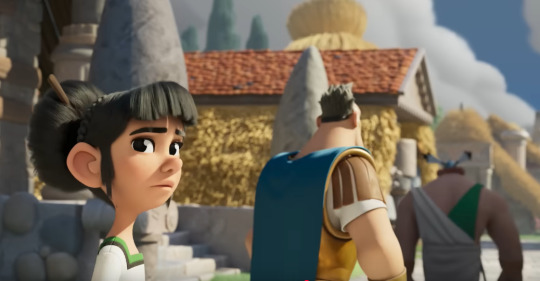
Of course, I might be reading too much into this. But an important theme of the original comic (and the Asterix franchise as a whole), despite its light tone, is the danger imperialism poses to one's culture, whether by cultural assimilation or enforced erasure.
But whether she wants it or not, the plan marches forward, the challenge is issued officially and the village has to face the music...
Plot Point : The Arena and the Council
Now unsurprisingly, I think the arena will be central to the second and third act of the show.

Caesar and his lackeys will spare no expense for the spectacle of the Gaul's defeat. It's meant to be a big mediatic buzz, topped with Antiquity-equivalent of news shows. Probably also why we get a glimpse of Cleopatra. And of course, the big traveling fair mentioned in the previous parts of this analysis.
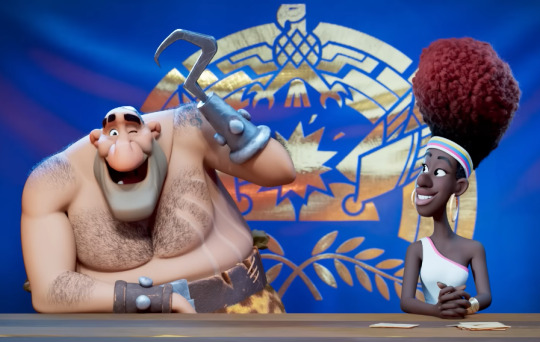
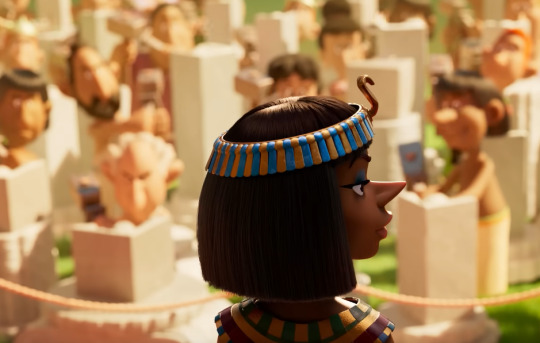
But before the actual fight takes place (and we know it's soon before the fight, since a legionary comes to fetch the Gaul chief for the Big Fight), the village gathers under a willow in a village council.
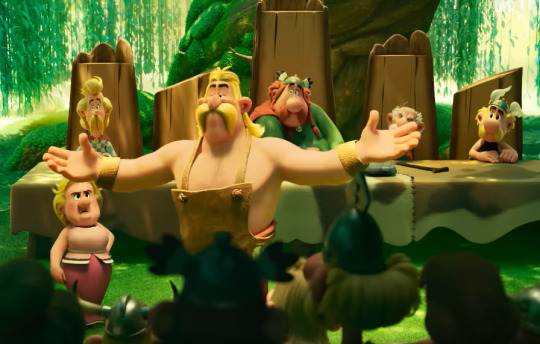
What is the point of this council ? I see two possibilities of subjects, and they might be connected :
the madness of the druid, and its consequences on the village
the Big Fight, and whether Vitalstatistix is up to the taks. I'm leaning toward this option because it might look like Fulliautomatix is talking himself up. Maybe trying to sway the council into making him fight instead of Vitalstatistix who is too out of shape for the challenge?
Whatever it is, it seems that by the end, the Gauls gather around their chief : to give him their support, maybe?
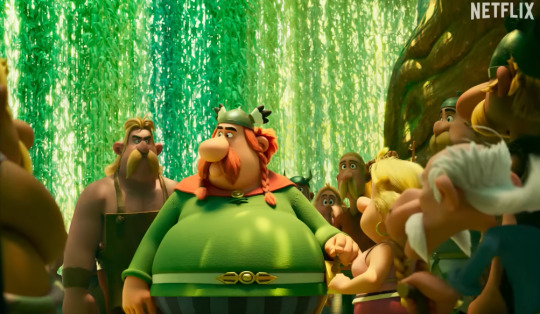
In any case, once Vitalstatistix steps into the ring, it will be time for the...
Climax : What The Heck Is Going On ??
For obvious reasons, not much is revealed in the trailers about the third act/climax of the show. But one thing is (90%) sure : the victory won't be as easy as in the comic.
In the comic (and in the climax of the animated Big Fight), thanks to a deus ex machina Getafix drinking one of his own potions, he miraculously recovers just in time to prepare enough magic potion for everyone (since Asterix & co except, and rightfully so, for the Romans to play foul even if Vitalstatistix wins). Hearing about Getafix' recovery, Vitalstatistix, who up until that point had been wearing Ceramix down by running in circles, gets a second wind and knocks Ceramix down with one punch.
In the trailers of the show, there's a detail I noticed and that is...we don't see any details of the fight. And especially not Vitalstatistix. Not even a half-second shot of a punch that would makes us wonder about the fight. So we have no idea of how it will actually play out. Will Vitalstatistix play the long game like in the comic and focus on wearing Ceramix down? Will he try to fight upfront and be confronted to the difficulty of no magic potion to help him out?
We just don't know. But what do we know?
The fight takes place at night, with highlits of red and dark, giving a more intense atmosphere to the situation.
There's seemingly an attack on the village (and of course it's Asterix's hut that takes the brunt of it). Okay, to be fair, the attack seems to takes place at dusk rather than night....
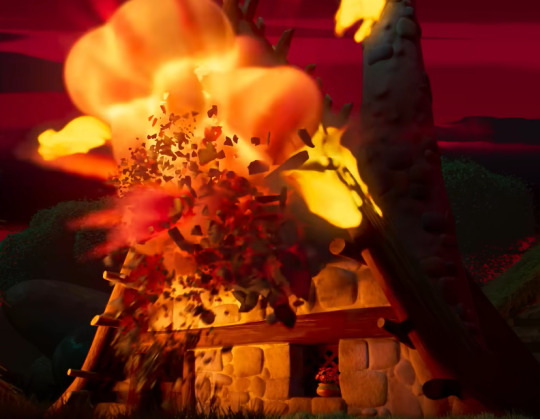
Dogmatix is with Mrs Geriatrix and Impedimenta. Which means that neither Obelix, neither Astérix (who's usually Dogmatix's minder if Obelix isn't available) are present. In the comic, Obelix is staying at the village out of guilt during the fight, but he still had Dogmatix with him. What motivated him to leave his beloved pup with other people?
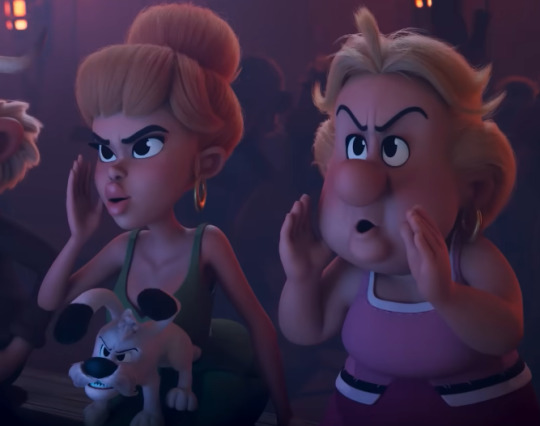
There's a movement of troops. I would bet on the same attempt at backstabbing as in the comic
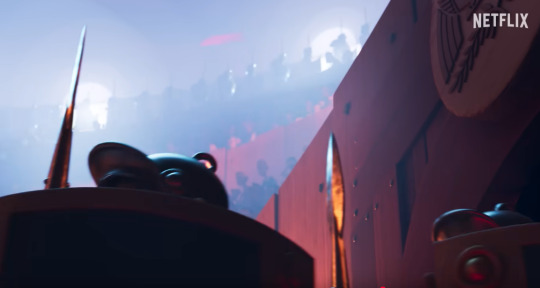
Okay, that one is a big shock : Obelix gets punched out and sent flying several meters away??! Who is strong enough to inflict that on Obelix of all people ?? We can distinguish a crowd in front of the village, with certainly the puncher being in it. Someone might have had access to magic potion, but then who? Another hint is the burning village around Obelix ; definitely connectiong this moment to the hut being destroyed.
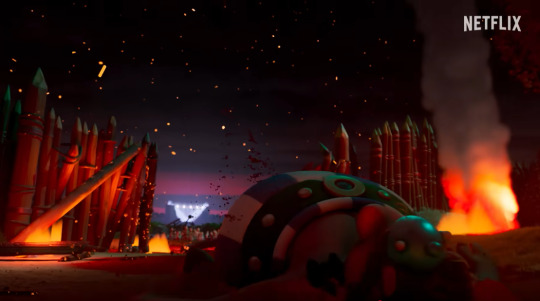
Asterix walks throught the arena crow and looks pretty worried. Could be explained rather easily by Vitalstatstix getting his ass beat in the first part of the fight, and Asterix knowing he can't do anything about it. Ooooor it could be a detail he learned/noticed that could drastically change the outcome for the worst. And speaking of Asterix...
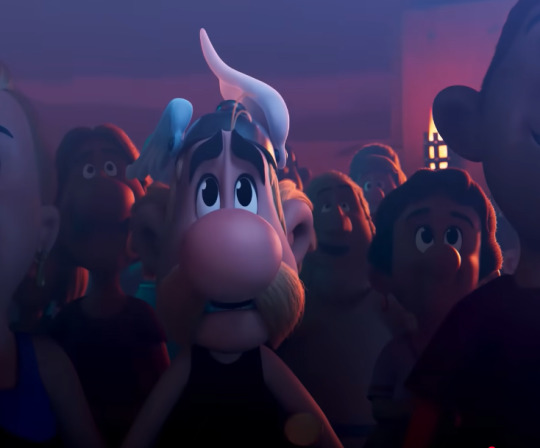
"Ista, you reused the same screenshot twice in a post!" First of all that's not from the same trailer, second of all this is my absolute fave shot of the whole promotion and I do what I want. It's not secret to anyone knowing me that I LOVE situations in which Asterix has to actually use his warrior skills, and here it seems like it's a Serious situation : dramatic lighting, very serious expressions, an aggressive antagonist, and I'm DYING to see the context of that scene. Did Asterix learn something and Potus is trying to stop him? Did Caesar finally order the capture of the Gauls and this is the last stand? Alain Chabat, I can forgive you a lot of liberties with Asterix because you make good jokes but if this scene ends up being a cheap gag, I will never forgive you.
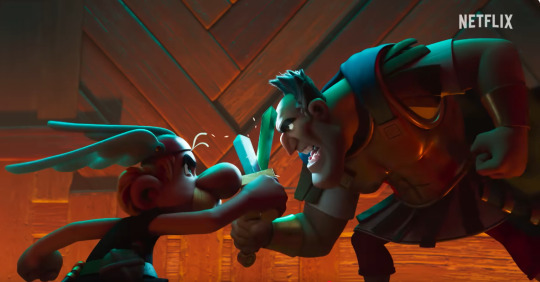
And that's the last part of my trailer analysis for the Big Fight! If you have any more details to add, feel free to reply or rant in your tags!
As for me, these trailers did a perfect job of titillating my interest and making me impatient for the show! Can't wait to watch it!
#asterix#asterix and obelix#asterix & obelix the big fight#the big fight neflix#astérix et obélix#astérix & obélix le combat des chefs#trailer analysis#Ista writes
28 notes
·
View notes